Impact of Brexit on Staff Retention within NHS: A Study on UK Healthcare Industry
VerifiedAdded on 2023/06/12
|53
|17169
|248
AI Summary
This research analyses the impact of Brexit on staff recruitment, staff satisfaction, job retention and staff motivation in the healthcare industry. The study uses qualitative and quantitative methods to gather data and provides recommendations to reduce the impact of Brexit.
Contribute Materials
Your contribution can guide someone’s learning journey. Share your
documents today.
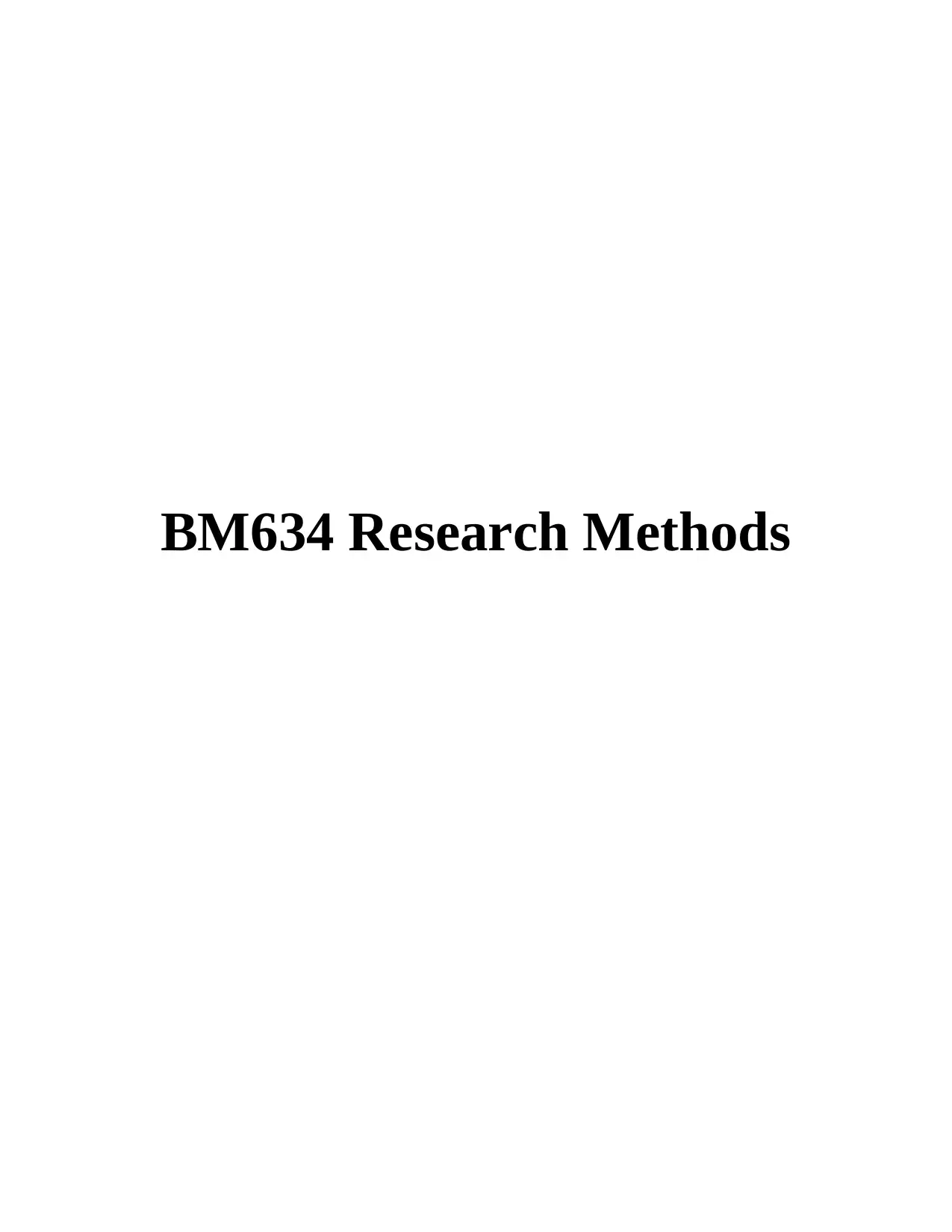
BM634 Research Methods
Secure Best Marks with AI Grader
Need help grading? Try our AI Grader for instant feedback on your assignments.
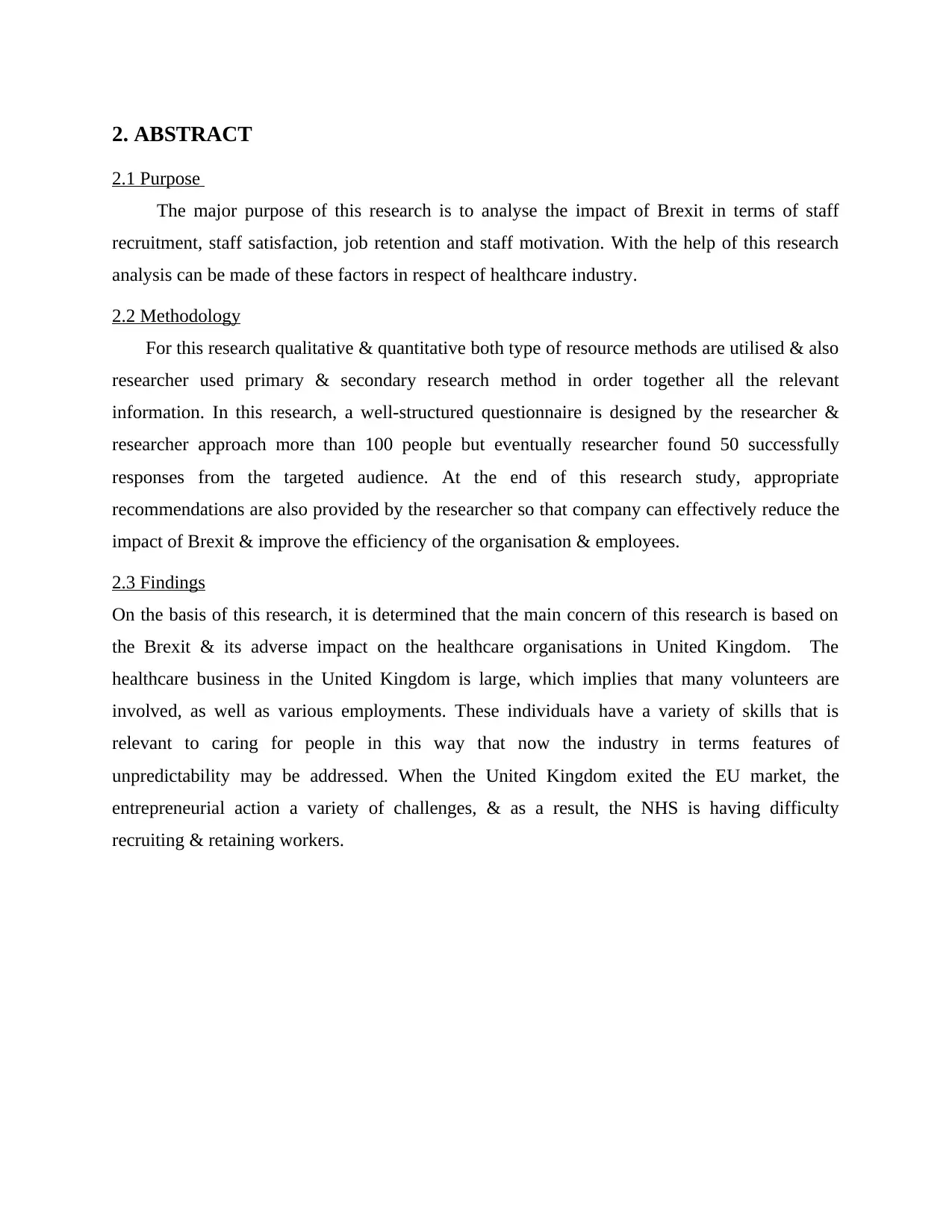
2. ABSTRACT
2.1 Purpose
The major purpose of this research is to analyse the impact of Brexit in terms of staff
recruitment, staff satisfaction, job retention and staff motivation. With the help of this research
analysis can be made of these factors in respect of healthcare industry.
2.2 Methodology
For this research qualitative & quantitative both type of resource methods are utilised & also
researcher used primary & secondary research method in order together all the relevant
information. In this research, a well-structured questionnaire is designed by the researcher &
researcher approach more than 100 people but eventually researcher found 50 successfully
responses from the targeted audience. At the end of this research study, appropriate
recommendations are also provided by the researcher so that company can effectively reduce the
impact of Brexit & improve the efficiency of the organisation & employees.
2.3 Findings
On the basis of this research, it is determined that the main concern of this research is based on
the Brexit & its adverse impact on the healthcare organisations in United Kingdom. The
healthcare business in the United Kingdom is large, which implies that many volunteers are
involved, as well as various employments. These individuals have a variety of skills that is
relevant to caring for people in this way that now the industry in terms features of
unpredictability may be addressed. When the United Kingdom exited the EU market, the
entrepreneurial action a variety of challenges, & as a result, the NHS is having difficulty
recruiting & retaining workers.
2.1 Purpose
The major purpose of this research is to analyse the impact of Brexit in terms of staff
recruitment, staff satisfaction, job retention and staff motivation. With the help of this research
analysis can be made of these factors in respect of healthcare industry.
2.2 Methodology
For this research qualitative & quantitative both type of resource methods are utilised & also
researcher used primary & secondary research method in order together all the relevant
information. In this research, a well-structured questionnaire is designed by the researcher &
researcher approach more than 100 people but eventually researcher found 50 successfully
responses from the targeted audience. At the end of this research study, appropriate
recommendations are also provided by the researcher so that company can effectively reduce the
impact of Brexit & improve the efficiency of the organisation & employees.
2.3 Findings
On the basis of this research, it is determined that the main concern of this research is based on
the Brexit & its adverse impact on the healthcare organisations in United Kingdom. The
healthcare business in the United Kingdom is large, which implies that many volunteers are
involved, as well as various employments. These individuals have a variety of skills that is
relevant to caring for people in this way that now the industry in terms features of
unpredictability may be addressed. When the United Kingdom exited the EU market, the
entrepreneurial action a variety of challenges, & as a result, the NHS is having difficulty
recruiting & retaining workers.
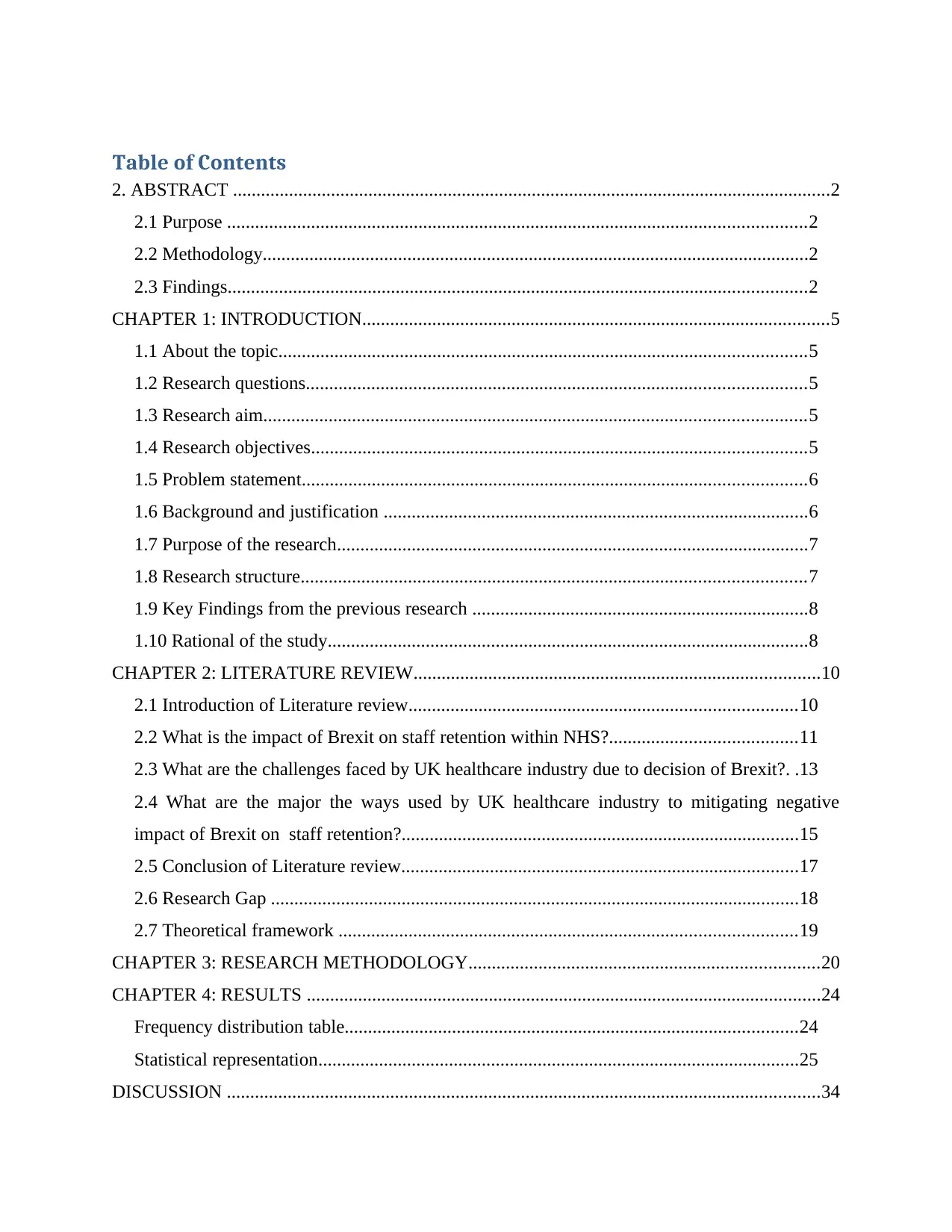
Table of Contents
2. ABSTRACT ................................................................................................................................2
2.1 Purpose ............................................................................................................................2
2.2 Methodology.....................................................................................................................2
2.3 Findings............................................................................................................................2
CHAPTER 1: INTRODUCTION....................................................................................................5
1.1 About the topic.................................................................................................................5
1.2 Research questions...........................................................................................................5
1.3 Research aim....................................................................................................................5
1.4 Research objectives..........................................................................................................5
1.5 Problem statement............................................................................................................6
1.6 Background and justification ...........................................................................................6
1.7 Purpose of the research.....................................................................................................7
1.8 Research structure............................................................................................................7
1.9 Key Findings from the previous research ........................................................................8
1.10 Rational of the study.......................................................................................................8
CHAPTER 2: LITERATURE REVIEW.......................................................................................10
2.1 Introduction of Literature review...................................................................................10
2.2 What is the impact of Brexit on staff retention within NHS?........................................11
2.3 What are the challenges faced by UK healthcare industry due to decision of Brexit?. .13
2.4 What are the major the ways used by UK healthcare industry to mitigating negative
impact of Brexit on staff retention?.....................................................................................15
2.5 Conclusion of Literature review.....................................................................................17
2.6 Research Gap .................................................................................................................18
2.7 Theoretical framework ..................................................................................................19
CHAPTER 3: RESEARCH METHODOLOGY...........................................................................20
CHAPTER 4: RESULTS ..............................................................................................................24
Frequency distribution table.................................................................................................24
Statistical representation.......................................................................................................25
DISCUSSION ...............................................................................................................................34
2. ABSTRACT ................................................................................................................................2
2.1 Purpose ............................................................................................................................2
2.2 Methodology.....................................................................................................................2
2.3 Findings............................................................................................................................2
CHAPTER 1: INTRODUCTION....................................................................................................5
1.1 About the topic.................................................................................................................5
1.2 Research questions...........................................................................................................5
1.3 Research aim....................................................................................................................5
1.4 Research objectives..........................................................................................................5
1.5 Problem statement............................................................................................................6
1.6 Background and justification ...........................................................................................6
1.7 Purpose of the research.....................................................................................................7
1.8 Research structure............................................................................................................7
1.9 Key Findings from the previous research ........................................................................8
1.10 Rational of the study.......................................................................................................8
CHAPTER 2: LITERATURE REVIEW.......................................................................................10
2.1 Introduction of Literature review...................................................................................10
2.2 What is the impact of Brexit on staff retention within NHS?........................................11
2.3 What are the challenges faced by UK healthcare industry due to decision of Brexit?. .13
2.4 What are the major the ways used by UK healthcare industry to mitigating negative
impact of Brexit on staff retention?.....................................................................................15
2.5 Conclusion of Literature review.....................................................................................17
2.6 Research Gap .................................................................................................................18
2.7 Theoretical framework ..................................................................................................19
CHAPTER 3: RESEARCH METHODOLOGY...........................................................................20
CHAPTER 4: RESULTS ..............................................................................................................24
Frequency distribution table.................................................................................................24
Statistical representation.......................................................................................................25
DISCUSSION ...............................................................................................................................34
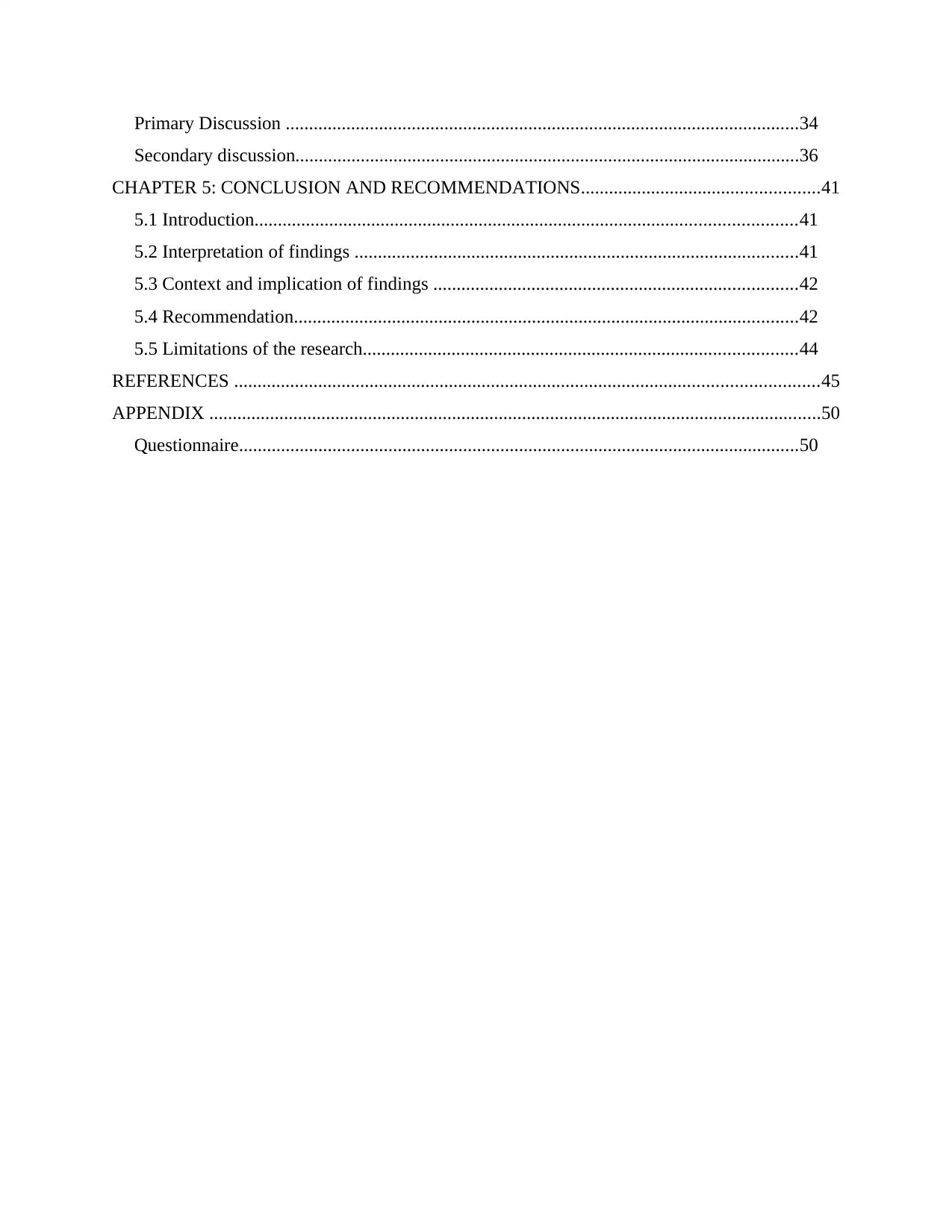
Primary Discussion ..............................................................................................................34
Secondary discussion............................................................................................................36
CHAPTER 5: CONCLUSION AND RECOMMENDATIONS...................................................41
5.1 Introduction....................................................................................................................41
5.2 Interpretation of findings ...............................................................................................41
5.3 Context and implication of findings ..............................................................................42
5.4 Recommendation............................................................................................................42
5.5 Limitations of the research.............................................................................................44
REFERENCES .............................................................................................................................45
APPENDIX ...................................................................................................................................50
Questionnaire........................................................................................................................50
Secondary discussion............................................................................................................36
CHAPTER 5: CONCLUSION AND RECOMMENDATIONS...................................................41
5.1 Introduction....................................................................................................................41
5.2 Interpretation of findings ...............................................................................................41
5.3 Context and implication of findings ..............................................................................42
5.4 Recommendation............................................................................................................42
5.5 Limitations of the research.............................................................................................44
REFERENCES .............................................................................................................................45
APPENDIX ...................................................................................................................................50
Questionnaire........................................................................................................................50
Secure Best Marks with AI Grader
Need help grading? Try our AI Grader for instant feedback on your assignments.
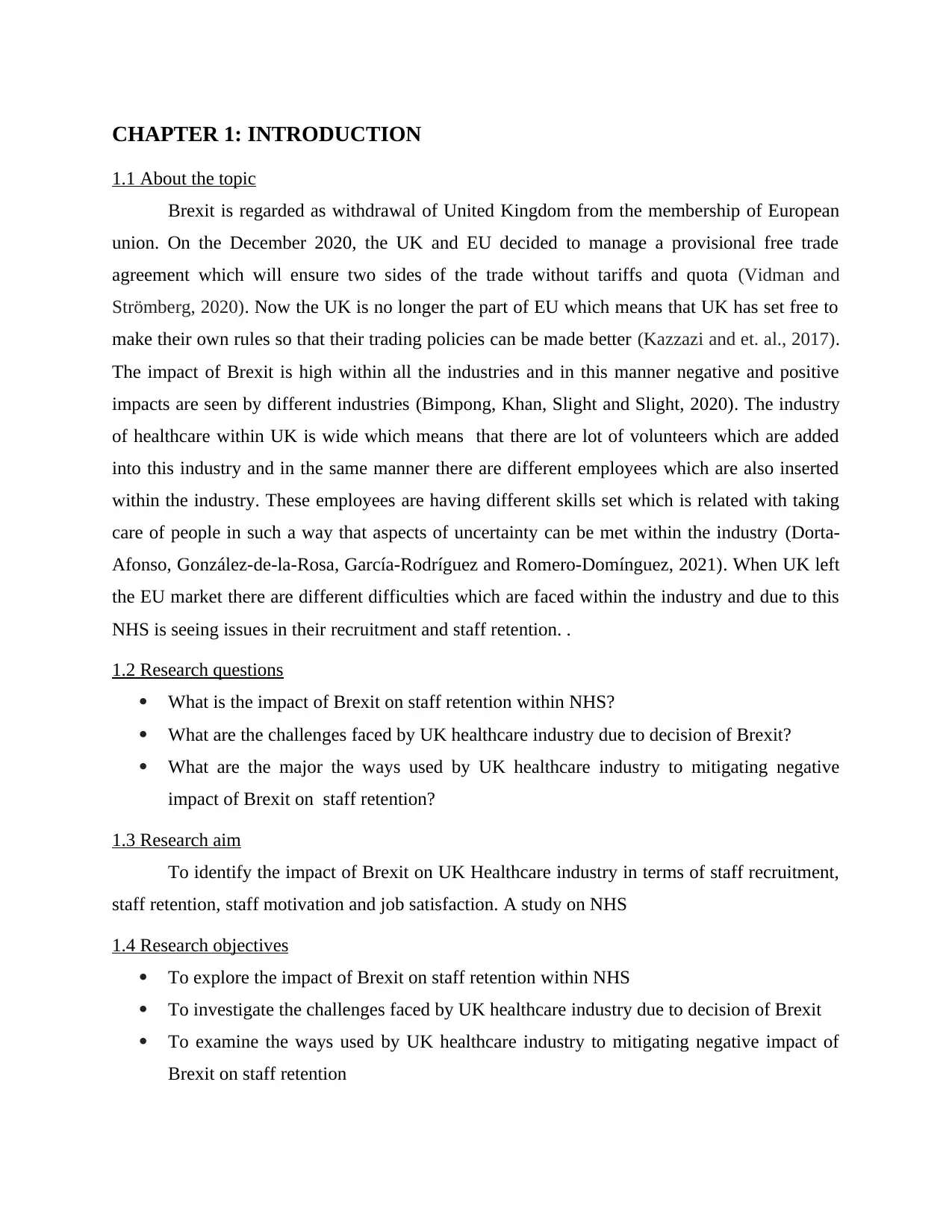
CHAPTER 1: INTRODUCTION
1.1 About the topic
Brexit is regarded as withdrawal of United Kingdom from the membership of European
union. On the December 2020, the UK and EU decided to manage a provisional free trade
agreement which will ensure two sides of the trade without tariffs and quota (Vidman and
Strömberg, 2020). Now the UK is no longer the part of EU which means that UK has set free to
make their own rules so that their trading policies can be made better (Kazzazi and et. al., 2017).
The impact of Brexit is high within all the industries and in this manner negative and positive
impacts are seen by different industries (Bimpong, Khan, Slight and Slight, 2020). The industry
of healthcare within UK is wide which means that there are lot of volunteers which are added
into this industry and in the same manner there are different employees which are also inserted
within the industry. These employees are having different skills set which is related with taking
care of people in such a way that aspects of uncertainty can be met within the industry (Dorta-
Afonso, González-de-la-Rosa, García-Rodríguez and Romero-Domínguez, 2021). When UK left
the EU market there are different difficulties which are faced within the industry and due to this
NHS is seeing issues in their recruitment and staff retention. .
1.2 Research questions
What is the impact of Brexit on staff retention within NHS?
What are the challenges faced by UK healthcare industry due to decision of Brexit?
What are the major the ways used by UK healthcare industry to mitigating negative
impact of Brexit on staff retention?
1.3 Research aim
To identify the impact of Brexit on UK Healthcare industry in terms of staff recruitment,
staff retention, staff motivation and job satisfaction. A study on NHS
1.4 Research objectives
To explore the impact of Brexit on staff retention within NHS
To investigate the challenges faced by UK healthcare industry due to decision of Brexit
To examine the ways used by UK healthcare industry to mitigating negative impact of
Brexit on staff retention
1.1 About the topic
Brexit is regarded as withdrawal of United Kingdom from the membership of European
union. On the December 2020, the UK and EU decided to manage a provisional free trade
agreement which will ensure two sides of the trade without tariffs and quota (Vidman and
Strömberg, 2020). Now the UK is no longer the part of EU which means that UK has set free to
make their own rules so that their trading policies can be made better (Kazzazi and et. al., 2017).
The impact of Brexit is high within all the industries and in this manner negative and positive
impacts are seen by different industries (Bimpong, Khan, Slight and Slight, 2020). The industry
of healthcare within UK is wide which means that there are lot of volunteers which are added
into this industry and in the same manner there are different employees which are also inserted
within the industry. These employees are having different skills set which is related with taking
care of people in such a way that aspects of uncertainty can be met within the industry (Dorta-
Afonso, González-de-la-Rosa, García-Rodríguez and Romero-Domínguez, 2021). When UK left
the EU market there are different difficulties which are faced within the industry and due to this
NHS is seeing issues in their recruitment and staff retention. .
1.2 Research questions
What is the impact of Brexit on staff retention within NHS?
What are the challenges faced by UK healthcare industry due to decision of Brexit?
What are the major the ways used by UK healthcare industry to mitigating negative
impact of Brexit on staff retention?
1.3 Research aim
To identify the impact of Brexit on UK Healthcare industry in terms of staff recruitment,
staff retention, staff motivation and job satisfaction. A study on NHS
1.4 Research objectives
To explore the impact of Brexit on staff retention within NHS
To investigate the challenges faced by UK healthcare industry due to decision of Brexit
To examine the ways used by UK healthcare industry to mitigating negative impact of
Brexit on staff retention
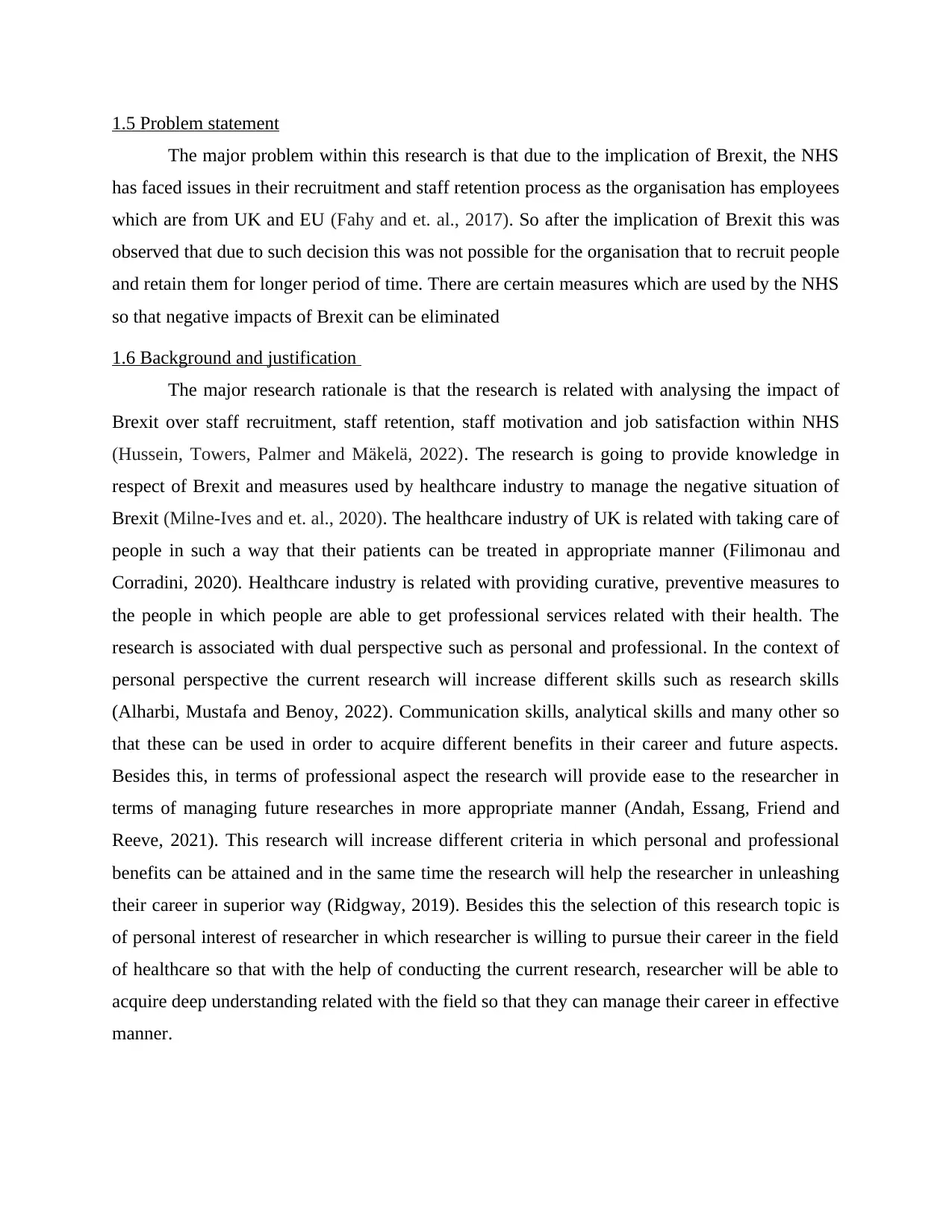
1.5 Problem statement
The major problem within this research is that due to the implication of Brexit, the NHS
has faced issues in their recruitment and staff retention process as the organisation has employees
which are from UK and EU (Fahy and et. al., 2017). So after the implication of Brexit this was
observed that due to such decision this was not possible for the organisation that to recruit people
and retain them for longer period of time. There are certain measures which are used by the NHS
so that negative impacts of Brexit can be eliminated
1.6 Background and justification
The major research rationale is that the research is related with analysing the impact of
Brexit over staff recruitment, staff retention, staff motivation and job satisfaction within NHS
(Hussein, Towers, Palmer and Mäkelä, 2022). The research is going to provide knowledge in
respect of Brexit and measures used by healthcare industry to manage the negative situation of
Brexit (Milne-Ives and et. al., 2020). The healthcare industry of UK is related with taking care of
people in such a way that their patients can be treated in appropriate manner (Filimonau and
Corradini, 2020). Healthcare industry is related with providing curative, preventive measures to
the people in which people are able to get professional services related with their health. The
research is associated with dual perspective such as personal and professional. In the context of
personal perspective the current research will increase different skills such as research skills
(Alharbi, Mustafa and Benoy, 2022). Communication skills, analytical skills and many other so
that these can be used in order to acquire different benefits in their career and future aspects.
Besides this, in terms of professional aspect the research will provide ease to the researcher in
terms of managing future researches in more appropriate manner (Andah, Essang, Friend and
Reeve, 2021). This research will increase different criteria in which personal and professional
benefits can be attained and in the same time the research will help the researcher in unleashing
their career in superior way (Ridgway, 2019). Besides this the selection of this research topic is
of personal interest of researcher in which researcher is willing to pursue their career in the field
of healthcare so that with the help of conducting the current research, researcher will be able to
acquire deep understanding related with the field so that they can manage their career in effective
manner.
The major problem within this research is that due to the implication of Brexit, the NHS
has faced issues in their recruitment and staff retention process as the organisation has employees
which are from UK and EU (Fahy and et. al., 2017). So after the implication of Brexit this was
observed that due to such decision this was not possible for the organisation that to recruit people
and retain them for longer period of time. There are certain measures which are used by the NHS
so that negative impacts of Brexit can be eliminated
1.6 Background and justification
The major research rationale is that the research is related with analysing the impact of
Brexit over staff recruitment, staff retention, staff motivation and job satisfaction within NHS
(Hussein, Towers, Palmer and Mäkelä, 2022). The research is going to provide knowledge in
respect of Brexit and measures used by healthcare industry to manage the negative situation of
Brexit (Milne-Ives and et. al., 2020). The healthcare industry of UK is related with taking care of
people in such a way that their patients can be treated in appropriate manner (Filimonau and
Corradini, 2020). Healthcare industry is related with providing curative, preventive measures to
the people in which people are able to get professional services related with their health. The
research is associated with dual perspective such as personal and professional. In the context of
personal perspective the current research will increase different skills such as research skills
(Alharbi, Mustafa and Benoy, 2022). Communication skills, analytical skills and many other so
that these can be used in order to acquire different benefits in their career and future aspects.
Besides this, in terms of professional aspect the research will provide ease to the researcher in
terms of managing future researches in more appropriate manner (Andah, Essang, Friend and
Reeve, 2021). This research will increase different criteria in which personal and professional
benefits can be attained and in the same time the research will help the researcher in unleashing
their career in superior way (Ridgway, 2019). Besides this the selection of this research topic is
of personal interest of researcher in which researcher is willing to pursue their career in the field
of healthcare so that with the help of conducting the current research, researcher will be able to
acquire deep understanding related with the field so that they can manage their career in effective
manner.
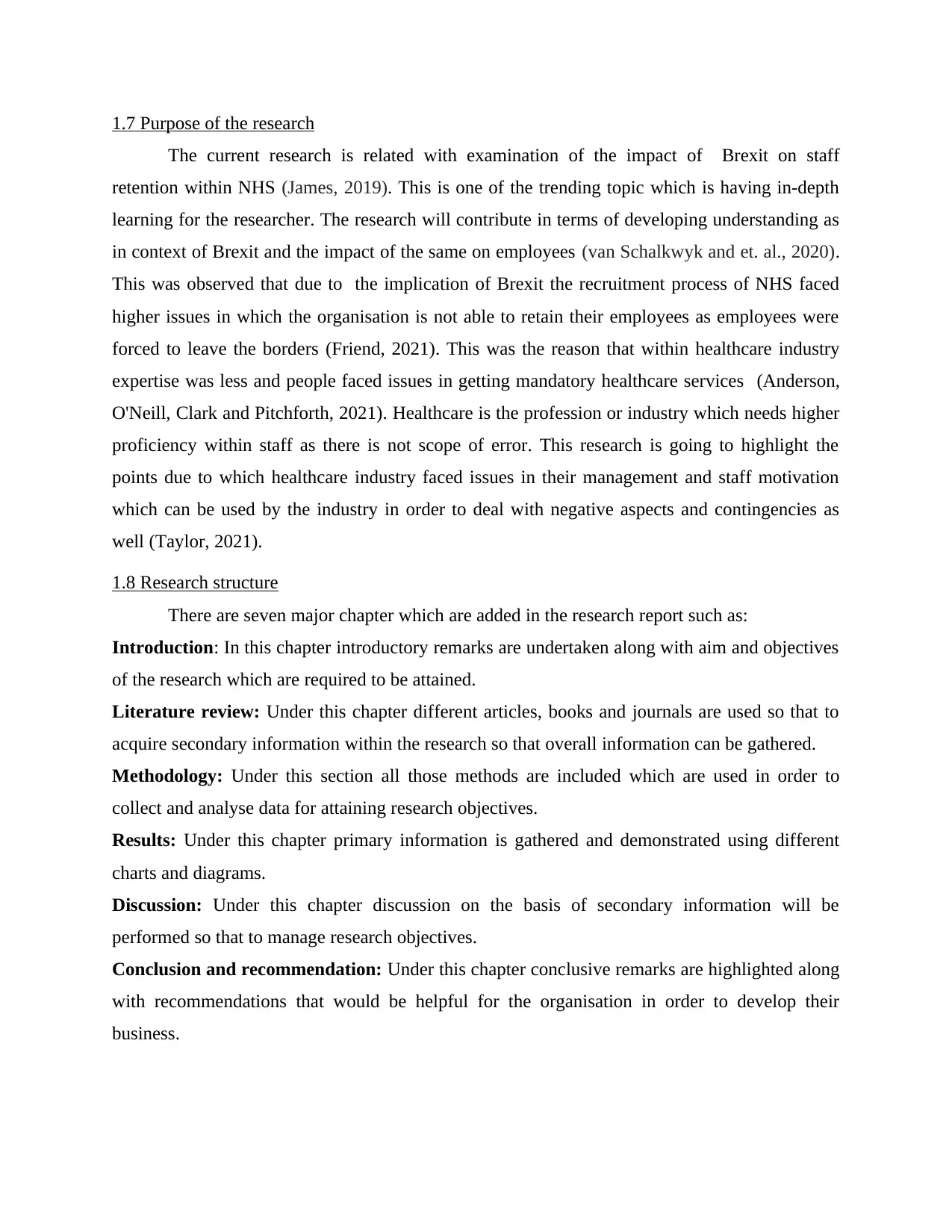
1.7 Purpose of the research
The current research is related with examination of the impact of Brexit on staff
retention within NHS (James, 2019). This is one of the trending topic which is having in-depth
learning for the researcher. The research will contribute in terms of developing understanding as
in context of Brexit and the impact of the same on employees (van Schalkwyk and et. al., 2020).
This was observed that due to the implication of Brexit the recruitment process of NHS faced
higher issues in which the organisation is not able to retain their employees as employees were
forced to leave the borders (Friend, 2021). This was the reason that within healthcare industry
expertise was less and people faced issues in getting mandatory healthcare services (Anderson,
O'Neill, Clark and Pitchforth, 2021). Healthcare is the profession or industry which needs higher
proficiency within staff as there is not scope of error. This research is going to highlight the
points due to which healthcare industry faced issues in their management and staff motivation
which can be used by the industry in order to deal with negative aspects and contingencies as
well (Taylor, 2021).
1.8 Research structure
There are seven major chapter which are added in the research report such as:
Introduction: In this chapter introductory remarks are undertaken along with aim and objectives
of the research which are required to be attained.
Literature review: Under this chapter different articles, books and journals are used so that to
acquire secondary information within the research so that overall information can be gathered.
Methodology: Under this section all those methods are included which are used in order to
collect and analyse data for attaining research objectives.
Results: Under this chapter primary information is gathered and demonstrated using different
charts and diagrams.
Discussion: Under this chapter discussion on the basis of secondary information will be
performed so that to manage research objectives.
Conclusion and recommendation: Under this chapter conclusive remarks are highlighted along
with recommendations that would be helpful for the organisation in order to develop their
business.
The current research is related with examination of the impact of Brexit on staff
retention within NHS (James, 2019). This is one of the trending topic which is having in-depth
learning for the researcher. The research will contribute in terms of developing understanding as
in context of Brexit and the impact of the same on employees (van Schalkwyk and et. al., 2020).
This was observed that due to the implication of Brexit the recruitment process of NHS faced
higher issues in which the organisation is not able to retain their employees as employees were
forced to leave the borders (Friend, 2021). This was the reason that within healthcare industry
expertise was less and people faced issues in getting mandatory healthcare services (Anderson,
O'Neill, Clark and Pitchforth, 2021). Healthcare is the profession or industry which needs higher
proficiency within staff as there is not scope of error. This research is going to highlight the
points due to which healthcare industry faced issues in their management and staff motivation
which can be used by the industry in order to deal with negative aspects and contingencies as
well (Taylor, 2021).
1.8 Research structure
There are seven major chapter which are added in the research report such as:
Introduction: In this chapter introductory remarks are undertaken along with aim and objectives
of the research which are required to be attained.
Literature review: Under this chapter different articles, books and journals are used so that to
acquire secondary information within the research so that overall information can be gathered.
Methodology: Under this section all those methods are included which are used in order to
collect and analyse data for attaining research objectives.
Results: Under this chapter primary information is gathered and demonstrated using different
charts and diagrams.
Discussion: Under this chapter discussion on the basis of secondary information will be
performed so that to manage research objectives.
Conclusion and recommendation: Under this chapter conclusive remarks are highlighted along
with recommendations that would be helpful for the organisation in order to develop their
business.
Paraphrase This Document
Need a fresh take? Get an instant paraphrase of this document with our AI Paraphraser
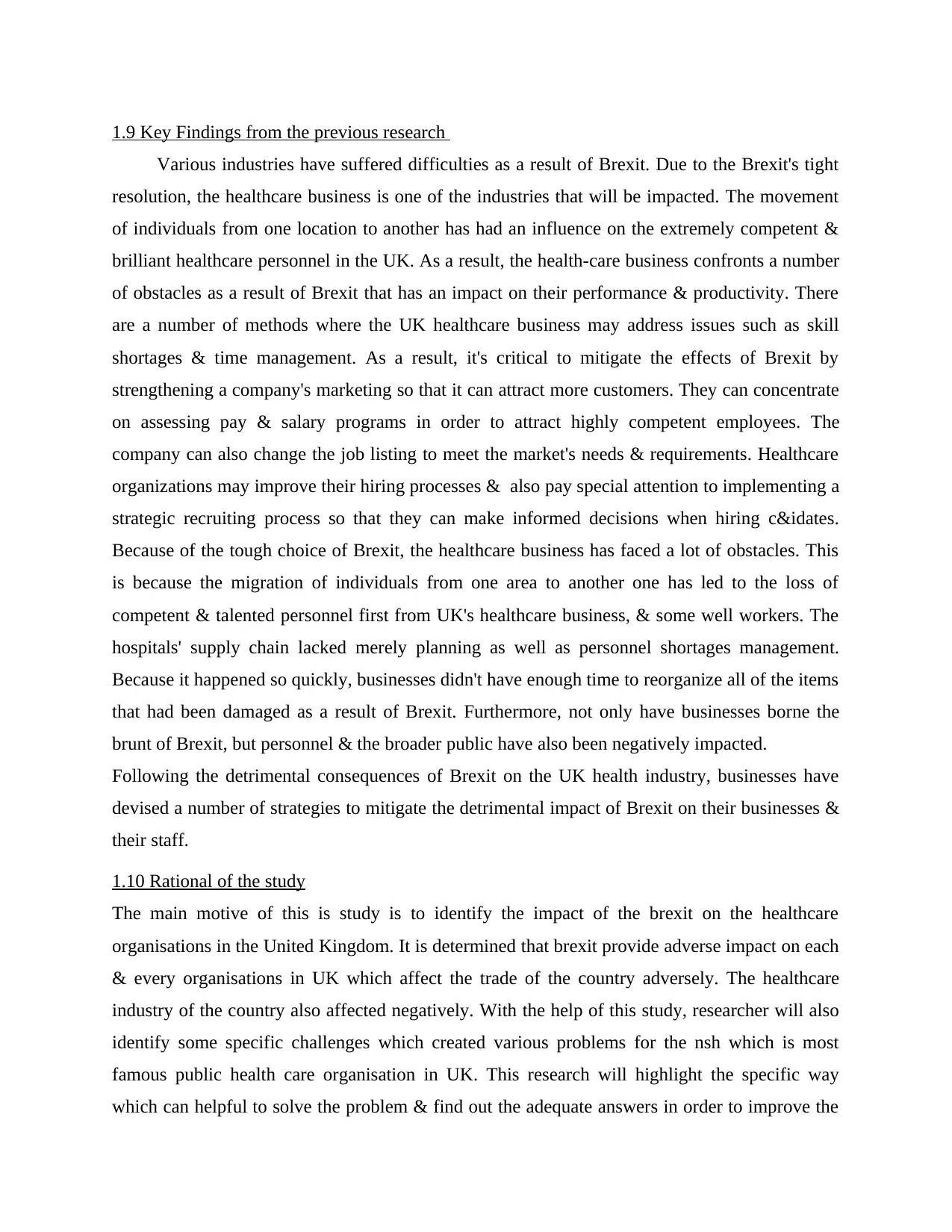
1.9 Key Findings from the previous research
Various industries have suffered difficulties as a result of Brexit. Due to the Brexit's tight
resolution, the healthcare business is one of the industries that will be impacted. The movement
of individuals from one location to another has had an influence on the extremely competent &
brilliant healthcare personnel in the UK. As a result, the health-care business confronts a number
of obstacles as a result of Brexit that has an impact on their performance & productivity. There
are a number of methods where the UK healthcare business may address issues such as skill
shortages & time management. As a result, it's critical to mitigate the effects of Brexit by
strengthening a company's marketing so that it can attract more customers. They can concentrate
on assessing pay & salary programs in order to attract highly competent employees. The
company can also change the job listing to meet the market's needs & requirements. Healthcare
organizations may improve their hiring processes & also pay special attention to implementing a
strategic recruiting process so that they can make informed decisions when hiring c&idates.
Because of the tough choice of Brexit, the healthcare business has faced a lot of obstacles. This
is because the migration of individuals from one area to another one has led to the loss of
competent & talented personnel first from UK's healthcare business, & some well workers. The
hospitals' supply chain lacked merely planning as well as personnel shortages management.
Because it happened so quickly, businesses didn't have enough time to reorganize all of the items
that had been damaged as a result of Brexit. Furthermore, not only have businesses borne the
brunt of Brexit, but personnel & the broader public have also been negatively impacted.
Following the detrimental consequences of Brexit on the UK health industry, businesses have
devised a number of strategies to mitigate the detrimental impact of Brexit on their businesses &
their staff.
1.10 Rational of the study
The main motive of this is study is to identify the impact of the brexit on the healthcare
organisations in the United Kingdom. It is determined that brexit provide adverse impact on each
& every organisations in UK which affect the trade of the country adversely. The healthcare
industry of the country also affected negatively. With the help of this study, researcher will also
identify some specific challenges which created various problems for the nsh which is most
famous public health care organisation in UK. This research will highlight the specific way
which can helpful to solve the problem & find out the adequate answers in order to improve the
Various industries have suffered difficulties as a result of Brexit. Due to the Brexit's tight
resolution, the healthcare business is one of the industries that will be impacted. The movement
of individuals from one location to another has had an influence on the extremely competent &
brilliant healthcare personnel in the UK. As a result, the health-care business confronts a number
of obstacles as a result of Brexit that has an impact on their performance & productivity. There
are a number of methods where the UK healthcare business may address issues such as skill
shortages & time management. As a result, it's critical to mitigate the effects of Brexit by
strengthening a company's marketing so that it can attract more customers. They can concentrate
on assessing pay & salary programs in order to attract highly competent employees. The
company can also change the job listing to meet the market's needs & requirements. Healthcare
organizations may improve their hiring processes & also pay special attention to implementing a
strategic recruiting process so that they can make informed decisions when hiring c&idates.
Because of the tough choice of Brexit, the healthcare business has faced a lot of obstacles. This
is because the migration of individuals from one area to another one has led to the loss of
competent & talented personnel first from UK's healthcare business, & some well workers. The
hospitals' supply chain lacked merely planning as well as personnel shortages management.
Because it happened so quickly, businesses didn't have enough time to reorganize all of the items
that had been damaged as a result of Brexit. Furthermore, not only have businesses borne the
brunt of Brexit, but personnel & the broader public have also been negatively impacted.
Following the detrimental consequences of Brexit on the UK health industry, businesses have
devised a number of strategies to mitigate the detrimental impact of Brexit on their businesses &
their staff.
1.10 Rational of the study
The main motive of this is study is to identify the impact of the brexit on the healthcare
organisations in the United Kingdom. It is determined that brexit provide adverse impact on each
& every organisations in UK which affect the trade of the country adversely. The healthcare
industry of the country also affected negatively. With the help of this study, researcher will also
identify some specific challenges which created various problems for the nsh which is most
famous public health care organisation in UK. This research will highlight the specific way
which can helpful to solve the problem & find out the adequate answers in order to improve the

employee motivation, employee satisfaction, & employee retention & recruitment process in the
organisation.
organisation.
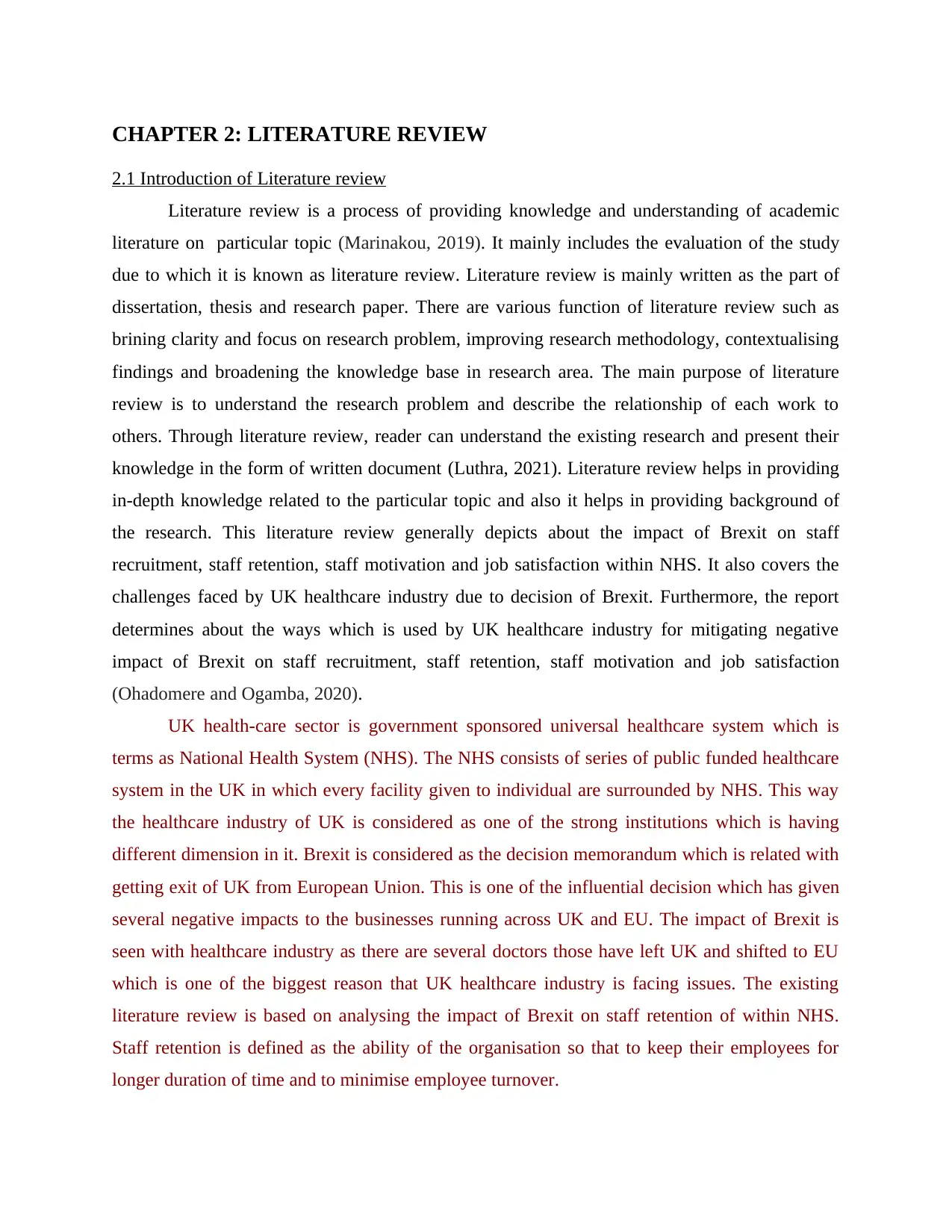
CHAPTER 2: LITERATURE REVIEW
2.1 Introduction of Literature review
Literature review is a process of providing knowledge and understanding of academic
literature on particular topic (Marinakou, 2019). It mainly includes the evaluation of the study
due to which it is known as literature review. Literature review is mainly written as the part of
dissertation, thesis and research paper. There are various function of literature review such as
brining clarity and focus on research problem, improving research methodology, contextualising
findings and broadening the knowledge base in research area. The main purpose of literature
review is to understand the research problem and describe the relationship of each work to
others. Through literature review, reader can understand the existing research and present their
knowledge in the form of written document (Luthra, 2021). Literature review helps in providing
in-depth knowledge related to the particular topic and also it helps in providing background of
the research. This literature review generally depicts about the impact of Brexit on staff
recruitment, staff retention, staff motivation and job satisfaction within NHS. It also covers the
challenges faced by UK healthcare industry due to decision of Brexit. Furthermore, the report
determines about the ways which is used by UK healthcare industry for mitigating negative
impact of Brexit on staff recruitment, staff retention, staff motivation and job satisfaction
(Ohadomere and Ogamba, 2020).
UK health-care sector is government sponsored universal healthcare system which is
terms as National Health System (NHS). The NHS consists of series of public funded healthcare
system in the UK in which every facility given to individual are surrounded by NHS. This way
the healthcare industry of UK is considered as one of the strong institutions which is having
different dimension in it. Brexit is considered as the decision memorandum which is related with
getting exit of UK from European Union. This is one of the influential decision which has given
several negative impacts to the businesses running across UK and EU. The impact of Brexit is
seen with healthcare industry as there are several doctors those have left UK and shifted to EU
which is one of the biggest reason that UK healthcare industry is facing issues. The existing
literature review is based on analysing the impact of Brexit on staff retention of within NHS.
Staff retention is defined as the ability of the organisation so that to keep their employees for
longer duration of time and to minimise employee turnover.
2.1 Introduction of Literature review
Literature review is a process of providing knowledge and understanding of academic
literature on particular topic (Marinakou, 2019). It mainly includes the evaluation of the study
due to which it is known as literature review. Literature review is mainly written as the part of
dissertation, thesis and research paper. There are various function of literature review such as
brining clarity and focus on research problem, improving research methodology, contextualising
findings and broadening the knowledge base in research area. The main purpose of literature
review is to understand the research problem and describe the relationship of each work to
others. Through literature review, reader can understand the existing research and present their
knowledge in the form of written document (Luthra, 2021). Literature review helps in providing
in-depth knowledge related to the particular topic and also it helps in providing background of
the research. This literature review generally depicts about the impact of Brexit on staff
recruitment, staff retention, staff motivation and job satisfaction within NHS. It also covers the
challenges faced by UK healthcare industry due to decision of Brexit. Furthermore, the report
determines about the ways which is used by UK healthcare industry for mitigating negative
impact of Brexit on staff recruitment, staff retention, staff motivation and job satisfaction
(Ohadomere and Ogamba, 2020).
UK health-care sector is government sponsored universal healthcare system which is
terms as National Health System (NHS). The NHS consists of series of public funded healthcare
system in the UK in which every facility given to individual are surrounded by NHS. This way
the healthcare industry of UK is considered as one of the strong institutions which is having
different dimension in it. Brexit is considered as the decision memorandum which is related with
getting exit of UK from European Union. This is one of the influential decision which has given
several negative impacts to the businesses running across UK and EU. The impact of Brexit is
seen with healthcare industry as there are several doctors those have left UK and shifted to EU
which is one of the biggest reason that UK healthcare industry is facing issues. The existing
literature review is based on analysing the impact of Brexit on staff retention of within NHS.
Staff retention is defined as the ability of the organisation so that to keep their employees for
longer duration of time and to minimise employee turnover.
Secure Best Marks with AI Grader
Need help grading? Try our AI Grader for instant feedback on your assignments.
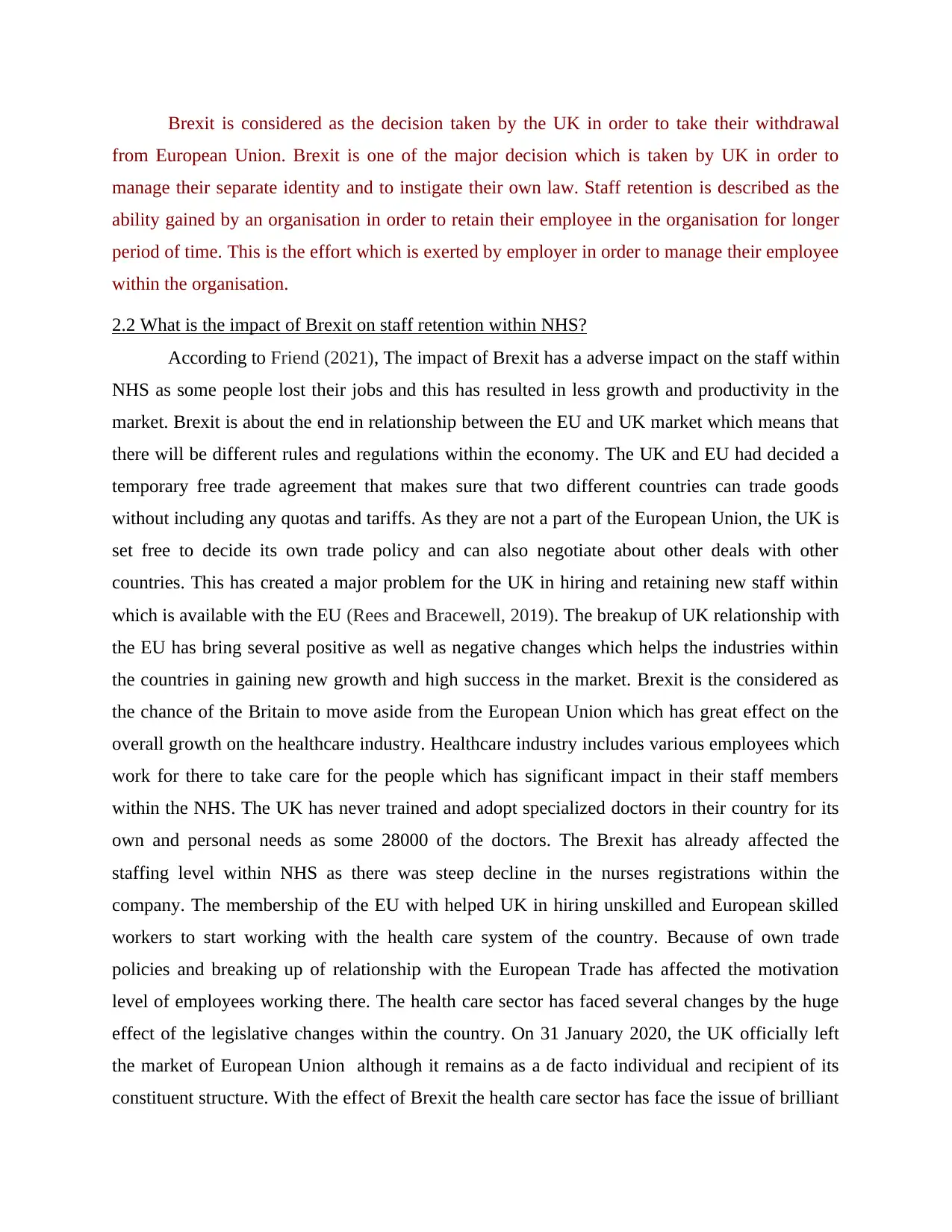
Brexit is considered as the decision taken by the UK in order to take their withdrawal
from European Union. Brexit is one of the major decision which is taken by UK in order to
manage their separate identity and to instigate their own law. Staff retention is described as the
ability gained by an organisation in order to retain their employee in the organisation for longer
period of time. This is the effort which is exerted by employer in order to manage their employee
within the organisation.
2.2 What is the impact of Brexit on staff retention within NHS?
According to Friend (2021), The impact of Brexit has a adverse impact on the staff within
NHS as some people lost their jobs and this has resulted in less growth and productivity in the
market. Brexit is about the end in relationship between the EU and UK market which means that
there will be different rules and regulations within the economy. The UK and EU had decided a
temporary free trade agreement that makes sure that two different countries can trade goods
without including any quotas and tariffs. As they are not a part of the European Union, the UK is
set free to decide its own trade policy and can also negotiate about other deals with other
countries. This has created a major problem for the UK in hiring and retaining new staff within
which is available with the EU (Rees and Bracewell, 2019). The breakup of UK relationship with
the EU has bring several positive as well as negative changes which helps the industries within
the countries in gaining new growth and high success in the market. Brexit is the considered as
the chance of the Britain to move aside from the European Union which has great effect on the
overall growth on the healthcare industry. Healthcare industry includes various employees which
work for there to take care for the people which has significant impact in their staff members
within the NHS. The UK has never trained and adopt specialized doctors in their country for its
own and personal needs as some 28000 of the doctors. The Brexit has already affected the
staffing level within NHS as there was steep decline in the nurses registrations within the
company. The membership of the EU with helped UK in hiring unskilled and European skilled
workers to start working with the health care system of the country. Because of own trade
policies and breaking up of relationship with the European Trade has affected the motivation
level of employees working there. The health care sector has faced several changes by the huge
effect of the legislative changes within the country. On 31 January 2020, the UK officially left
the market of European Union although it remains as a de facto individual and recipient of its
constituent structure. With the effect of Brexit the health care sector has face the issue of brilliant
from European Union. Brexit is one of the major decision which is taken by UK in order to
manage their separate identity and to instigate their own law. Staff retention is described as the
ability gained by an organisation in order to retain their employee in the organisation for longer
period of time. This is the effort which is exerted by employer in order to manage their employee
within the organisation.
2.2 What is the impact of Brexit on staff retention within NHS?
According to Friend (2021), The impact of Brexit has a adverse impact on the staff within
NHS as some people lost their jobs and this has resulted in less growth and productivity in the
market. Brexit is about the end in relationship between the EU and UK market which means that
there will be different rules and regulations within the economy. The UK and EU had decided a
temporary free trade agreement that makes sure that two different countries can trade goods
without including any quotas and tariffs. As they are not a part of the European Union, the UK is
set free to decide its own trade policy and can also negotiate about other deals with other
countries. This has created a major problem for the UK in hiring and retaining new staff within
which is available with the EU (Rees and Bracewell, 2019). The breakup of UK relationship with
the EU has bring several positive as well as negative changes which helps the industries within
the countries in gaining new growth and high success in the market. Brexit is the considered as
the chance of the Britain to move aside from the European Union which has great effect on the
overall growth on the healthcare industry. Healthcare industry includes various employees which
work for there to take care for the people which has significant impact in their staff members
within the NHS. The UK has never trained and adopt specialized doctors in their country for its
own and personal needs as some 28000 of the doctors. The Brexit has already affected the
staffing level within NHS as there was steep decline in the nurses registrations within the
company. The membership of the EU with helped UK in hiring unskilled and European skilled
workers to start working with the health care system of the country. Because of own trade
policies and breaking up of relationship with the European Trade has affected the motivation
level of employees working there. The health care sector has faced several changes by the huge
effect of the legislative changes within the country. On 31 January 2020, the UK officially left
the market of European Union although it remains as a de facto individual and recipient of its
constituent structure. With the effect of Brexit the health care sector has face the issue of brilliant
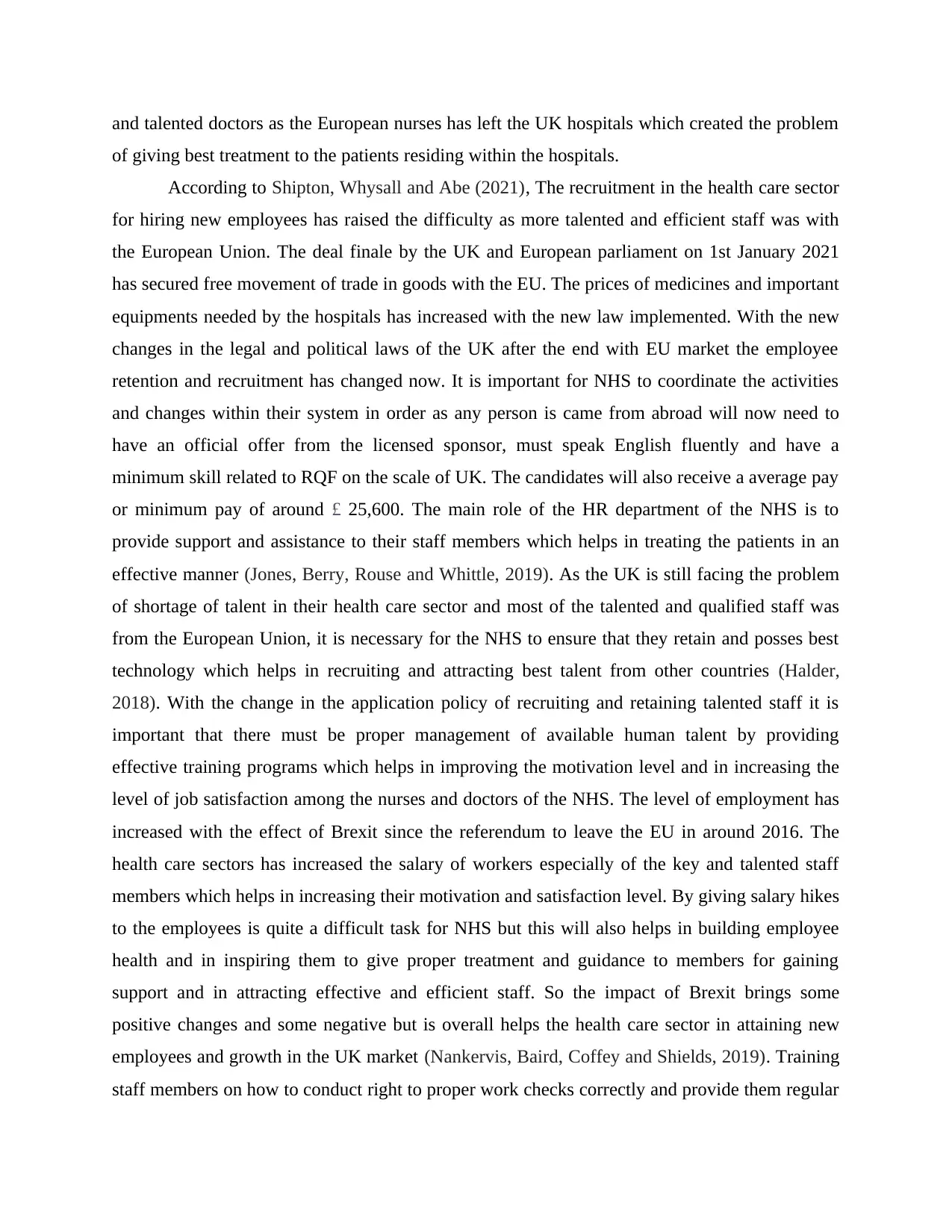
and talented doctors as the European nurses has left the UK hospitals which created the problem
of giving best treatment to the patients residing within the hospitals.
According to Shipton, Whysall and Abe (2021), The recruitment in the health care sector
for hiring new employees has raised the difficulty as more talented and efficient staff was with
the European Union. The deal finale by the UK and European parliament on 1st January 2021
has secured free movement of trade in goods with the EU. The prices of medicines and important
equipments needed by the hospitals has increased with the new law implemented. With the new
changes in the legal and political laws of the UK after the end with EU market the employee
retention and recruitment has changed now. It is important for NHS to coordinate the activities
and changes within their system in order as any person is came from abroad will now need to
have an official offer from the licensed sponsor, must speak English fluently and have a
minimum skill related to RQF on the scale of UK. The candidates will also receive a average pay
or minimum pay of around £ 25,600. The main role of the HR department of the NHS is to
provide support and assistance to their staff members which helps in treating the patients in an
effective manner (Jones, Berry, Rouse and Whittle, 2019). As the UK is still facing the problem
of shortage of talent in their health care sector and most of the talented and qualified staff was
from the European Union, it is necessary for the NHS to ensure that they retain and posses best
technology which helps in recruiting and attracting best talent from other countries (Halder,
2018). With the change in the application policy of recruiting and retaining talented staff it is
important that there must be proper management of available human talent by providing
effective training programs which helps in improving the motivation level and in increasing the
level of job satisfaction among the nurses and doctors of the NHS. The level of employment has
increased with the effect of Brexit since the referendum to leave the EU in around 2016. The
health care sectors has increased the salary of workers especially of the key and talented staff
members which helps in increasing their motivation and satisfaction level. By giving salary hikes
to the employees is quite a difficult task for NHS but this will also helps in building employee
health and in inspiring them to give proper treatment and guidance to members for gaining
support and in attracting effective and efficient staff. So the impact of Brexit brings some
positive changes and some negative but is overall helps the health care sector in attaining new
employees and growth in the UK market (Nankervis, Baird, Coffey and Shields, 2019). Training
staff members on how to conduct right to proper work checks correctly and provide them regular
of giving best treatment to the patients residing within the hospitals.
According to Shipton, Whysall and Abe (2021), The recruitment in the health care sector
for hiring new employees has raised the difficulty as more talented and efficient staff was with
the European Union. The deal finale by the UK and European parliament on 1st January 2021
has secured free movement of trade in goods with the EU. The prices of medicines and important
equipments needed by the hospitals has increased with the new law implemented. With the new
changes in the legal and political laws of the UK after the end with EU market the employee
retention and recruitment has changed now. It is important for NHS to coordinate the activities
and changes within their system in order as any person is came from abroad will now need to
have an official offer from the licensed sponsor, must speak English fluently and have a
minimum skill related to RQF on the scale of UK. The candidates will also receive a average pay
or minimum pay of around £ 25,600. The main role of the HR department of the NHS is to
provide support and assistance to their staff members which helps in treating the patients in an
effective manner (Jones, Berry, Rouse and Whittle, 2019). As the UK is still facing the problem
of shortage of talent in their health care sector and most of the talented and qualified staff was
from the European Union, it is necessary for the NHS to ensure that they retain and posses best
technology which helps in recruiting and attracting best talent from other countries (Halder,
2018). With the change in the application policy of recruiting and retaining talented staff it is
important that there must be proper management of available human talent by providing
effective training programs which helps in improving the motivation level and in increasing the
level of job satisfaction among the nurses and doctors of the NHS. The level of employment has
increased with the effect of Brexit since the referendum to leave the EU in around 2016. The
health care sectors has increased the salary of workers especially of the key and talented staff
members which helps in increasing their motivation and satisfaction level. By giving salary hikes
to the employees is quite a difficult task for NHS but this will also helps in building employee
health and in inspiring them to give proper treatment and guidance to members for gaining
support and in attracting effective and efficient staff. So the impact of Brexit brings some
positive changes and some negative but is overall helps the health care sector in attaining new
employees and growth in the UK market (Nankervis, Baird, Coffey and Shields, 2019). Training
staff members on how to conduct right to proper work checks correctly and provide them regular
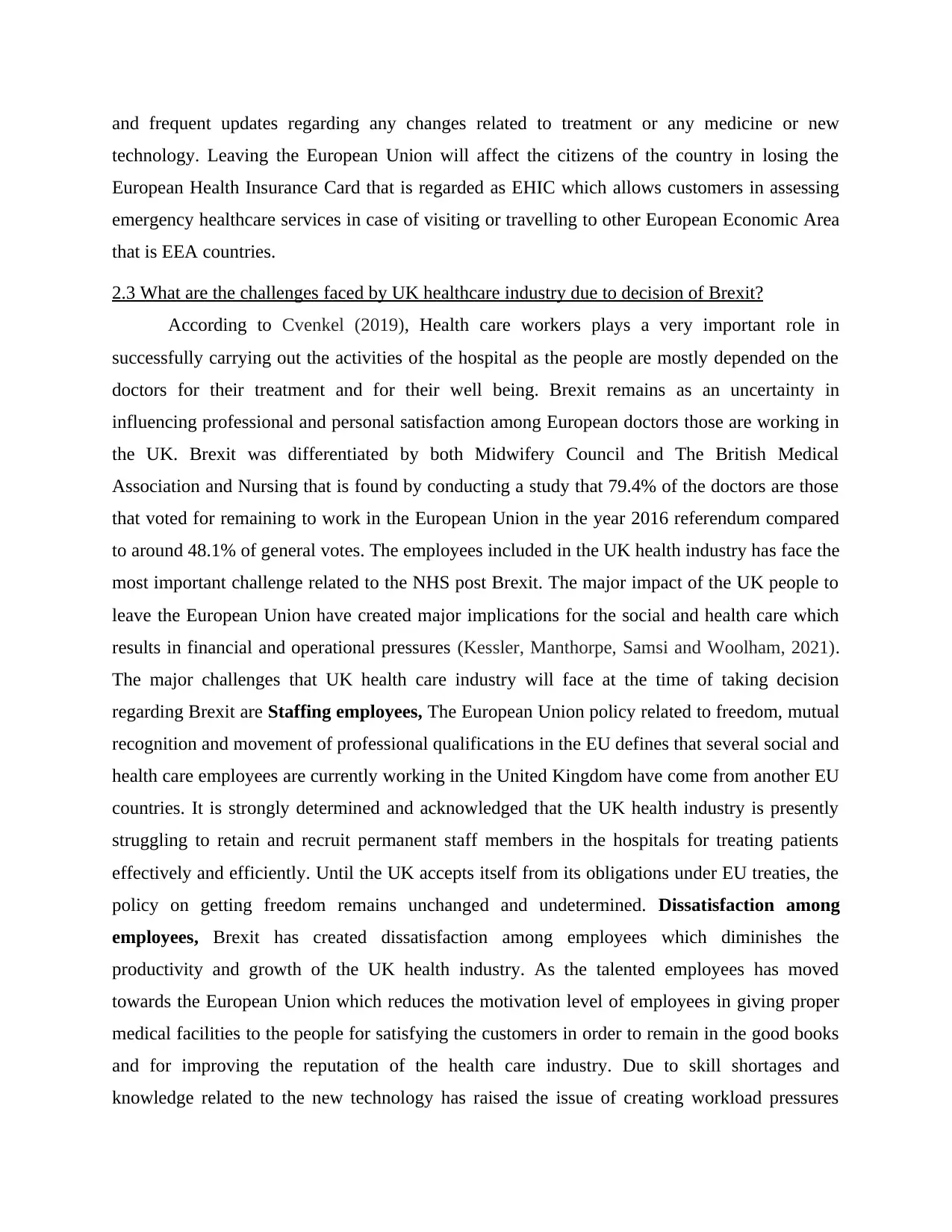
and frequent updates regarding any changes related to treatment or any medicine or new
technology. Leaving the European Union will affect the citizens of the country in losing the
European Health Insurance Card that is regarded as EHIC which allows customers in assessing
emergency healthcare services in case of visiting or travelling to other European Economic Area
that is EEA countries.
2.3 What are the challenges faced by UK healthcare industry due to decision of Brexit?
According to Cvenkel (2019), Health care workers plays a very important role in
successfully carrying out the activities of the hospital as the people are mostly depended on the
doctors for their treatment and for their well being. Brexit remains as an uncertainty in
influencing professional and personal satisfaction among European doctors those are working in
the UK. Brexit was differentiated by both Midwifery Council and The British Medical
Association and Nursing that is found by conducting a study that 79.4% of the doctors are those
that voted for remaining to work in the European Union in the year 2016 referendum compared
to around 48.1% of general votes. The employees included in the UK health industry has face the
most important challenge related to the NHS post Brexit. The major impact of the UK people to
leave the European Union have created major implications for the social and health care which
results in financial and operational pressures (Kessler, Manthorpe, Samsi and Woolham, 2021).
The major challenges that UK health care industry will face at the time of taking decision
regarding Brexit are Staffing employees, The European Union policy related to freedom, mutual
recognition and movement of professional qualifications in the EU defines that several social and
health care employees are currently working in the United Kingdom have come from another EU
countries. It is strongly determined and acknowledged that the UK health industry is presently
struggling to retain and recruit permanent staff members in the hospitals for treating patients
effectively and efficiently. Until the UK accepts itself from its obligations under EU treaties, the
policy on getting freedom remains unchanged and undetermined. Dissatisfaction among
employees, Brexit has created dissatisfaction among employees which diminishes the
productivity and growth of the UK health industry. As the talented employees has moved
towards the European Union which reduces the motivation level of employees in giving proper
medical facilities to the people for satisfying the customers in order to remain in the good books
and for improving the reputation of the health care industry. Due to skill shortages and
knowledge related to the new technology has raised the issue of creating workload pressures
technology. Leaving the European Union will affect the citizens of the country in losing the
European Health Insurance Card that is regarded as EHIC which allows customers in assessing
emergency healthcare services in case of visiting or travelling to other European Economic Area
that is EEA countries.
2.3 What are the challenges faced by UK healthcare industry due to decision of Brexit?
According to Cvenkel (2019), Health care workers plays a very important role in
successfully carrying out the activities of the hospital as the people are mostly depended on the
doctors for their treatment and for their well being. Brexit remains as an uncertainty in
influencing professional and personal satisfaction among European doctors those are working in
the UK. Brexit was differentiated by both Midwifery Council and The British Medical
Association and Nursing that is found by conducting a study that 79.4% of the doctors are those
that voted for remaining to work in the European Union in the year 2016 referendum compared
to around 48.1% of general votes. The employees included in the UK health industry has face the
most important challenge related to the NHS post Brexit. The major impact of the UK people to
leave the European Union have created major implications for the social and health care which
results in financial and operational pressures (Kessler, Manthorpe, Samsi and Woolham, 2021).
The major challenges that UK health care industry will face at the time of taking decision
regarding Brexit are Staffing employees, The European Union policy related to freedom, mutual
recognition and movement of professional qualifications in the EU defines that several social and
health care employees are currently working in the United Kingdom have come from another EU
countries. It is strongly determined and acknowledged that the UK health industry is presently
struggling to retain and recruit permanent staff members in the hospitals for treating patients
effectively and efficiently. Until the UK accepts itself from its obligations under EU treaties, the
policy on getting freedom remains unchanged and undetermined. Dissatisfaction among
employees, Brexit has created dissatisfaction among employees which diminishes the
productivity and growth of the UK health industry. As the talented employees has moved
towards the European Union which reduces the motivation level of employees in giving proper
medical facilities to the people for satisfying the customers in order to remain in the good books
and for improving the reputation of the health care industry. Due to skill shortages and
knowledge related to the new technology has raised the issue of creating workload pressures
Paraphrase This Document
Need a fresh take? Get an instant paraphrase of this document with our AI Paraphraser
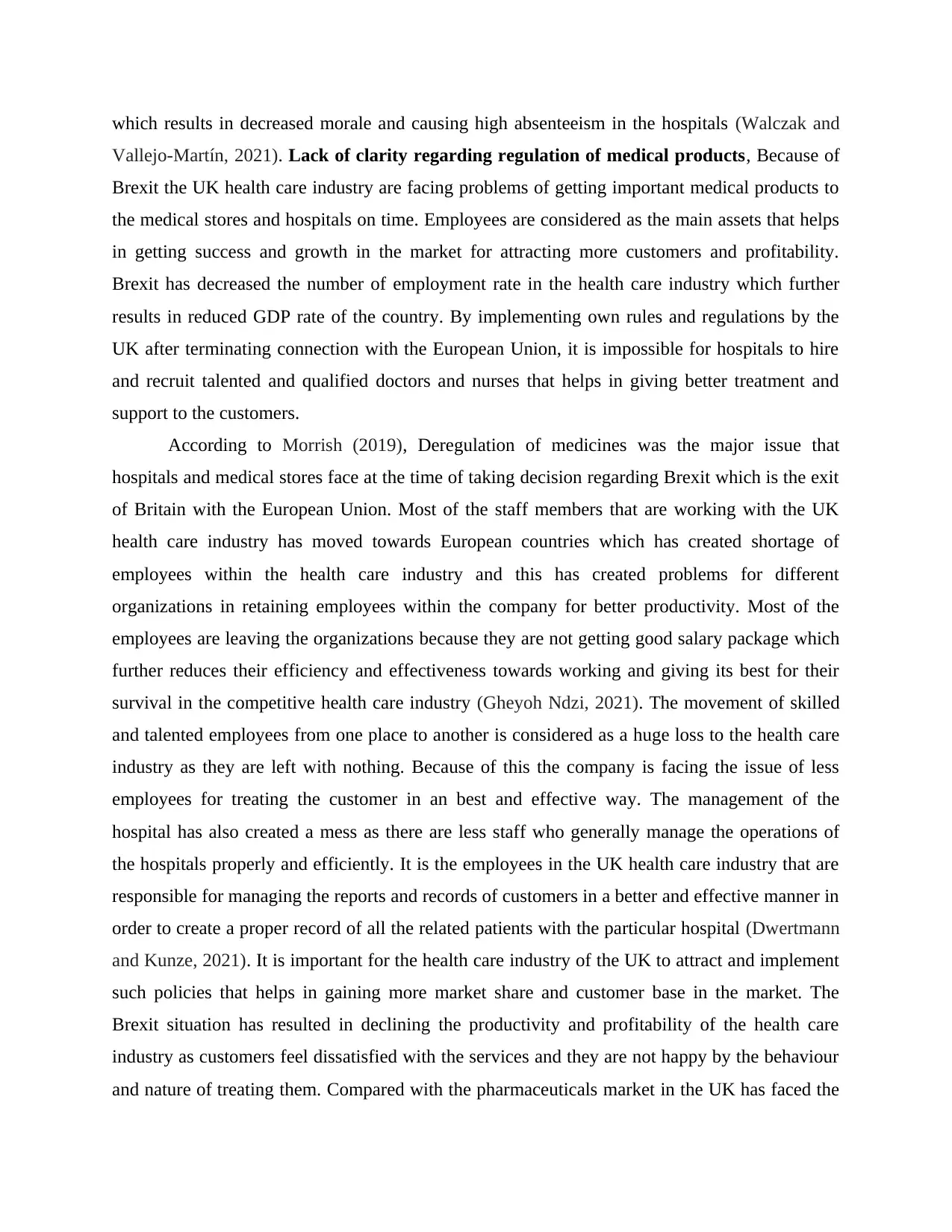
which results in decreased morale and causing high absenteeism in the hospitals (Walczak and
Vallejo-Martín, 2021). Lack of clarity regarding regulation of medical products, Because of
Brexit the UK health care industry are facing problems of getting important medical products to
the medical stores and hospitals on time. Employees are considered as the main assets that helps
in getting success and growth in the market for attracting more customers and profitability.
Brexit has decreased the number of employment rate in the health care industry which further
results in reduced GDP rate of the country. By implementing own rules and regulations by the
UK after terminating connection with the European Union, it is impossible for hospitals to hire
and recruit talented and qualified doctors and nurses that helps in giving better treatment and
support to the customers.
According to Morrish (2019), Deregulation of medicines was the major issue that
hospitals and medical stores face at the time of taking decision regarding Brexit which is the exit
of Britain with the European Union. Most of the staff members that are working with the UK
health care industry has moved towards European countries which has created shortage of
employees within the health care industry and this has created problems for different
organizations in retaining employees within the company for better productivity. Most of the
employees are leaving the organizations because they are not getting good salary package which
further reduces their efficiency and effectiveness towards working and giving its best for their
survival in the competitive health care industry (Gheyoh Ndzi, 2021). The movement of skilled
and talented employees from one place to another is considered as a huge loss to the health care
industry as they are left with nothing. Because of this the company is facing the issue of less
employees for treating the customer in an best and effective way. The management of the
hospital has also created a mess as there are less staff who generally manage the operations of
the hospitals properly and efficiently. It is the employees in the UK health care industry that are
responsible for managing the reports and records of customers in a better and effective manner in
order to create a proper record of all the related patients with the particular hospital (Dwertmann
and Kunze, 2021). It is important for the health care industry of the UK to attract and implement
such policies that helps in gaining more market share and customer base in the market. The
Brexit situation has resulted in declining the productivity and profitability of the health care
industry as customers feel dissatisfied with the services and they are not happy by the behaviour
and nature of treating them. Compared with the pharmaceuticals market in the UK has faced the
Vallejo-Martín, 2021). Lack of clarity regarding regulation of medical products, Because of
Brexit the UK health care industry are facing problems of getting important medical products to
the medical stores and hospitals on time. Employees are considered as the main assets that helps
in getting success and growth in the market for attracting more customers and profitability.
Brexit has decreased the number of employment rate in the health care industry which further
results in reduced GDP rate of the country. By implementing own rules and regulations by the
UK after terminating connection with the European Union, it is impossible for hospitals to hire
and recruit talented and qualified doctors and nurses that helps in giving better treatment and
support to the customers.
According to Morrish (2019), Deregulation of medicines was the major issue that
hospitals and medical stores face at the time of taking decision regarding Brexit which is the exit
of Britain with the European Union. Most of the staff members that are working with the UK
health care industry has moved towards European countries which has created shortage of
employees within the health care industry and this has created problems for different
organizations in retaining employees within the company for better productivity. Most of the
employees are leaving the organizations because they are not getting good salary package which
further reduces their efficiency and effectiveness towards working and giving its best for their
survival in the competitive health care industry (Gheyoh Ndzi, 2021). The movement of skilled
and talented employees from one place to another is considered as a huge loss to the health care
industry as they are left with nothing. Because of this the company is facing the issue of less
employees for treating the customer in an best and effective way. The management of the
hospital has also created a mess as there are less staff who generally manage the operations of
the hospitals properly and efficiently. It is the employees in the UK health care industry that are
responsible for managing the reports and records of customers in a better and effective manner in
order to create a proper record of all the related patients with the particular hospital (Dwertmann
and Kunze, 2021). It is important for the health care industry of the UK to attract and implement
such policies that helps in gaining more market share and customer base in the market. The
Brexit situation has resulted in declining the productivity and profitability of the health care
industry as customers feel dissatisfied with the services and they are not happy by the behaviour
and nature of treating them. Compared with the pharmaceuticals market in the UK has faced the
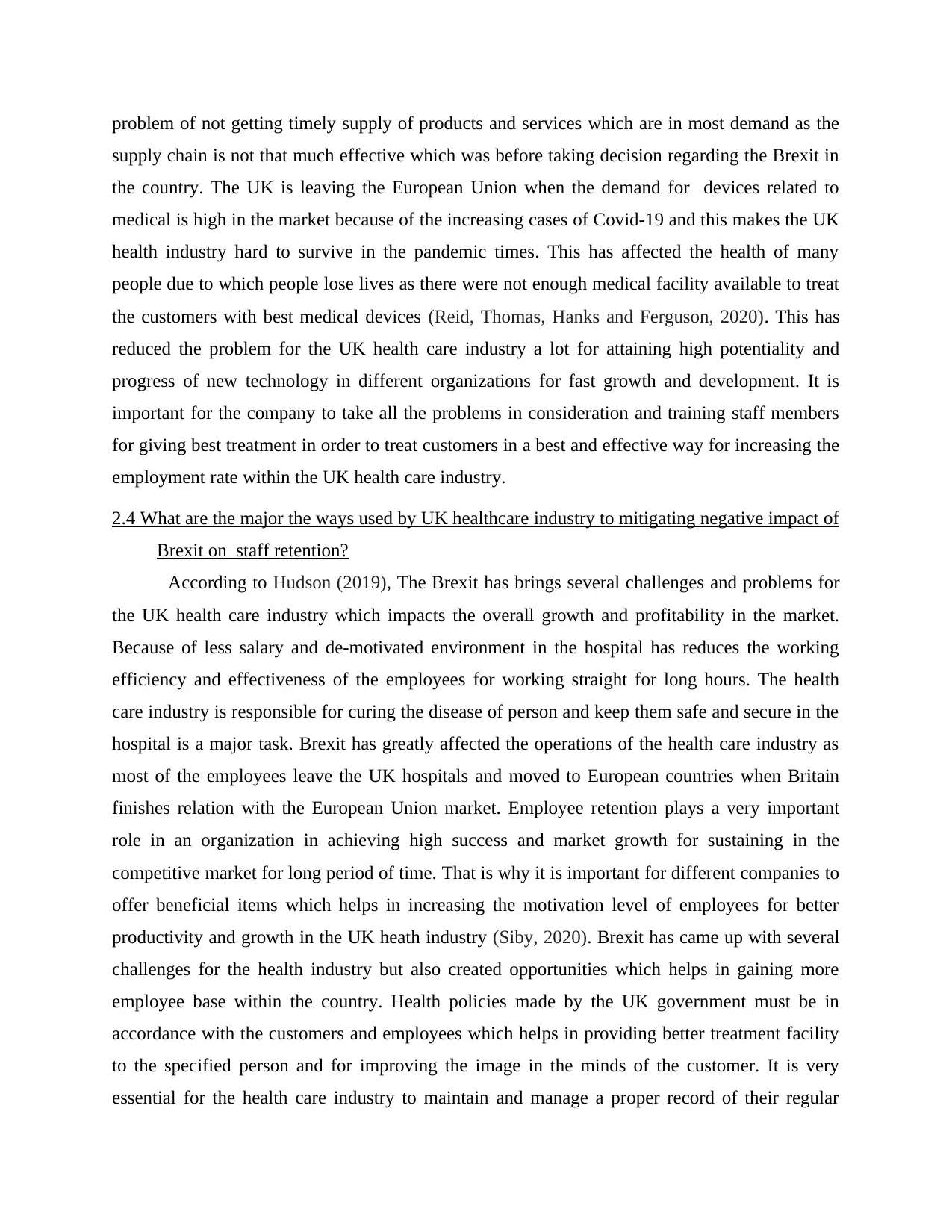
problem of not getting timely supply of products and services which are in most demand as the
supply chain is not that much effective which was before taking decision regarding the Brexit in
the country. The UK is leaving the European Union when the demand for devices related to
medical is high in the market because of the increasing cases of Covid-19 and this makes the UK
health industry hard to survive in the pandemic times. This has affected the health of many
people due to which people lose lives as there were not enough medical facility available to treat
the customers with best medical devices (Reid, Thomas, Hanks and Ferguson, 2020). This has
reduced the problem for the UK health care industry a lot for attaining high potentiality and
progress of new technology in different organizations for fast growth and development. It is
important for the company to take all the problems in consideration and training staff members
for giving best treatment in order to treat customers in a best and effective way for increasing the
employment rate within the UK health care industry.
2.4 What are the major the ways used by UK healthcare industry to mitigating negative impact of
Brexit on staff retention?
According to Hudson (2019), The Brexit has brings several challenges and problems for
the UK health care industry which impacts the overall growth and profitability in the market.
Because of less salary and de-motivated environment in the hospital has reduces the working
efficiency and effectiveness of the employees for working straight for long hours. The health
care industry is responsible for curing the disease of person and keep them safe and secure in the
hospital is a major task. Brexit has greatly affected the operations of the health care industry as
most of the employees leave the UK hospitals and moved to European countries when Britain
finishes relation with the European Union market. Employee retention plays a very important
role in an organization in achieving high success and market growth for sustaining in the
competitive market for long period of time. That is why it is important for different companies to
offer beneficial items which helps in increasing the motivation level of employees for better
productivity and growth in the UK heath industry (Siby, 2020). Brexit has came up with several
challenges for the health industry but also created opportunities which helps in gaining more
employee base within the country. Health policies made by the UK government must be in
accordance with the customers and employees which helps in providing better treatment facility
to the specified person and for improving the image in the minds of the customer. It is very
essential for the health care industry to maintain and manage a proper record of their regular
supply chain is not that much effective which was before taking decision regarding the Brexit in
the country. The UK is leaving the European Union when the demand for devices related to
medical is high in the market because of the increasing cases of Covid-19 and this makes the UK
health industry hard to survive in the pandemic times. This has affected the health of many
people due to which people lose lives as there were not enough medical facility available to treat
the customers with best medical devices (Reid, Thomas, Hanks and Ferguson, 2020). This has
reduced the problem for the UK health care industry a lot for attaining high potentiality and
progress of new technology in different organizations for fast growth and development. It is
important for the company to take all the problems in consideration and training staff members
for giving best treatment in order to treat customers in a best and effective way for increasing the
employment rate within the UK health care industry.
2.4 What are the major the ways used by UK healthcare industry to mitigating negative impact of
Brexit on staff retention?
According to Hudson (2019), The Brexit has brings several challenges and problems for
the UK health care industry which impacts the overall growth and profitability in the market.
Because of less salary and de-motivated environment in the hospital has reduces the working
efficiency and effectiveness of the employees for working straight for long hours. The health
care industry is responsible for curing the disease of person and keep them safe and secure in the
hospital is a major task. Brexit has greatly affected the operations of the health care industry as
most of the employees leave the UK hospitals and moved to European countries when Britain
finishes relation with the European Union market. Employee retention plays a very important
role in an organization in achieving high success and market growth for sustaining in the
competitive market for long period of time. That is why it is important for different companies to
offer beneficial items which helps in increasing the motivation level of employees for better
productivity and growth in the UK heath industry (Siby, 2020). Brexit has came up with several
challenges for the health industry but also created opportunities which helps in gaining more
employee base within the country. Health policies made by the UK government must be in
accordance with the customers and employees which helps in providing better treatment facility
to the specified person and for improving the image in the minds of the customer. It is very
essential for the health care industry to maintain and manage a proper record of their regular
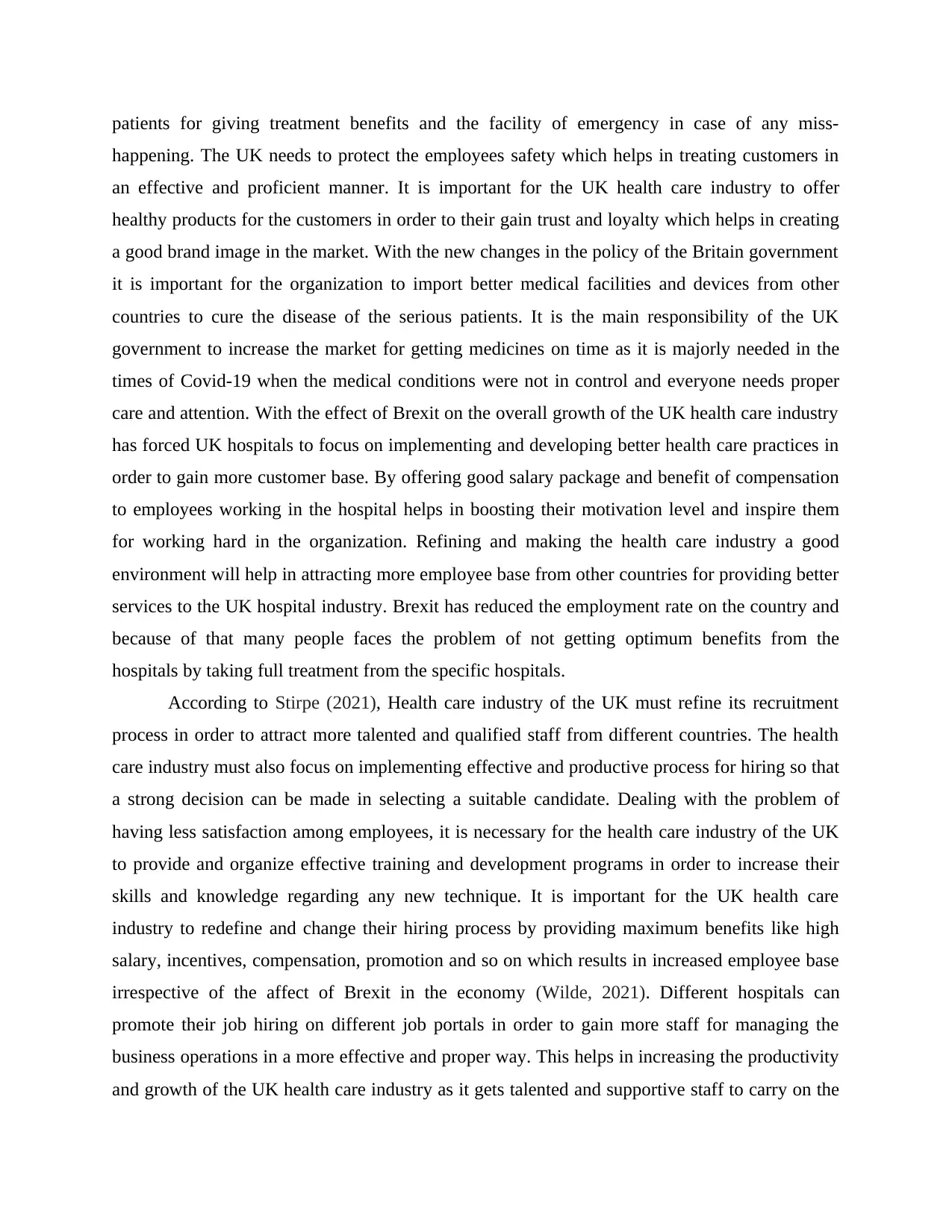
patients for giving treatment benefits and the facility of emergency in case of any miss-
happening. The UK needs to protect the employees safety which helps in treating customers in
an effective and proficient manner. It is important for the UK health care industry to offer
healthy products for the customers in order to their gain trust and loyalty which helps in creating
a good brand image in the market. With the new changes in the policy of the Britain government
it is important for the organization to import better medical facilities and devices from other
countries to cure the disease of the serious patients. It is the main responsibility of the UK
government to increase the market for getting medicines on time as it is majorly needed in the
times of Covid-19 when the medical conditions were not in control and everyone needs proper
care and attention. With the effect of Brexit on the overall growth of the UK health care industry
has forced UK hospitals to focus on implementing and developing better health care practices in
order to gain more customer base. By offering good salary package and benefit of compensation
to employees working in the hospital helps in boosting their motivation level and inspire them
for working hard in the organization. Refining and making the health care industry a good
environment will help in attracting more employee base from other countries for providing better
services to the UK hospital industry. Brexit has reduced the employment rate on the country and
because of that many people faces the problem of not getting optimum benefits from the
hospitals by taking full treatment from the specific hospitals.
According to Stirpe (2021), Health care industry of the UK must refine its recruitment
process in order to attract more talented and qualified staff from different countries. The health
care industry must also focus on implementing effective and productive process for hiring so that
a strong decision can be made in selecting a suitable candidate. Dealing with the problem of
having less satisfaction among employees, it is necessary for the health care industry of the UK
to provide and organize effective training and development programs in order to increase their
skills and knowledge regarding any new technique. It is important for the UK health care
industry to redefine and change their hiring process by providing maximum benefits like high
salary, incentives, compensation, promotion and so on which results in increased employee base
irrespective of the affect of Brexit in the economy (Wilde, 2021). Different hospitals can
promote their job hiring on different job portals in order to gain more staff for managing the
business operations in a more effective and proper way. This helps in increasing the productivity
and growth of the UK health care industry as it gets talented and supportive staff to carry on the
happening. The UK needs to protect the employees safety which helps in treating customers in
an effective and proficient manner. It is important for the UK health care industry to offer
healthy products for the customers in order to their gain trust and loyalty which helps in creating
a good brand image in the market. With the new changes in the policy of the Britain government
it is important for the organization to import better medical facilities and devices from other
countries to cure the disease of the serious patients. It is the main responsibility of the UK
government to increase the market for getting medicines on time as it is majorly needed in the
times of Covid-19 when the medical conditions were not in control and everyone needs proper
care and attention. With the effect of Brexit on the overall growth of the UK health care industry
has forced UK hospitals to focus on implementing and developing better health care practices in
order to gain more customer base. By offering good salary package and benefit of compensation
to employees working in the hospital helps in boosting their motivation level and inspire them
for working hard in the organization. Refining and making the health care industry a good
environment will help in attracting more employee base from other countries for providing better
services to the UK hospital industry. Brexit has reduced the employment rate on the country and
because of that many people faces the problem of not getting optimum benefits from the
hospitals by taking full treatment from the specific hospitals.
According to Stirpe (2021), Health care industry of the UK must refine its recruitment
process in order to attract more talented and qualified staff from different countries. The health
care industry must also focus on implementing effective and productive process for hiring so that
a strong decision can be made in selecting a suitable candidate. Dealing with the problem of
having less satisfaction among employees, it is necessary for the health care industry of the UK
to provide and organize effective training and development programs in order to increase their
skills and knowledge regarding any new technique. It is important for the UK health care
industry to redefine and change their hiring process by providing maximum benefits like high
salary, incentives, compensation, promotion and so on which results in increased employee base
irrespective of the affect of Brexit in the economy (Wilde, 2021). Different hospitals can
promote their job hiring on different job portals in order to gain more staff for managing the
business operations in a more effective and proper way. This helps in increasing the productivity
and growth of the UK health care industry as it gets talented and supportive staff to carry on the
Secure Best Marks with AI Grader
Need help grading? Try our AI Grader for instant feedback on your assignments.
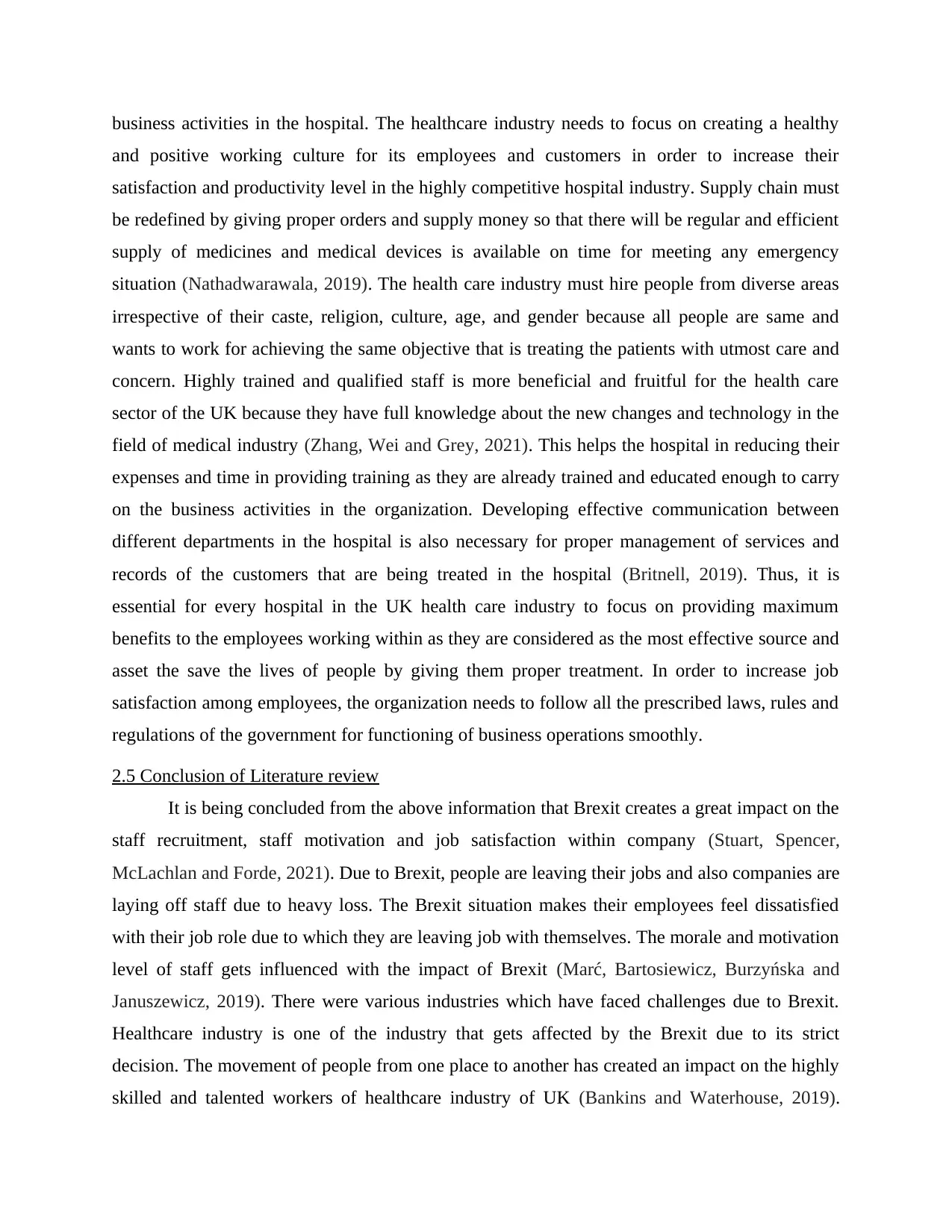
business activities in the hospital. The healthcare industry needs to focus on creating a healthy
and positive working culture for its employees and customers in order to increase their
satisfaction and productivity level in the highly competitive hospital industry. Supply chain must
be redefined by giving proper orders and supply money so that there will be regular and efficient
supply of medicines and medical devices is available on time for meeting any emergency
situation (Nathadwarawala, 2019). The health care industry must hire people from diverse areas
irrespective of their caste, religion, culture, age, and gender because all people are same and
wants to work for achieving the same objective that is treating the patients with utmost care and
concern. Highly trained and qualified staff is more beneficial and fruitful for the health care
sector of the UK because they have full knowledge about the new changes and technology in the
field of medical industry (Zhang, Wei and Grey, 2021). This helps the hospital in reducing their
expenses and time in providing training as they are already trained and educated enough to carry
on the business activities in the organization. Developing effective communication between
different departments in the hospital is also necessary for proper management of services and
records of the customers that are being treated in the hospital (Britnell, 2019). Thus, it is
essential for every hospital in the UK health care industry to focus on providing maximum
benefits to the employees working within as they are considered as the most effective source and
asset the save the lives of people by giving them proper treatment. In order to increase job
satisfaction among employees, the organization needs to follow all the prescribed laws, rules and
regulations of the government for functioning of business operations smoothly.
2.5 Conclusion of Literature review
It is being concluded from the above information that Brexit creates a great impact on the
staff recruitment, staff motivation and job satisfaction within company (Stuart, Spencer,
McLachlan and Forde, 2021). Due to Brexit, people are leaving their jobs and also companies are
laying off staff due to heavy loss. The Brexit situation makes their employees feel dissatisfied
with their job role due to which they are leaving job with themselves. The morale and motivation
level of staff gets influenced with the impact of Brexit (Marć, Bartosiewicz, Burzyńska and
Januszewicz, 2019). There were various industries which have faced challenges due to Brexit.
Healthcare industry is one of the industry that gets affected by the Brexit due to its strict
decision. The movement of people from one place to another has created an impact on the highly
skilled and talented workers of healthcare industry of UK (Bankins and Waterhouse, 2019).
and positive working culture for its employees and customers in order to increase their
satisfaction and productivity level in the highly competitive hospital industry. Supply chain must
be redefined by giving proper orders and supply money so that there will be regular and efficient
supply of medicines and medical devices is available on time for meeting any emergency
situation (Nathadwarawala, 2019). The health care industry must hire people from diverse areas
irrespective of their caste, religion, culture, age, and gender because all people are same and
wants to work for achieving the same objective that is treating the patients with utmost care and
concern. Highly trained and qualified staff is more beneficial and fruitful for the health care
sector of the UK because they have full knowledge about the new changes and technology in the
field of medical industry (Zhang, Wei and Grey, 2021). This helps the hospital in reducing their
expenses and time in providing training as they are already trained and educated enough to carry
on the business activities in the organization. Developing effective communication between
different departments in the hospital is also necessary for proper management of services and
records of the customers that are being treated in the hospital (Britnell, 2019). Thus, it is
essential for every hospital in the UK health care industry to focus on providing maximum
benefits to the employees working within as they are considered as the most effective source and
asset the save the lives of people by giving them proper treatment. In order to increase job
satisfaction among employees, the organization needs to follow all the prescribed laws, rules and
regulations of the government for functioning of business operations smoothly.
2.5 Conclusion of Literature review
It is being concluded from the above information that Brexit creates a great impact on the
staff recruitment, staff motivation and job satisfaction within company (Stuart, Spencer,
McLachlan and Forde, 2021). Due to Brexit, people are leaving their jobs and also companies are
laying off staff due to heavy loss. The Brexit situation makes their employees feel dissatisfied
with their job role due to which they are leaving job with themselves. The morale and motivation
level of staff gets influenced with the impact of Brexit (Marć, Bartosiewicz, Burzyńska and
Januszewicz, 2019). There were various industries which have faced challenges due to Brexit.
Healthcare industry is one of the industry that gets affected by the Brexit due to its strict
decision. The movement of people from one place to another has created an impact on the highly
skilled and talented workers of healthcare industry of UK (Bankins and Waterhouse, 2019).
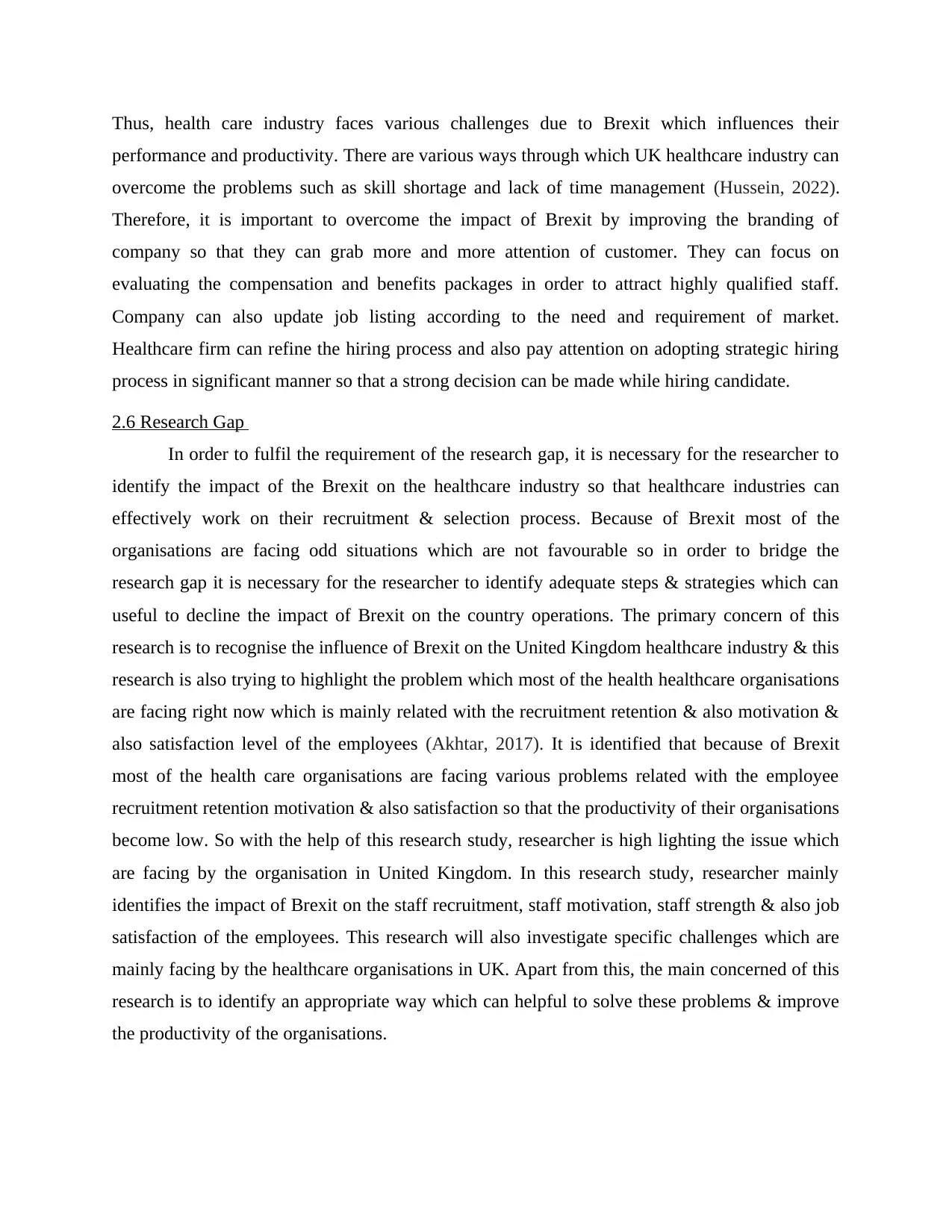
Thus, health care industry faces various challenges due to Brexit which influences their
performance and productivity. There are various ways through which UK healthcare industry can
overcome the problems such as skill shortage and lack of time management (Hussein, 2022).
Therefore, it is important to overcome the impact of Brexit by improving the branding of
company so that they can grab more and more attention of customer. They can focus on
evaluating the compensation and benefits packages in order to attract highly qualified staff.
Company can also update job listing according to the need and requirement of market.
Healthcare firm can refine the hiring process and also pay attention on adopting strategic hiring
process in significant manner so that a strong decision can be made while hiring candidate.
2.6 Research Gap
In order to fulfil the requirement of the research gap, it is necessary for the researcher to
identify the impact of the Brexit on the healthcare industry so that healthcare industries can
effectively work on their recruitment & selection process. Because of Brexit most of the
organisations are facing odd situations which are not favourable so in order to bridge the
research gap it is necessary for the researcher to identify adequate steps & strategies which can
useful to decline the impact of Brexit on the country operations. The primary concern of this
research is to recognise the influence of Brexit on the United Kingdom healthcare industry & this
research is also trying to highlight the problem which most of the health healthcare organisations
are facing right now which is mainly related with the recruitment retention & also motivation &
also satisfaction level of the employees (Akhtar, 2017). It is identified that because of Brexit
most of the health care organisations are facing various problems related with the employee
recruitment retention motivation & also satisfaction so that the productivity of their organisations
become low. So with the help of this research study, researcher is high lighting the issue which
are facing by the organisation in United Kingdom. In this research study, researcher mainly
identifies the impact of Brexit on the staff recruitment, staff motivation, staff strength & also job
satisfaction of the employees. This research will also investigate specific challenges which are
mainly facing by the healthcare organisations in UK. Apart from this, the main concerned of this
research is to identify an appropriate way which can helpful to solve these problems & improve
the productivity of the organisations.
performance and productivity. There are various ways through which UK healthcare industry can
overcome the problems such as skill shortage and lack of time management (Hussein, 2022).
Therefore, it is important to overcome the impact of Brexit by improving the branding of
company so that they can grab more and more attention of customer. They can focus on
evaluating the compensation and benefits packages in order to attract highly qualified staff.
Company can also update job listing according to the need and requirement of market.
Healthcare firm can refine the hiring process and also pay attention on adopting strategic hiring
process in significant manner so that a strong decision can be made while hiring candidate.
2.6 Research Gap
In order to fulfil the requirement of the research gap, it is necessary for the researcher to
identify the impact of the Brexit on the healthcare industry so that healthcare industries can
effectively work on their recruitment & selection process. Because of Brexit most of the
organisations are facing odd situations which are not favourable so in order to bridge the
research gap it is necessary for the researcher to identify adequate steps & strategies which can
useful to decline the impact of Brexit on the country operations. The primary concern of this
research is to recognise the influence of Brexit on the United Kingdom healthcare industry & this
research is also trying to highlight the problem which most of the health healthcare organisations
are facing right now which is mainly related with the recruitment retention & also motivation &
also satisfaction level of the employees (Akhtar, 2017). It is identified that because of Brexit
most of the health care organisations are facing various problems related with the employee
recruitment retention motivation & also satisfaction so that the productivity of their organisations
become low. So with the help of this research study, researcher is high lighting the issue which
are facing by the organisation in United Kingdom. In this research study, researcher mainly
identifies the impact of Brexit on the staff recruitment, staff motivation, staff strength & also job
satisfaction of the employees. This research will also investigate specific challenges which are
mainly facing by the healthcare organisations in UK. Apart from this, the main concerned of this
research is to identify an appropriate way which can helpful to solve these problems & improve
the productivity of the organisations.
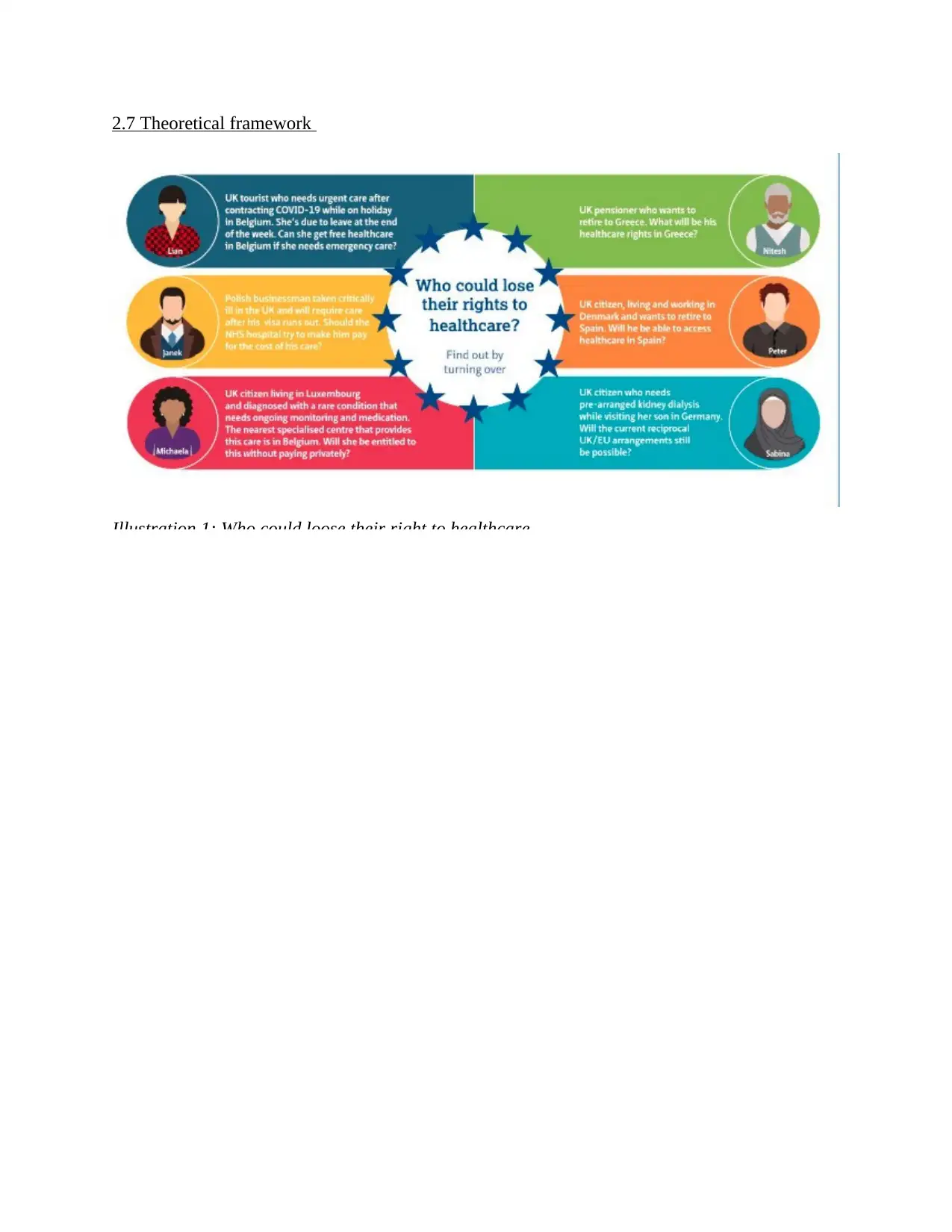
2.7 Theoretical framework
Illustration 1: Who could loose their right to healthcare.
Illustration 1: Who could loose their right to healthcare.
Paraphrase This Document
Need a fresh take? Get an instant paraphrase of this document with our AI Paraphraser
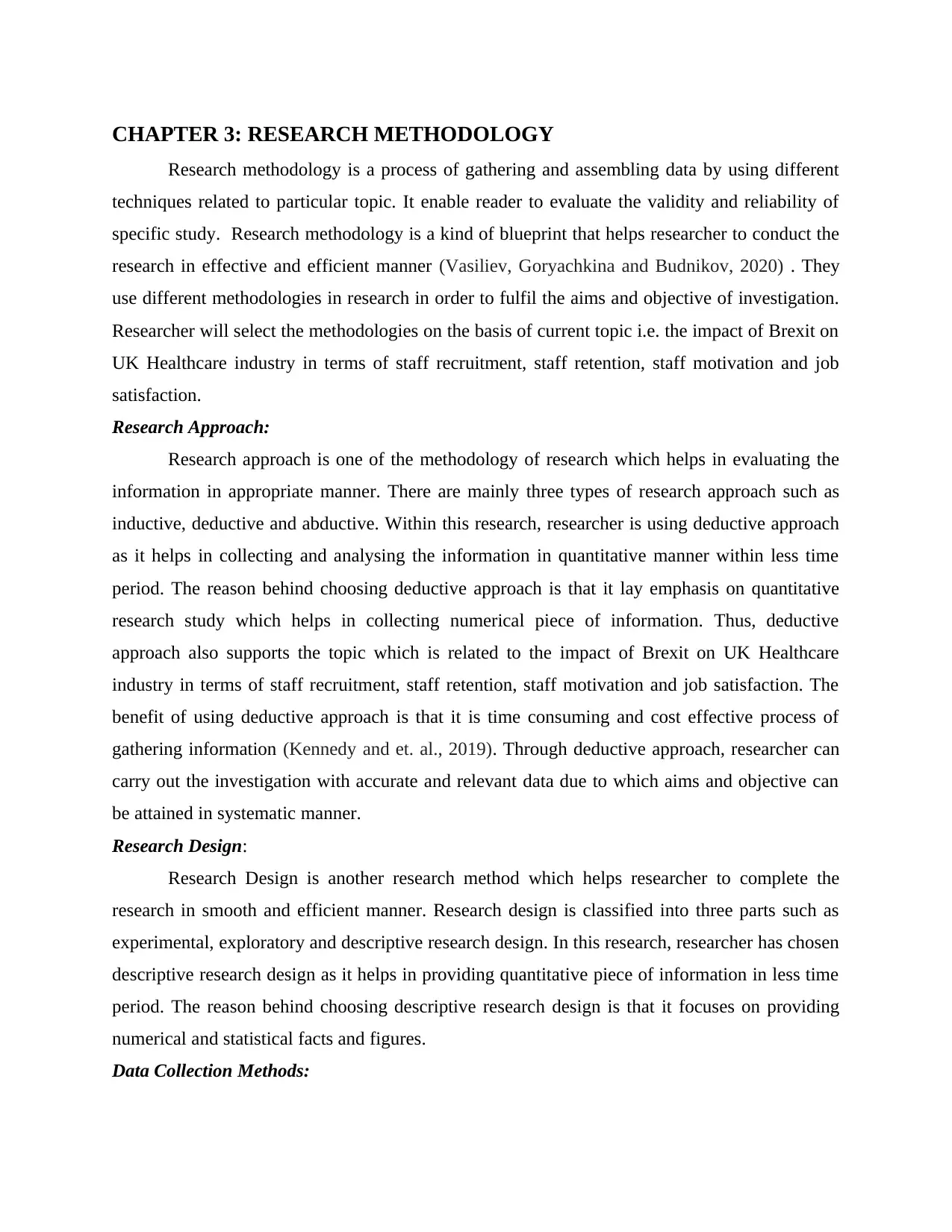
CHAPTER 3: RESEARCH METHODOLOGY
Research methodology is a process of gathering and assembling data by using different
techniques related to particular topic. It enable reader to evaluate the validity and reliability of
specific study. Research methodology is a kind of blueprint that helps researcher to conduct the
research in effective and efficient manner (Vasiliev, Goryachkina and Budnikov, 2020) . They
use different methodologies in research in order to fulfil the aims and objective of investigation.
Researcher will select the methodologies on the basis of current topic i.e. the impact of Brexit on
UK Healthcare industry in terms of staff recruitment, staff retention, staff motivation and job
satisfaction.
Research Approach:
Research approach is one of the methodology of research which helps in evaluating the
information in appropriate manner. There are mainly three types of research approach such as
inductive, deductive and abductive. Within this research, researcher is using deductive approach
as it helps in collecting and analysing the information in quantitative manner within less time
period. The reason behind choosing deductive approach is that it lay emphasis on quantitative
research study which helps in collecting numerical piece of information. Thus, deductive
approach also supports the topic which is related to the impact of Brexit on UK Healthcare
industry in terms of staff recruitment, staff retention, staff motivation and job satisfaction. The
benefit of using deductive approach is that it is time consuming and cost effective process of
gathering information (Kennedy and et. al., 2019). Through deductive approach, researcher can
carry out the investigation with accurate and relevant data due to which aims and objective can
be attained in systematic manner.
Research Design:
Research Design is another research method which helps researcher to complete the
research in smooth and efficient manner. Research design is classified into three parts such as
experimental, exploratory and descriptive research design. In this research, researcher has chosen
descriptive research design as it helps in providing quantitative piece of information in less time
period. The reason behind choosing descriptive research design is that it focuses on providing
numerical and statistical facts and figures.
Data Collection Methods:
Research methodology is a process of gathering and assembling data by using different
techniques related to particular topic. It enable reader to evaluate the validity and reliability of
specific study. Research methodology is a kind of blueprint that helps researcher to conduct the
research in effective and efficient manner (Vasiliev, Goryachkina and Budnikov, 2020) . They
use different methodologies in research in order to fulfil the aims and objective of investigation.
Researcher will select the methodologies on the basis of current topic i.e. the impact of Brexit on
UK Healthcare industry in terms of staff recruitment, staff retention, staff motivation and job
satisfaction.
Research Approach:
Research approach is one of the methodology of research which helps in evaluating the
information in appropriate manner. There are mainly three types of research approach such as
inductive, deductive and abductive. Within this research, researcher is using deductive approach
as it helps in collecting and analysing the information in quantitative manner within less time
period. The reason behind choosing deductive approach is that it lay emphasis on quantitative
research study which helps in collecting numerical piece of information. Thus, deductive
approach also supports the topic which is related to the impact of Brexit on UK Healthcare
industry in terms of staff recruitment, staff retention, staff motivation and job satisfaction. The
benefit of using deductive approach is that it is time consuming and cost effective process of
gathering information (Kennedy and et. al., 2019). Through deductive approach, researcher can
carry out the investigation with accurate and relevant data due to which aims and objective can
be attained in systematic manner.
Research Design:
Research Design is another research method which helps researcher to complete the
research in smooth and efficient manner. Research design is classified into three parts such as
experimental, exploratory and descriptive research design. In this research, researcher has chosen
descriptive research design as it helps in providing quantitative piece of information in less time
period. The reason behind choosing descriptive research design is that it focuses on providing
numerical and statistical facts and figures.
Data Collection Methods:
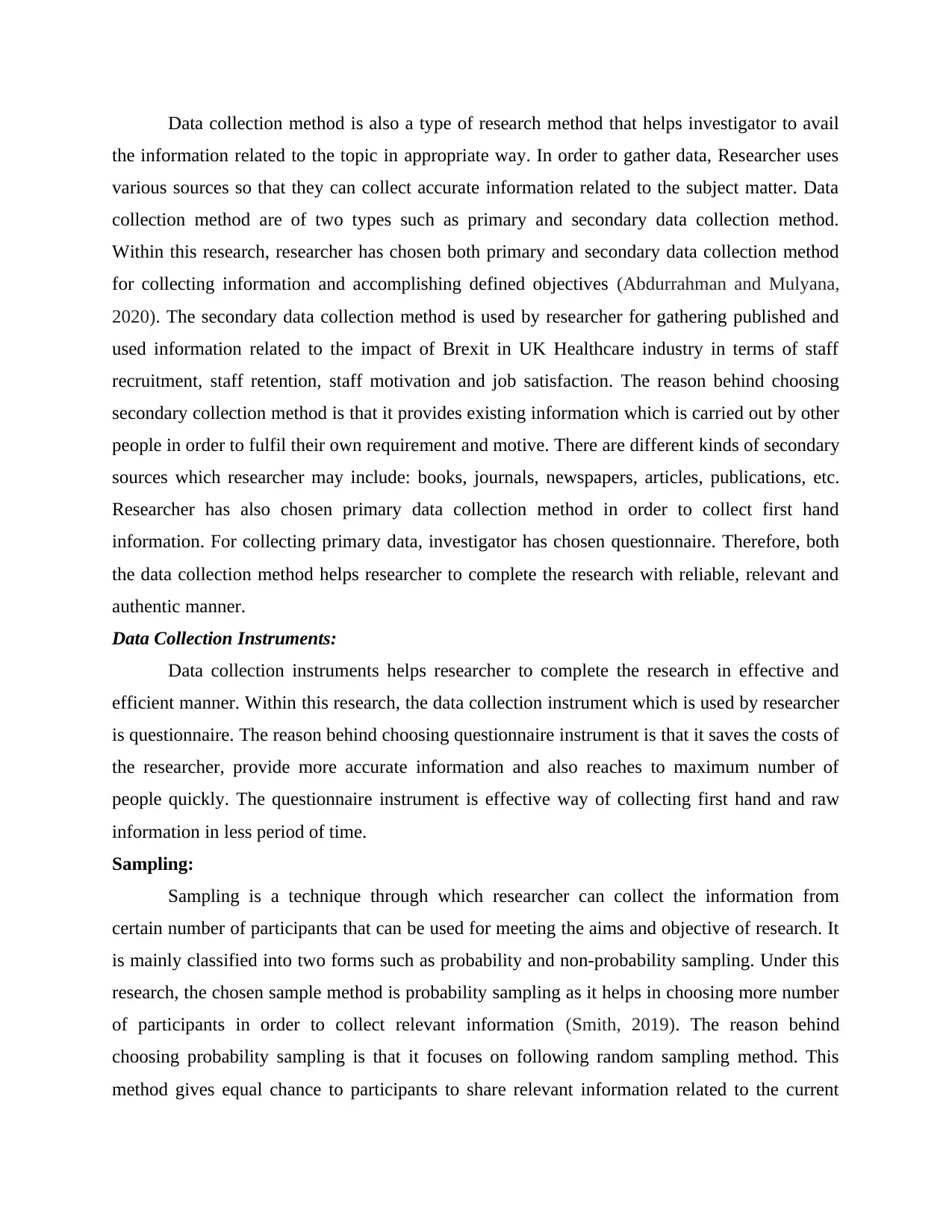
Data collection method is also a type of research method that helps investigator to avail
the information related to the topic in appropriate way. In order to gather data, Researcher uses
various sources so that they can collect accurate information related to the subject matter. Data
collection method are of two types such as primary and secondary data collection method.
Within this research, researcher has chosen both primary and secondary data collection method
for collecting information and accomplishing defined objectives (Abdurrahman and Mulyana,
2020). The secondary data collection method is used by researcher for gathering published and
used information related to the impact of Brexit in UK Healthcare industry in terms of staff
recruitment, staff retention, staff motivation and job satisfaction. The reason behind choosing
secondary collection method is that it provides existing information which is carried out by other
people in order to fulfil their own requirement and motive. There are different kinds of secondary
sources which researcher may include: books, journals, newspapers, articles, publications, etc.
Researcher has also chosen primary data collection method in order to collect first hand
information. For collecting primary data, investigator has chosen questionnaire. Therefore, both
the data collection method helps researcher to complete the research with reliable, relevant and
authentic manner.
Data Collection Instruments:
Data collection instruments helps researcher to complete the research in effective and
efficient manner. Within this research, the data collection instrument which is used by researcher
is questionnaire. The reason behind choosing questionnaire instrument is that it saves the costs of
the researcher, provide more accurate information and also reaches to maximum number of
people quickly. The questionnaire instrument is effective way of collecting first hand and raw
information in less period of time.
Sampling:
Sampling is a technique through which researcher can collect the information from
certain number of participants that can be used for meeting the aims and objective of research. It
is mainly classified into two forms such as probability and non-probability sampling. Under this
research, the chosen sample method is probability sampling as it helps in choosing more number
of participants in order to collect relevant information (Smith, 2019). The reason behind
choosing probability sampling is that it focuses on following random sampling method. This
method gives equal chance to participants to share relevant information related to the current
the information related to the topic in appropriate way. In order to gather data, Researcher uses
various sources so that they can collect accurate information related to the subject matter. Data
collection method are of two types such as primary and secondary data collection method.
Within this research, researcher has chosen both primary and secondary data collection method
for collecting information and accomplishing defined objectives (Abdurrahman and Mulyana,
2020). The secondary data collection method is used by researcher for gathering published and
used information related to the impact of Brexit in UK Healthcare industry in terms of staff
recruitment, staff retention, staff motivation and job satisfaction. The reason behind choosing
secondary collection method is that it provides existing information which is carried out by other
people in order to fulfil their own requirement and motive. There are different kinds of secondary
sources which researcher may include: books, journals, newspapers, articles, publications, etc.
Researcher has also chosen primary data collection method in order to collect first hand
information. For collecting primary data, investigator has chosen questionnaire. Therefore, both
the data collection method helps researcher to complete the research with reliable, relevant and
authentic manner.
Data Collection Instruments:
Data collection instruments helps researcher to complete the research in effective and
efficient manner. Within this research, the data collection instrument which is used by researcher
is questionnaire. The reason behind choosing questionnaire instrument is that it saves the costs of
the researcher, provide more accurate information and also reaches to maximum number of
people quickly. The questionnaire instrument is effective way of collecting first hand and raw
information in less period of time.
Sampling:
Sampling is a technique through which researcher can collect the information from
certain number of participants that can be used for meeting the aims and objective of research. It
is mainly classified into two forms such as probability and non-probability sampling. Under this
research, the chosen sample method is probability sampling as it helps in choosing more number
of participants in order to collect relevant information (Smith, 2019). The reason behind
choosing probability sampling is that it focuses on following random sampling method. This
method gives equal chance to participants to share relevant information related to the current
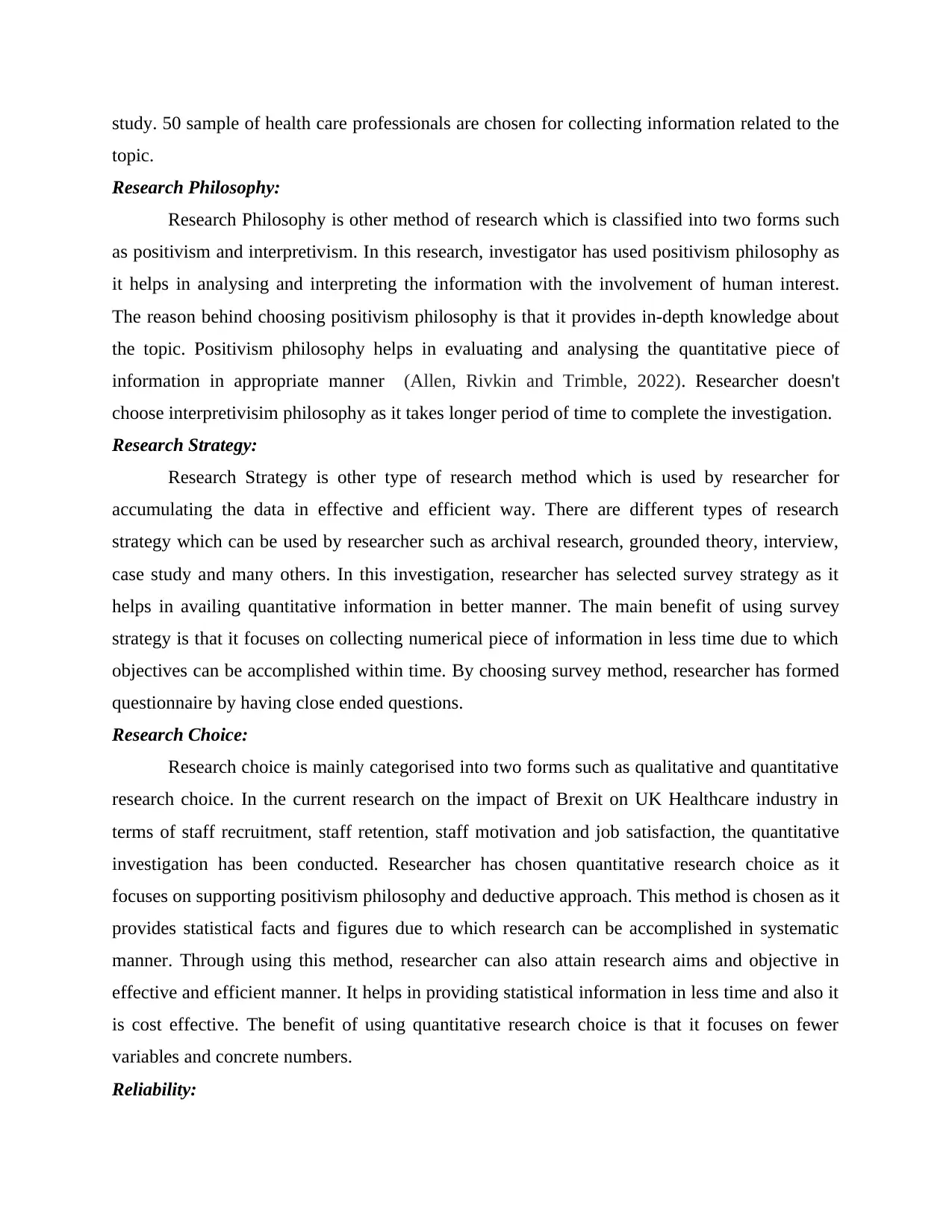
study. 50 sample of health care professionals are chosen for collecting information related to the
topic.
Research Philosophy:
Research Philosophy is other method of research which is classified into two forms such
as positivism and interpretivism. In this research, investigator has used positivism philosophy as
it helps in analysing and interpreting the information with the involvement of human interest.
The reason behind choosing positivism philosophy is that it provides in-depth knowledge about
the topic. Positivism philosophy helps in evaluating and analysing the quantitative piece of
information in appropriate manner (Allen, Rivkin and Trimble, 2022). Researcher doesn't
choose interpretivisim philosophy as it takes longer period of time to complete the investigation.
Research Strategy:
Research Strategy is other type of research method which is used by researcher for
accumulating the data in effective and efficient way. There are different types of research
strategy which can be used by researcher such as archival research, grounded theory, interview,
case study and many others. In this investigation, researcher has selected survey strategy as it
helps in availing quantitative information in better manner. The main benefit of using survey
strategy is that it focuses on collecting numerical piece of information in less time due to which
objectives can be accomplished within time. By choosing survey method, researcher has formed
questionnaire by having close ended questions.
Research Choice:
Research choice is mainly categorised into two forms such as qualitative and quantitative
research choice. In the current research on the impact of Brexit on UK Healthcare industry in
terms of staff recruitment, staff retention, staff motivation and job satisfaction, the quantitative
investigation has been conducted. Researcher has chosen quantitative research choice as it
focuses on supporting positivism philosophy and deductive approach. This method is chosen as it
provides statistical facts and figures due to which research can be accomplished in systematic
manner. Through using this method, researcher can also attain research aims and objective in
effective and efficient manner. It helps in providing statistical information in less time and also it
is cost effective. The benefit of using quantitative research choice is that it focuses on fewer
variables and concrete numbers.
Reliability:
topic.
Research Philosophy:
Research Philosophy is other method of research which is classified into two forms such
as positivism and interpretivism. In this research, investigator has used positivism philosophy as
it helps in analysing and interpreting the information with the involvement of human interest.
The reason behind choosing positivism philosophy is that it provides in-depth knowledge about
the topic. Positivism philosophy helps in evaluating and analysing the quantitative piece of
information in appropriate manner (Allen, Rivkin and Trimble, 2022). Researcher doesn't
choose interpretivisim philosophy as it takes longer period of time to complete the investigation.
Research Strategy:
Research Strategy is other type of research method which is used by researcher for
accumulating the data in effective and efficient way. There are different types of research
strategy which can be used by researcher such as archival research, grounded theory, interview,
case study and many others. In this investigation, researcher has selected survey strategy as it
helps in availing quantitative information in better manner. The main benefit of using survey
strategy is that it focuses on collecting numerical piece of information in less time due to which
objectives can be accomplished within time. By choosing survey method, researcher has formed
questionnaire by having close ended questions.
Research Choice:
Research choice is mainly categorised into two forms such as qualitative and quantitative
research choice. In the current research on the impact of Brexit on UK Healthcare industry in
terms of staff recruitment, staff retention, staff motivation and job satisfaction, the quantitative
investigation has been conducted. Researcher has chosen quantitative research choice as it
focuses on supporting positivism philosophy and deductive approach. This method is chosen as it
provides statistical facts and figures due to which research can be accomplished in systematic
manner. Through using this method, researcher can also attain research aims and objective in
effective and efficient manner. It helps in providing statistical information in less time and also it
is cost effective. The benefit of using quantitative research choice is that it focuses on fewer
variables and concrete numbers.
Reliability:
Secure Best Marks with AI Grader
Need help grading? Try our AI Grader for instant feedback on your assignments.
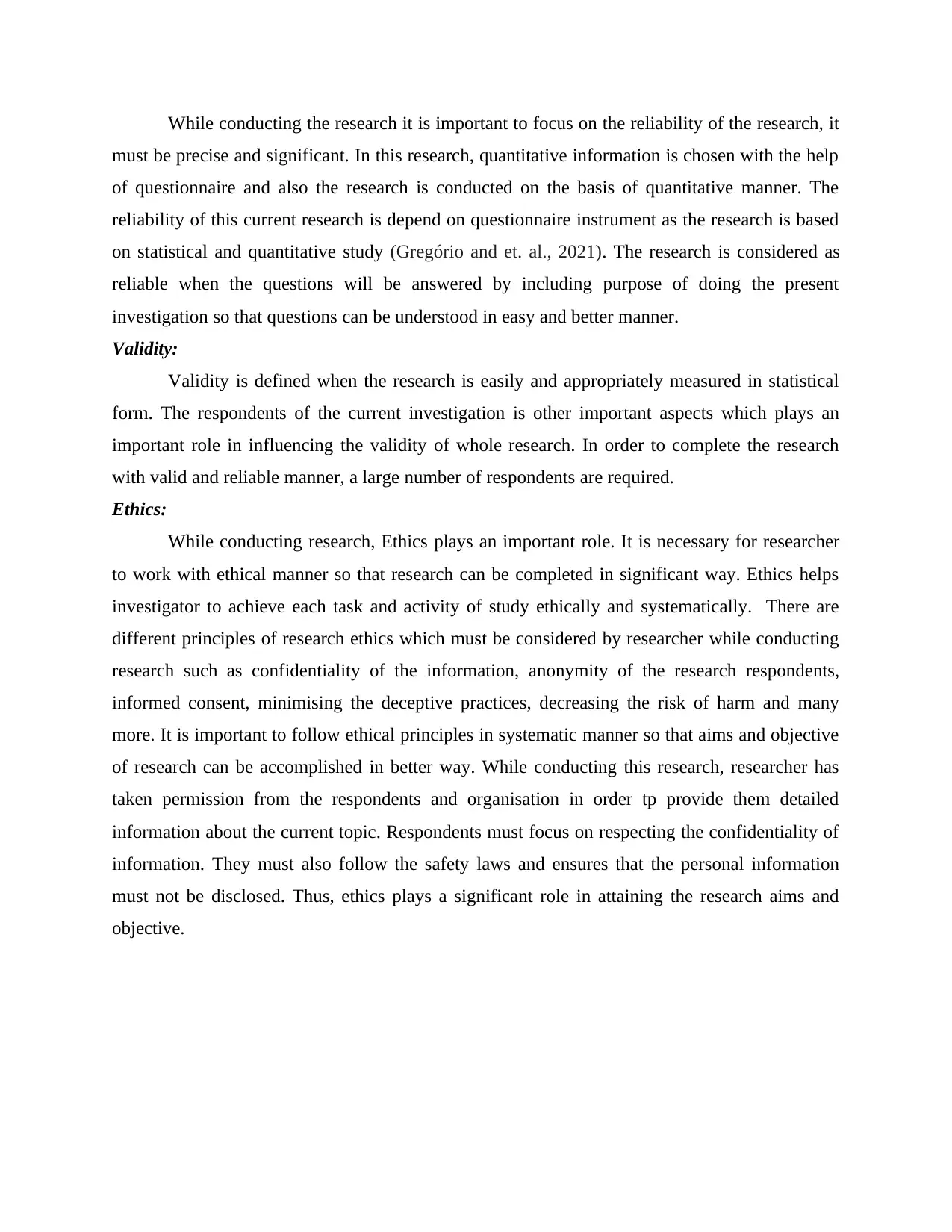
While conducting the research it is important to focus on the reliability of the research, it
must be precise and significant. In this research, quantitative information is chosen with the help
of questionnaire and also the research is conducted on the basis of quantitative manner. The
reliability of this current research is depend on questionnaire instrument as the research is based
on statistical and quantitative study (Gregório and et. al., 2021). The research is considered as
reliable when the questions will be answered by including purpose of doing the present
investigation so that questions can be understood in easy and better manner.
Validity:
Validity is defined when the research is easily and appropriately measured in statistical
form. The respondents of the current investigation is other important aspects which plays an
important role in influencing the validity of whole research. In order to complete the research
with valid and reliable manner, a large number of respondents are required.
Ethics:
While conducting research, Ethics plays an important role. It is necessary for researcher
to work with ethical manner so that research can be completed in significant way. Ethics helps
investigator to achieve each task and activity of study ethically and systematically. There are
different principles of research ethics which must be considered by researcher while conducting
research such as confidentiality of the information, anonymity of the research respondents,
informed consent, minimising the deceptive practices, decreasing the risk of harm and many
more. It is important to follow ethical principles in systematic manner so that aims and objective
of research can be accomplished in better way. While conducting this research, researcher has
taken permission from the respondents and organisation in order tp provide them detailed
information about the current topic. Respondents must focus on respecting the confidentiality of
information. They must also follow the safety laws and ensures that the personal information
must not be disclosed. Thus, ethics plays a significant role in attaining the research aims and
objective.
must be precise and significant. In this research, quantitative information is chosen with the help
of questionnaire and also the research is conducted on the basis of quantitative manner. The
reliability of this current research is depend on questionnaire instrument as the research is based
on statistical and quantitative study (Gregório and et. al., 2021). The research is considered as
reliable when the questions will be answered by including purpose of doing the present
investigation so that questions can be understood in easy and better manner.
Validity:
Validity is defined when the research is easily and appropriately measured in statistical
form. The respondents of the current investigation is other important aspects which plays an
important role in influencing the validity of whole research. In order to complete the research
with valid and reliable manner, a large number of respondents are required.
Ethics:
While conducting research, Ethics plays an important role. It is necessary for researcher
to work with ethical manner so that research can be completed in significant way. Ethics helps
investigator to achieve each task and activity of study ethically and systematically. There are
different principles of research ethics which must be considered by researcher while conducting
research such as confidentiality of the information, anonymity of the research respondents,
informed consent, minimising the deceptive practices, decreasing the risk of harm and many
more. It is important to follow ethical principles in systematic manner so that aims and objective
of research can be accomplished in better way. While conducting this research, researcher has
taken permission from the respondents and organisation in order tp provide them detailed
information about the current topic. Respondents must focus on respecting the confidentiality of
information. They must also follow the safety laws and ensures that the personal information
must not be disclosed. Thus, ethics plays a significant role in attaining the research aims and
objective.
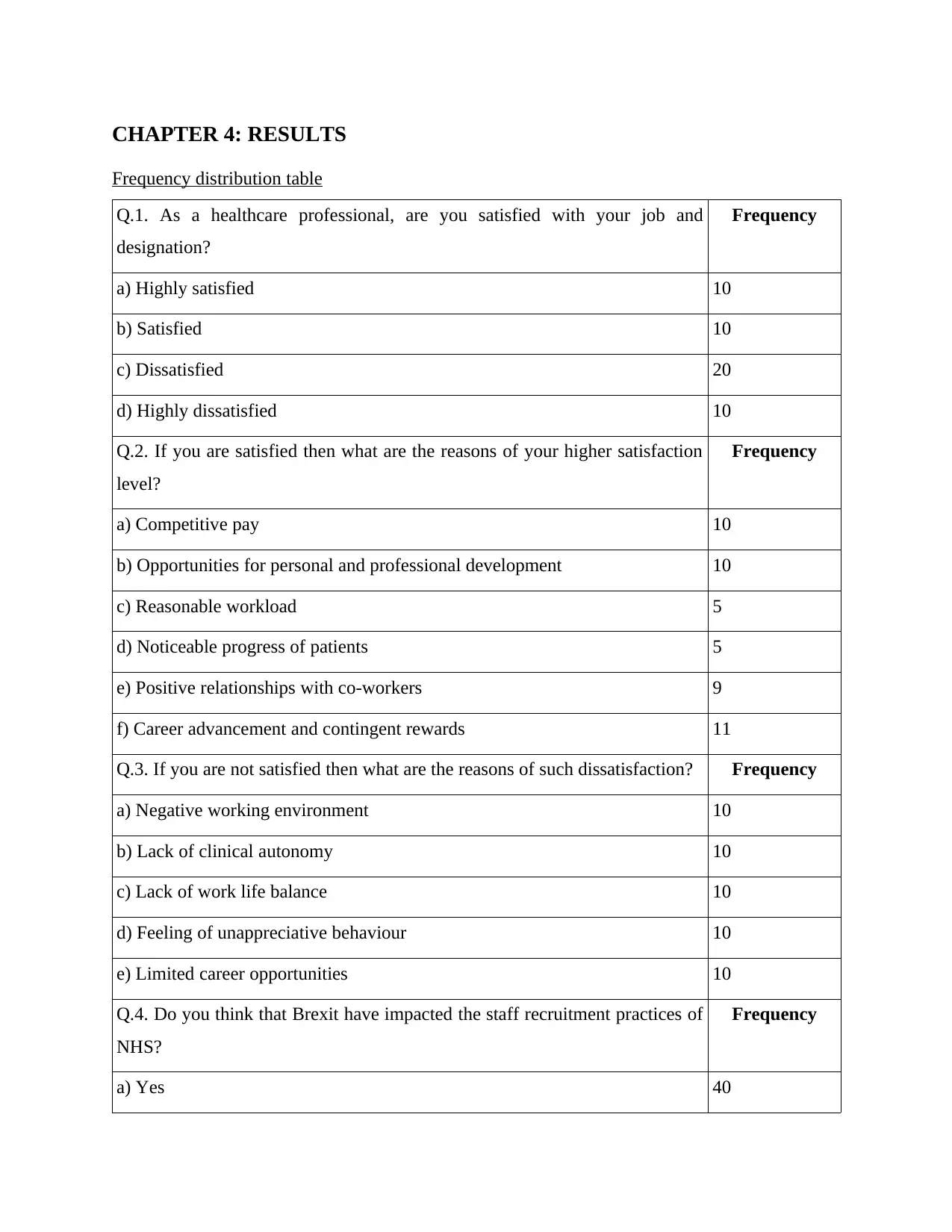
CHAPTER 4: RESULTS
Frequency distribution table
Q.1. As a healthcare professional, are you satisfied with your job and
designation?
Frequency
a) Highly satisfied 10
b) Satisfied 10
c) Dissatisfied 20
d) Highly dissatisfied 10
Q.2. If you are satisfied then what are the reasons of your higher satisfaction
level?
Frequency
a) Competitive pay 10
b) Opportunities for personal and professional development 10
c) Reasonable workload 5
d) Noticeable progress of patients 5
e) Positive relationships with co-workers 9
f) Career advancement and contingent rewards 11
Q.3. If you are not satisfied then what are the reasons of such dissatisfaction? Frequency
a) Negative working environment 10
b) Lack of clinical autonomy 10
c) Lack of work life balance 10
d) Feeling of unappreciative behaviour 10
e) Limited career opportunities 10
Q.4. Do you think that Brexit have impacted the staff recruitment practices of
NHS?
Frequency
a) Yes 40
Frequency distribution table
Q.1. As a healthcare professional, are you satisfied with your job and
designation?
Frequency
a) Highly satisfied 10
b) Satisfied 10
c) Dissatisfied 20
d) Highly dissatisfied 10
Q.2. If you are satisfied then what are the reasons of your higher satisfaction
level?
Frequency
a) Competitive pay 10
b) Opportunities for personal and professional development 10
c) Reasonable workload 5
d) Noticeable progress of patients 5
e) Positive relationships with co-workers 9
f) Career advancement and contingent rewards 11
Q.3. If you are not satisfied then what are the reasons of such dissatisfaction? Frequency
a) Negative working environment 10
b) Lack of clinical autonomy 10
c) Lack of work life balance 10
d) Feeling of unappreciative behaviour 10
e) Limited career opportunities 10
Q.4. Do you think that Brexit have impacted the staff recruitment practices of
NHS?
Frequency
a) Yes 40
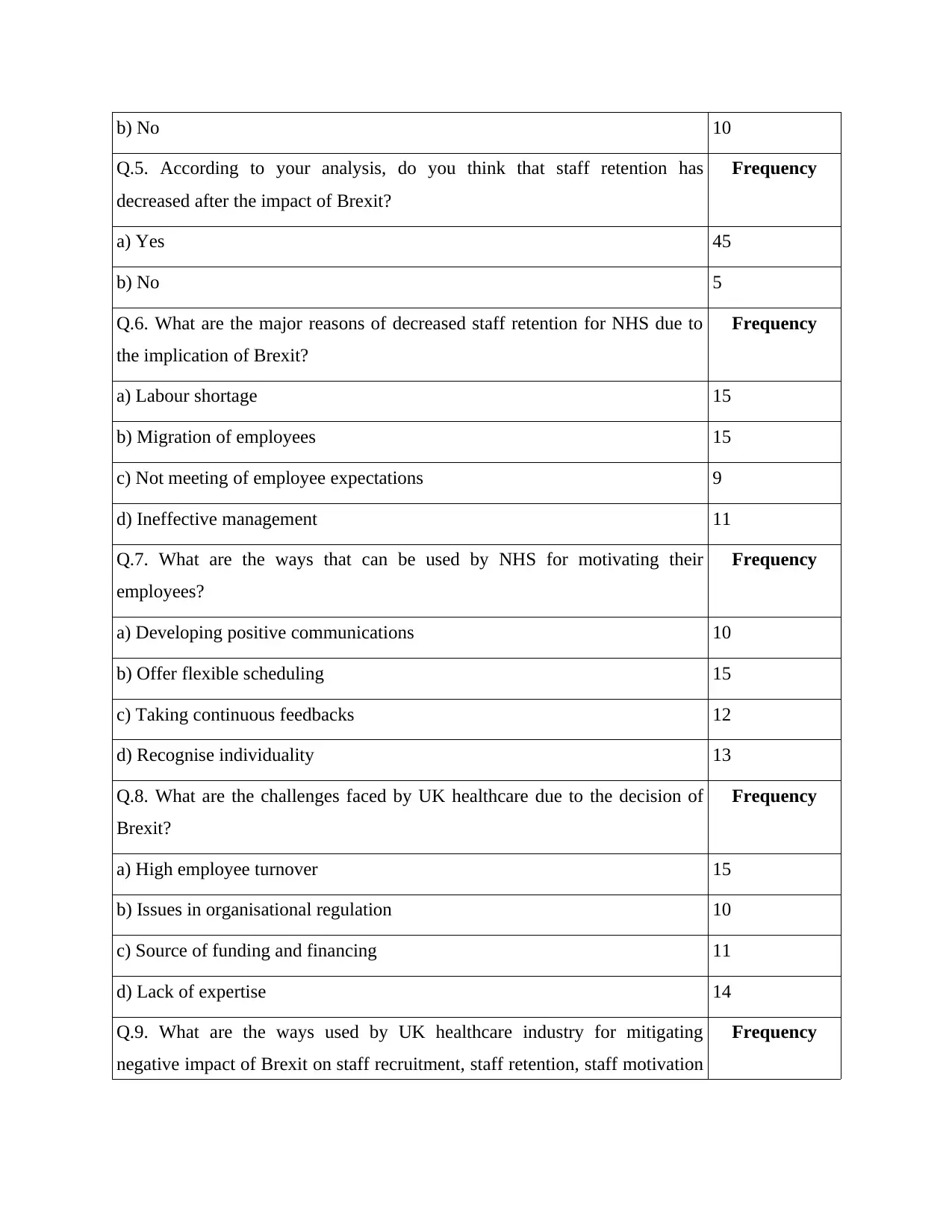
b) No 10
Q.5. According to your analysis, do you think that staff retention has
decreased after the impact of Brexit?
Frequency
a) Yes 45
b) No 5
Q.6. What are the major reasons of decreased staff retention for NHS due to
the implication of Brexit?
Frequency
a) Labour shortage 15
b) Migration of employees 15
c) Not meeting of employee expectations 9
d) Ineffective management 11
Q.7. What are the ways that can be used by NHS for motivating their
employees?
Frequency
a) Developing positive communications 10
b) Offer flexible scheduling 15
c) Taking continuous feedbacks 12
d) Recognise individuality 13
Q.8. What are the challenges faced by UK healthcare due to the decision of
Brexit?
Frequency
a) High employee turnover 15
b) Issues in organisational regulation 10
c) Source of funding and financing 11
d) Lack of expertise 14
Q.9. What are the ways used by UK healthcare industry for mitigating
negative impact of Brexit on staff recruitment, staff retention, staff motivation
Frequency
Q.5. According to your analysis, do you think that staff retention has
decreased after the impact of Brexit?
Frequency
a) Yes 45
b) No 5
Q.6. What are the major reasons of decreased staff retention for NHS due to
the implication of Brexit?
Frequency
a) Labour shortage 15
b) Migration of employees 15
c) Not meeting of employee expectations 9
d) Ineffective management 11
Q.7. What are the ways that can be used by NHS for motivating their
employees?
Frequency
a) Developing positive communications 10
b) Offer flexible scheduling 15
c) Taking continuous feedbacks 12
d) Recognise individuality 13
Q.8. What are the challenges faced by UK healthcare due to the decision of
Brexit?
Frequency
a) High employee turnover 15
b) Issues in organisational regulation 10
c) Source of funding and financing 11
d) Lack of expertise 14
Q.9. What are the ways used by UK healthcare industry for mitigating
negative impact of Brexit on staff recruitment, staff retention, staff motivation
Frequency
Paraphrase This Document
Need a fresh take? Get an instant paraphrase of this document with our AI Paraphraser
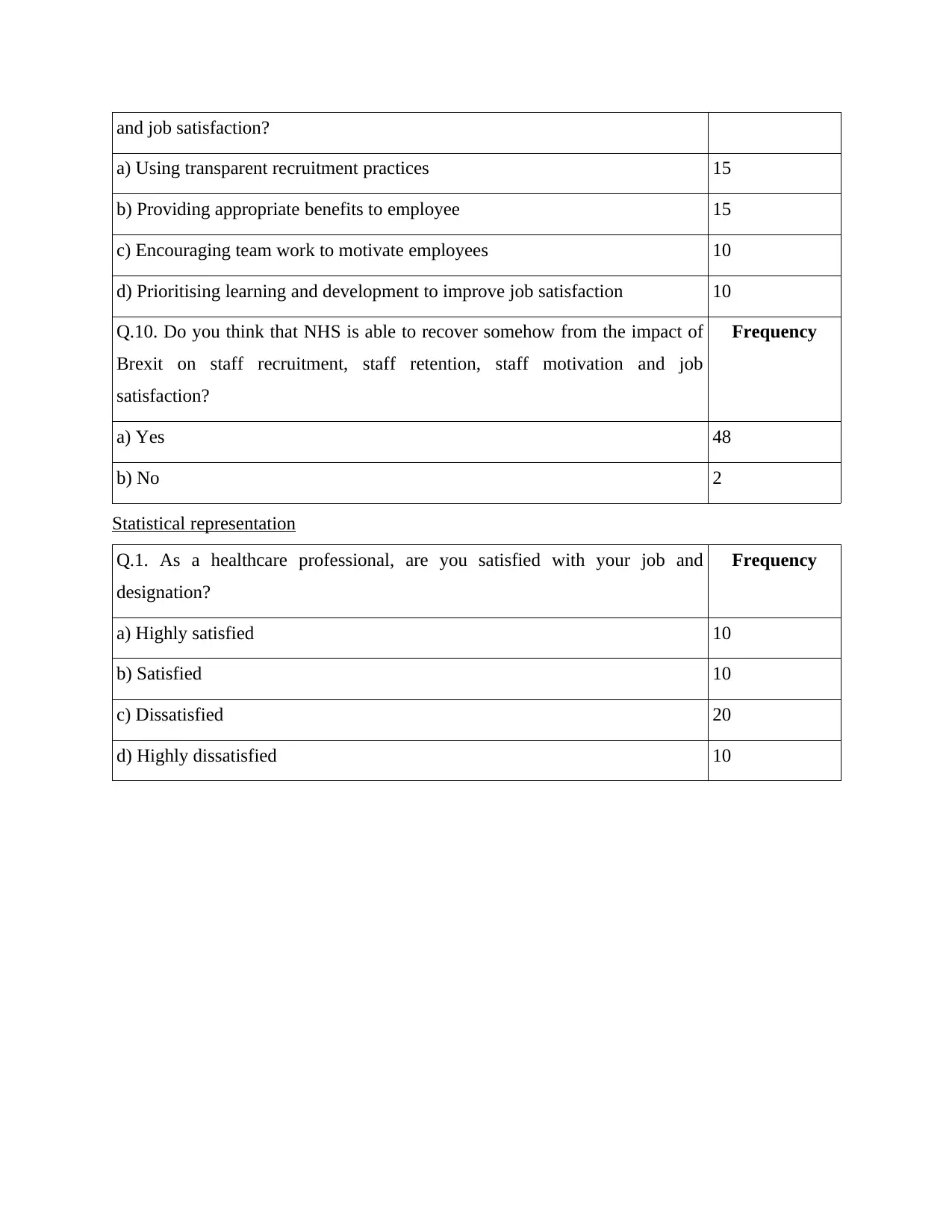
and job satisfaction?
a) Using transparent recruitment practices 15
b) Providing appropriate benefits to employee 15
c) Encouraging team work to motivate employees 10
d) Prioritising learning and development to improve job satisfaction 10
Q.10. Do you think that NHS is able to recover somehow from the impact of
Brexit on staff recruitment, staff retention, staff motivation and job
satisfaction?
Frequency
a) Yes 48
b) No 2
Statistical representation
Q.1. As a healthcare professional, are you satisfied with your job and
designation?
Frequency
a) Highly satisfied 10
b) Satisfied 10
c) Dissatisfied 20
d) Highly dissatisfied 10
a) Using transparent recruitment practices 15
b) Providing appropriate benefits to employee 15
c) Encouraging team work to motivate employees 10
d) Prioritising learning and development to improve job satisfaction 10
Q.10. Do you think that NHS is able to recover somehow from the impact of
Brexit on staff recruitment, staff retention, staff motivation and job
satisfaction?
Frequency
a) Yes 48
b) No 2
Statistical representation
Q.1. As a healthcare professional, are you satisfied with your job and
designation?
Frequency
a) Highly satisfied 10
b) Satisfied 10
c) Dissatisfied 20
d) Highly dissatisfied 10
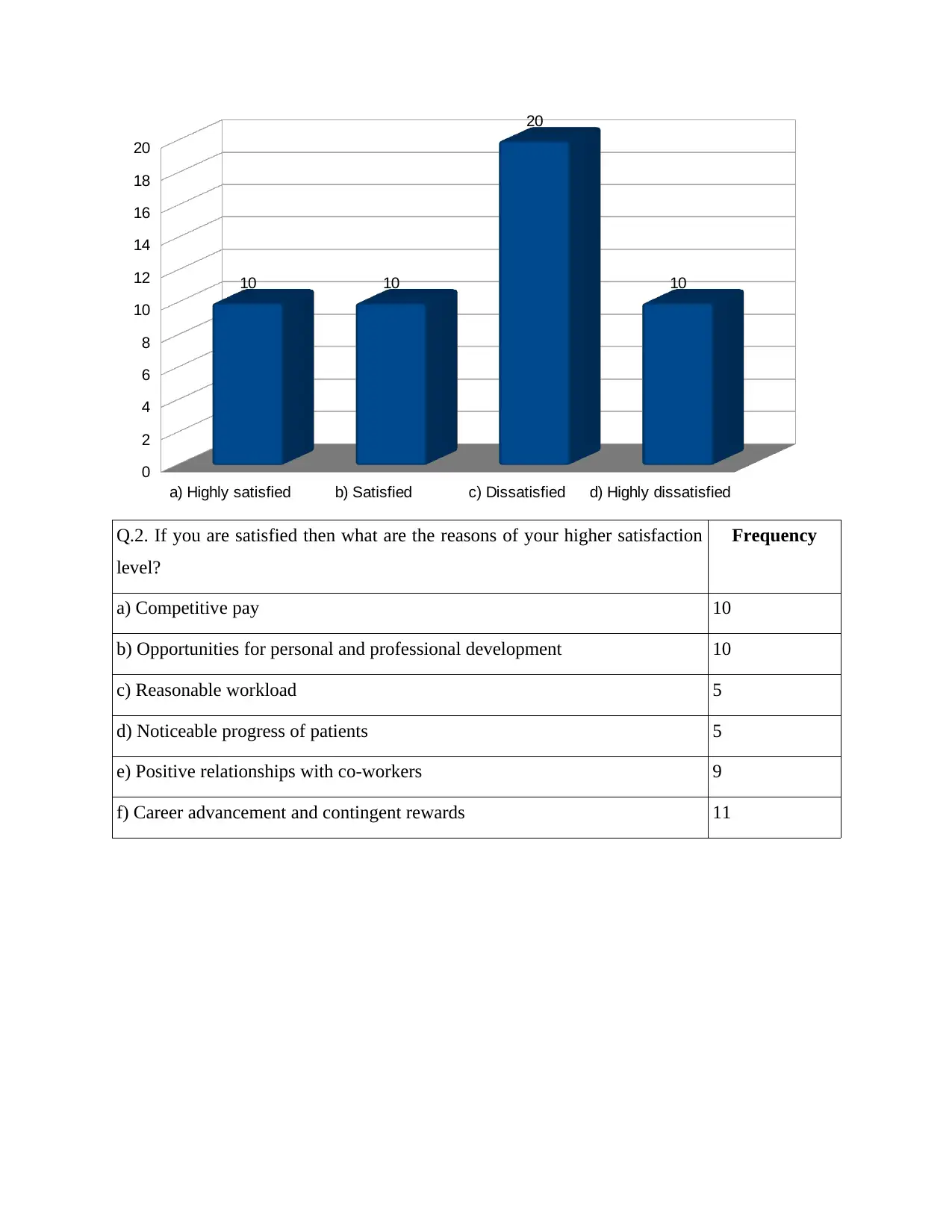
a) Highly satisfied b) Satisfied c) Dissatisfied d) Highly dissatisfied
0
2
4
6
8
10
12
14
16
18
20
10 10
20
10
Q.2. If you are satisfied then what are the reasons of your higher satisfaction
level?
Frequency
a) Competitive pay 10
b) Opportunities for personal and professional development 10
c) Reasonable workload 5
d) Noticeable progress of patients 5
e) Positive relationships with co-workers 9
f) Career advancement and contingent rewards 11
0
2
4
6
8
10
12
14
16
18
20
10 10
20
10
Q.2. If you are satisfied then what are the reasons of your higher satisfaction
level?
Frequency
a) Competitive pay 10
b) Opportunities for personal and professional development 10
c) Reasonable workload 5
d) Noticeable progress of patients 5
e) Positive relationships with co-workers 9
f) Career advancement and contingent rewards 11
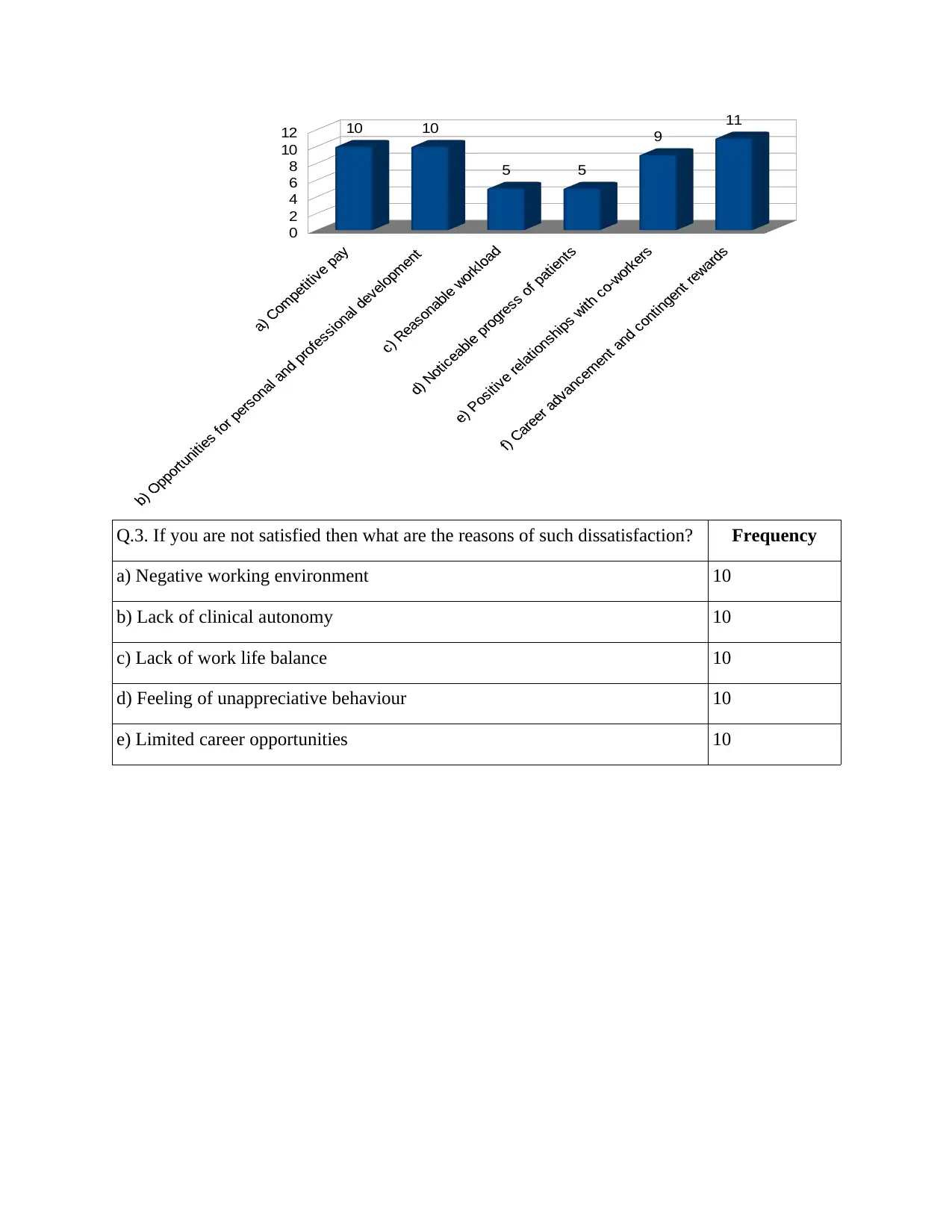
0
2
4
6
8
10
12 10 10
5 5
9
11
Q.3. If you are not satisfied then what are the reasons of such dissatisfaction? Frequency
a) Negative working environment 10
b) Lack of clinical autonomy 10
c) Lack of work life balance 10
d) Feeling of unappreciative behaviour 10
e) Limited career opportunities 10
2
4
6
8
10
12 10 10
5 5
9
11
Q.3. If you are not satisfied then what are the reasons of such dissatisfaction? Frequency
a) Negative working environment 10
b) Lack of clinical autonomy 10
c) Lack of work life balance 10
d) Feeling of unappreciative behaviour 10
e) Limited career opportunities 10
Secure Best Marks with AI Grader
Need help grading? Try our AI Grader for instant feedback on your assignments.
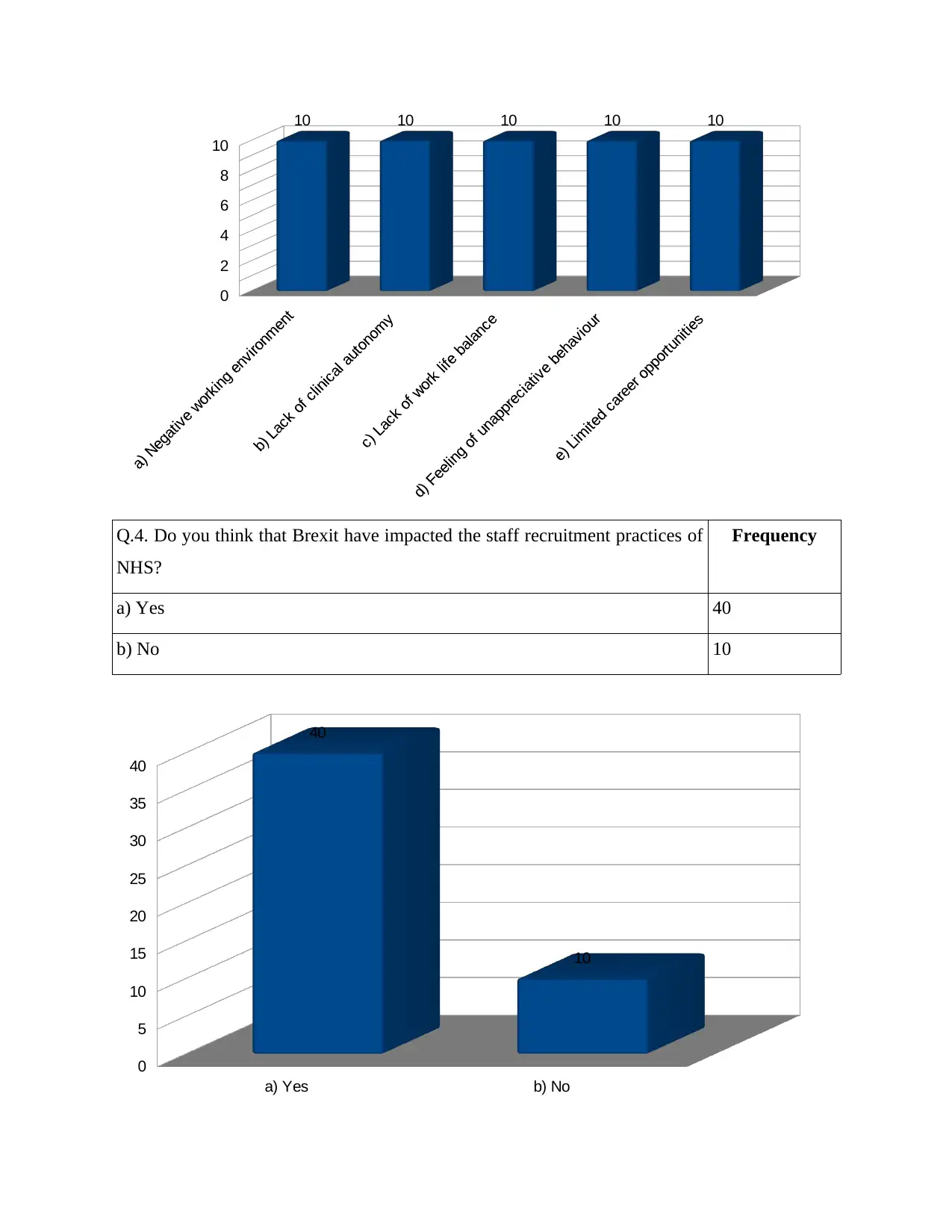
0
2
4
6
8
10
10 10 10 10 10
Q.4. Do you think that Brexit have impacted the staff recruitment practices of
NHS?
Frequency
a) Yes 40
b) No 10
a) Yes b) No
0
5
10
15
20
25
30
35
40
40
10
2
4
6
8
10
10 10 10 10 10
Q.4. Do you think that Brexit have impacted the staff recruitment practices of
NHS?
Frequency
a) Yes 40
b) No 10
a) Yes b) No
0
5
10
15
20
25
30
35
40
40
10
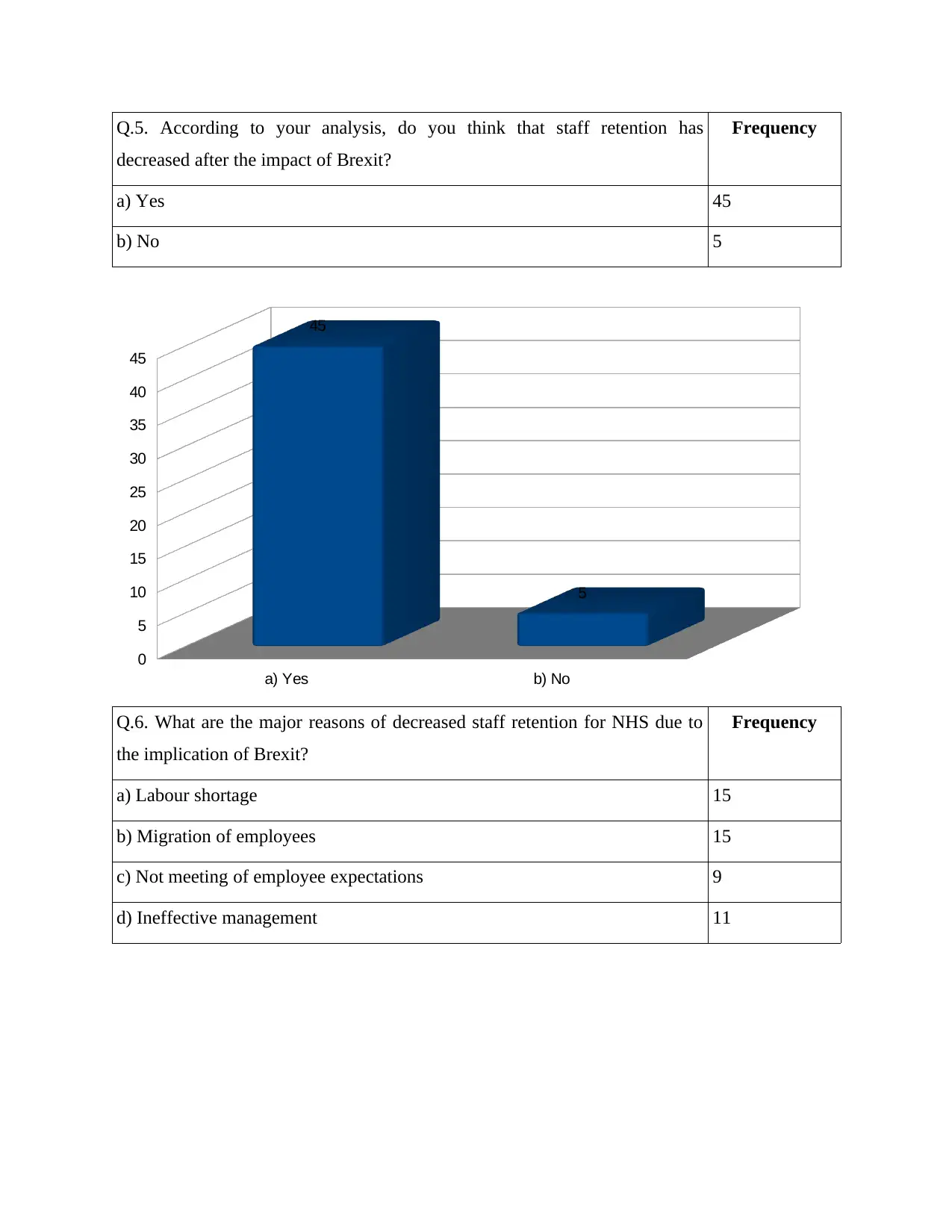
Q.5. According to your analysis, do you think that staff retention has
decreased after the impact of Brexit?
Frequency
a) Yes 45
b) No 5
a) Yes b) No
0
5
10
15
20
25
30
35
40
45
45
5
Q.6. What are the major reasons of decreased staff retention for NHS due to
the implication of Brexit?
Frequency
a) Labour shortage 15
b) Migration of employees 15
c) Not meeting of employee expectations 9
d) Ineffective management 11
decreased after the impact of Brexit?
Frequency
a) Yes 45
b) No 5
a) Yes b) No
0
5
10
15
20
25
30
35
40
45
45
5
Q.6. What are the major reasons of decreased staff retention for NHS due to
the implication of Brexit?
Frequency
a) Labour shortage 15
b) Migration of employees 15
c) Not meeting of employee expectations 9
d) Ineffective management 11
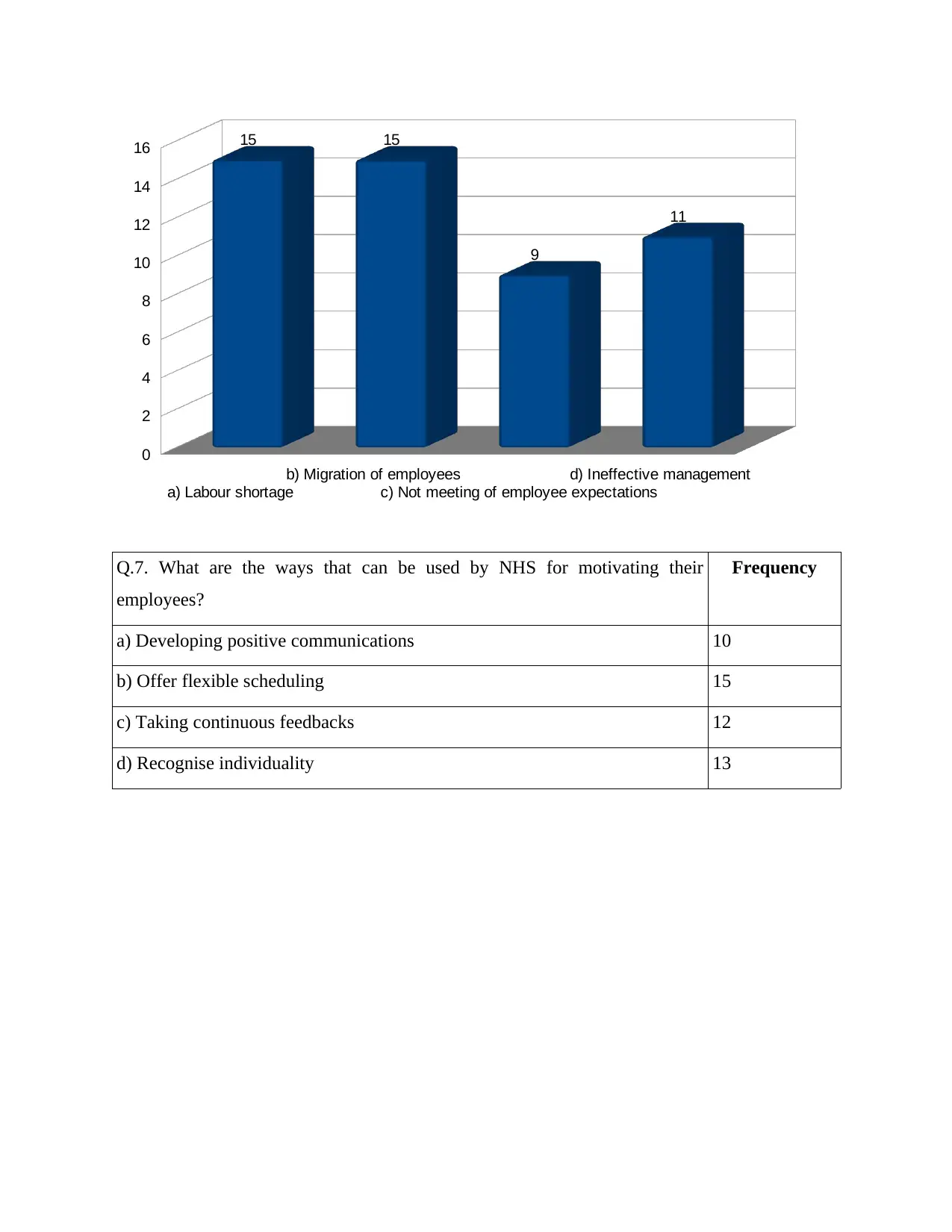
a) Labour shortage
b) Migration of employees
c) Not meeting of employee expectations
d) Ineffective management
0
2
4
6
8
10
12
14
16 15 15
9
11
Q.7. What are the ways that can be used by NHS for motivating their
employees?
Frequency
a) Developing positive communications 10
b) Offer flexible scheduling 15
c) Taking continuous feedbacks 12
d) Recognise individuality 13
b) Migration of employees
c) Not meeting of employee expectations
d) Ineffective management
0
2
4
6
8
10
12
14
16 15 15
9
11
Q.7. What are the ways that can be used by NHS for motivating their
employees?
Frequency
a) Developing positive communications 10
b) Offer flexible scheduling 15
c) Taking continuous feedbacks 12
d) Recognise individuality 13
Paraphrase This Document
Need a fresh take? Get an instant paraphrase of this document with our AI Paraphraser
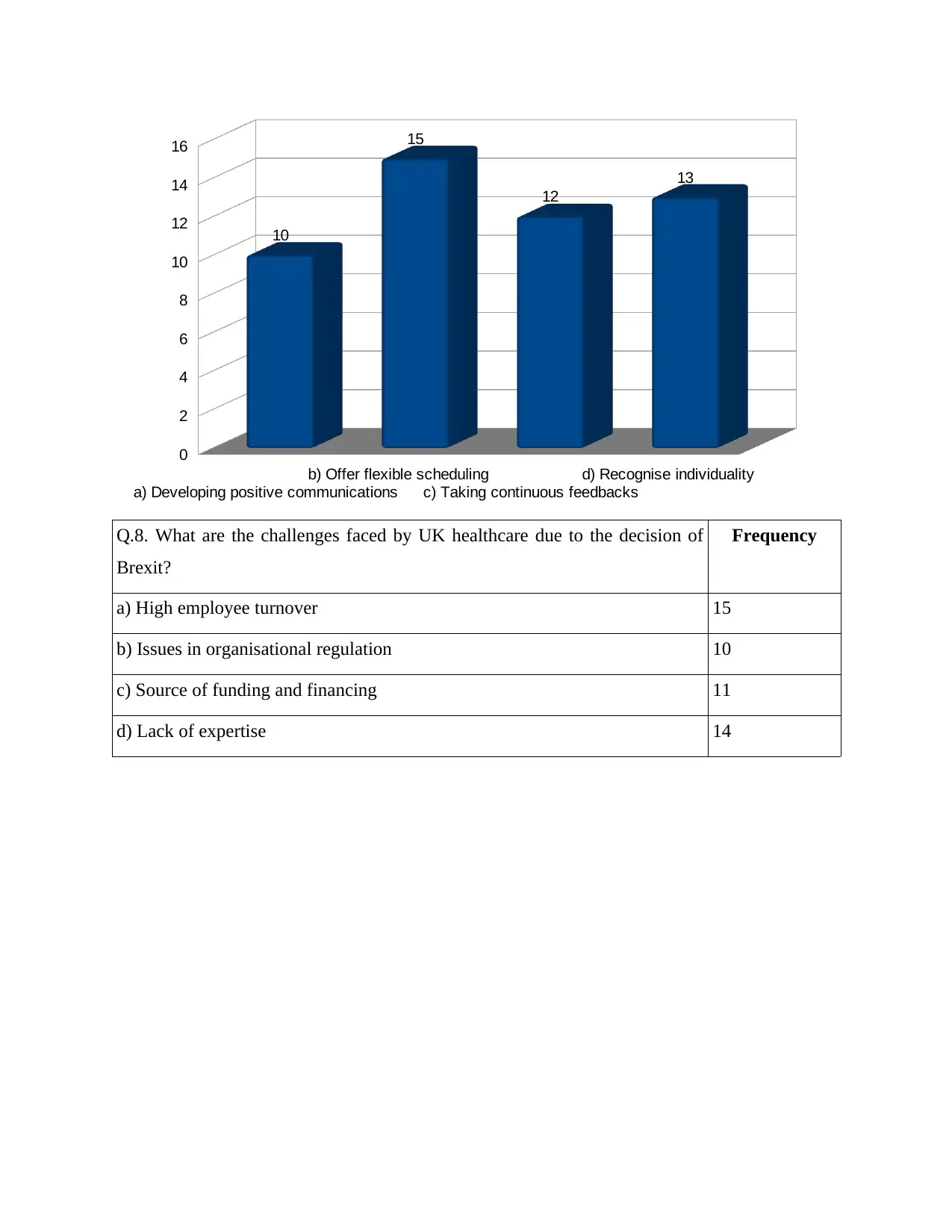
a) Developing positive communications
b) Offer flexible scheduling
c) Taking continuous feedbacks
d) Recognise individuality
0
2
4
6
8
10
12
14
16
10
15
12
13
Q.8. What are the challenges faced by UK healthcare due to the decision of
Brexit?
Frequency
a) High employee turnover 15
b) Issues in organisational regulation 10
c) Source of funding and financing 11
d) Lack of expertise 14
b) Offer flexible scheduling
c) Taking continuous feedbacks
d) Recognise individuality
0
2
4
6
8
10
12
14
16
10
15
12
13
Q.8. What are the challenges faced by UK healthcare due to the decision of
Brexit?
Frequency
a) High employee turnover 15
b) Issues in organisational regulation 10
c) Source of funding and financing 11
d) Lack of expertise 14
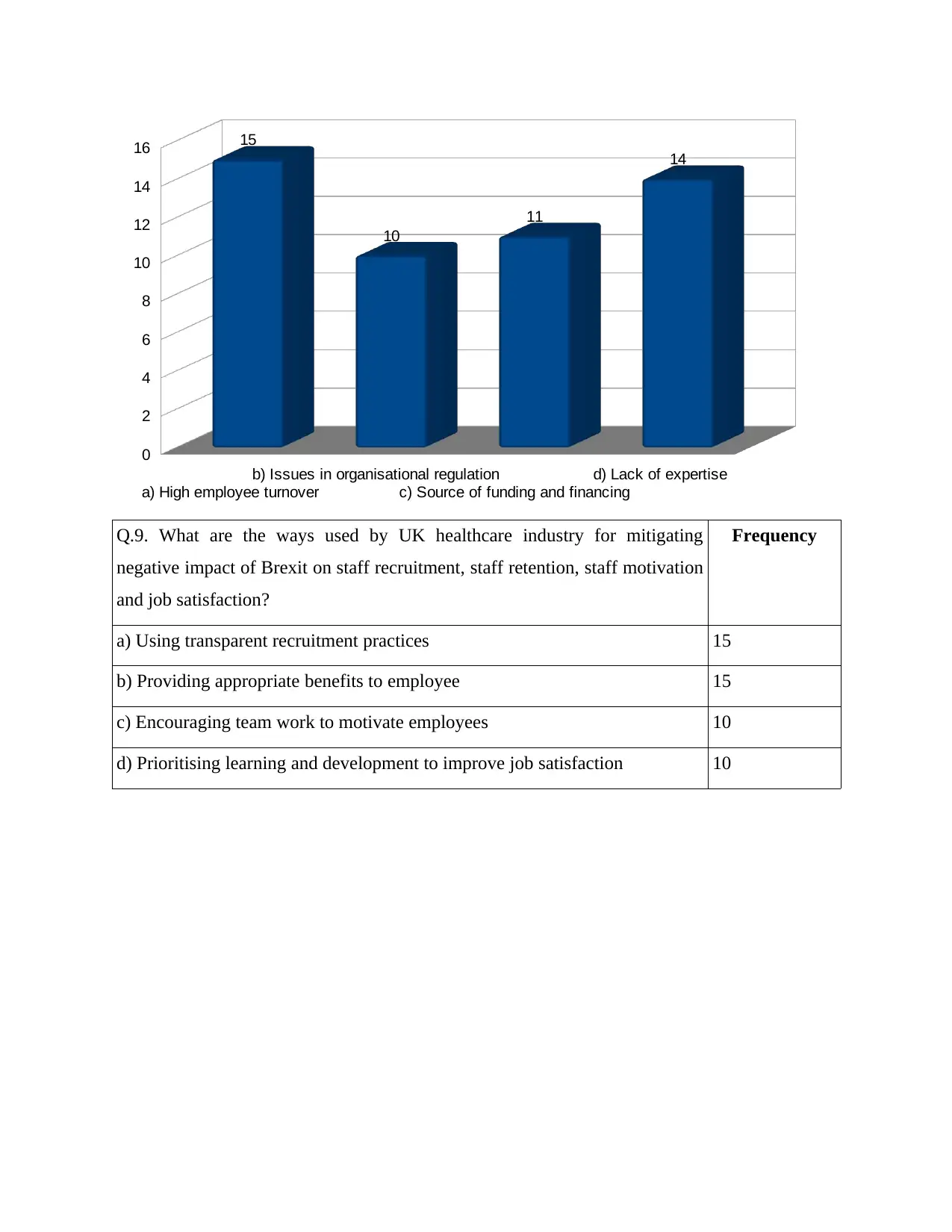
a) High employee turnover
b) Issues in organisational regulation
c) Source of funding and financing
d) Lack of expertise
0
2
4
6
8
10
12
14
16 15
10
11
14
Q.9. What are the ways used by UK healthcare industry for mitigating
negative impact of Brexit on staff recruitment, staff retention, staff motivation
and job satisfaction?
Frequency
a) Using transparent recruitment practices 15
b) Providing appropriate benefits to employee 15
c) Encouraging team work to motivate employees 10
d) Prioritising learning and development to improve job satisfaction 10
b) Issues in organisational regulation
c) Source of funding and financing
d) Lack of expertise
0
2
4
6
8
10
12
14
16 15
10
11
14
Q.9. What are the ways used by UK healthcare industry for mitigating
negative impact of Brexit on staff recruitment, staff retention, staff motivation
and job satisfaction?
Frequency
a) Using transparent recruitment practices 15
b) Providing appropriate benefits to employee 15
c) Encouraging team work to motivate employees 10
d) Prioritising learning and development to improve job satisfaction 10
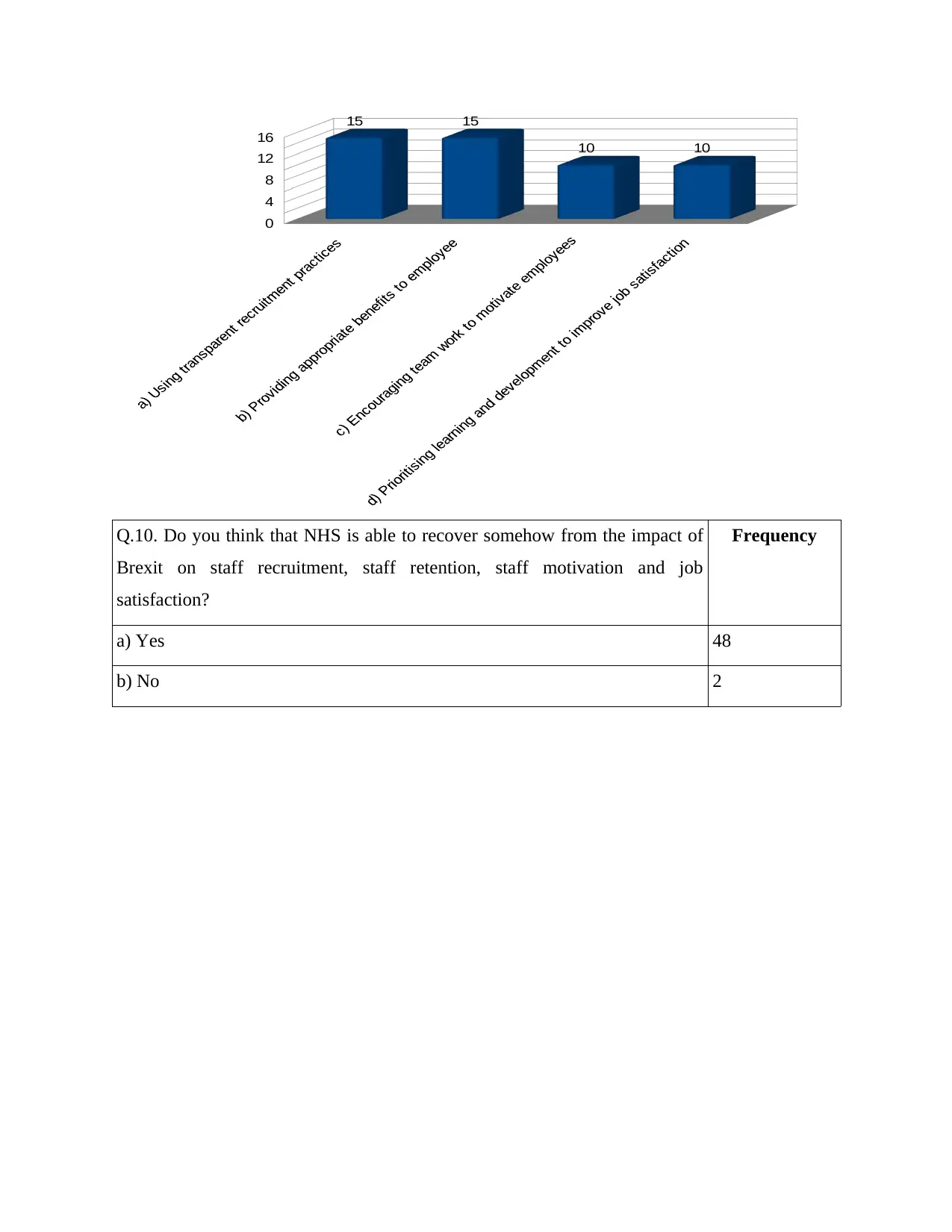
0
4
8
12
16
15 15
10 10
Q.10. Do you think that NHS is able to recover somehow from the impact of
Brexit on staff recruitment, staff retention, staff motivation and job
satisfaction?
Frequency
a) Yes 48
b) No 2
4
8
12
16
15 15
10 10
Q.10. Do you think that NHS is able to recover somehow from the impact of
Brexit on staff recruitment, staff retention, staff motivation and job
satisfaction?
Frequency
a) Yes 48
b) No 2
Secure Best Marks with AI Grader
Need help grading? Try our AI Grader for instant feedback on your assignments.

a) Yes b) No
0
5
10
15
20
25
30
35
40
45
50
48
2
0
5
10
15
20
25
30
35
40
45
50
48
2
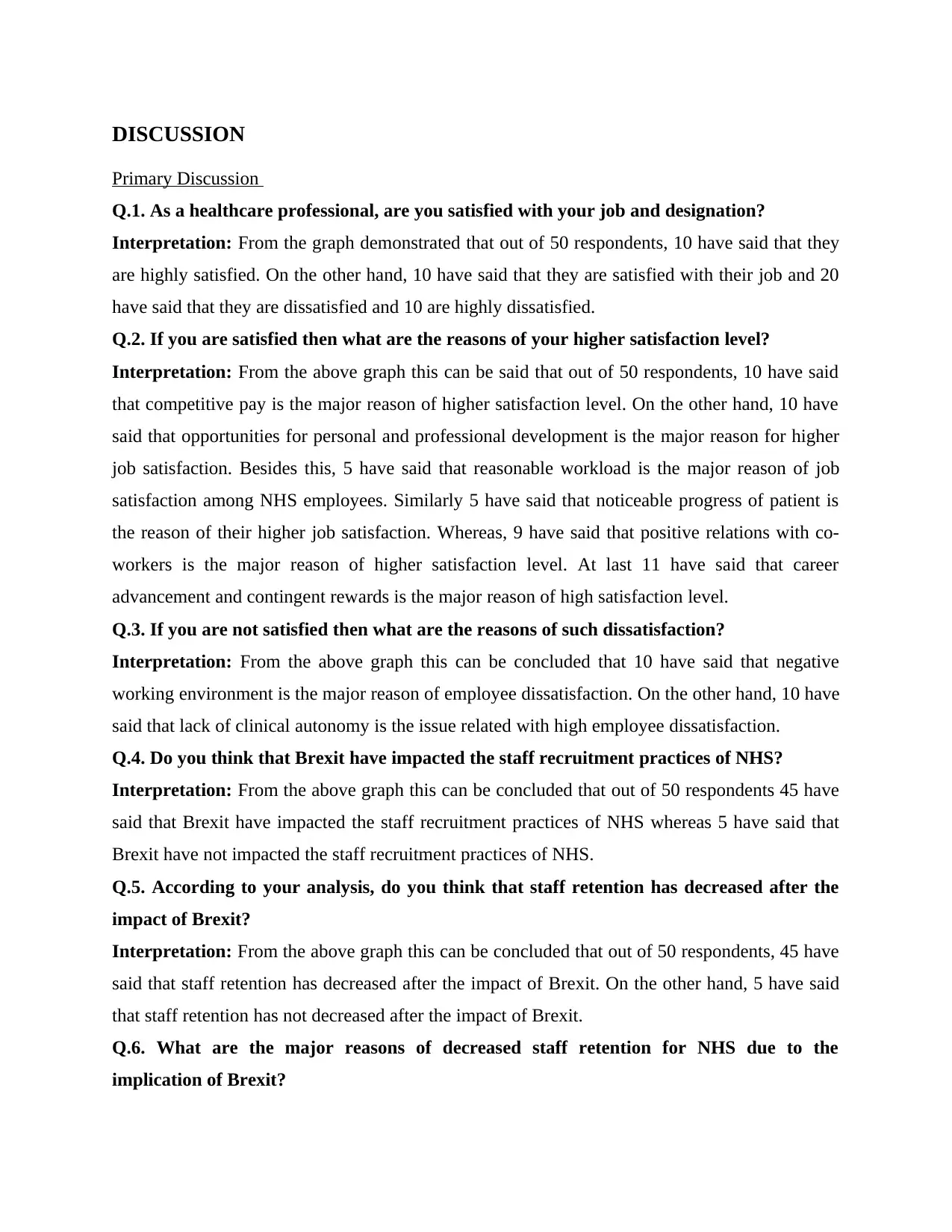
DISCUSSION
Primary Discussion
Q.1. As a healthcare professional, are you satisfied with your job and designation?
Interpretation: From the graph demonstrated that out of 50 respondents, 10 have said that they
are highly satisfied. On the other hand, 10 have said that they are satisfied with their job and 20
have said that they are dissatisfied and 10 are highly dissatisfied.
Q.2. If you are satisfied then what are the reasons of your higher satisfaction level?
Interpretation: From the above graph this can be said that out of 50 respondents, 10 have said
that competitive pay is the major reason of higher satisfaction level. On the other hand, 10 have
said that opportunities for personal and professional development is the major reason for higher
job satisfaction. Besides this, 5 have said that reasonable workload is the major reason of job
satisfaction among NHS employees. Similarly 5 have said that noticeable progress of patient is
the reason of their higher job satisfaction. Whereas, 9 have said that positive relations with co-
workers is the major reason of higher satisfaction level. At last 11 have said that career
advancement and contingent rewards is the major reason of high satisfaction level.
Q.3. If you are not satisfied then what are the reasons of such dissatisfaction?
Interpretation: From the above graph this can be concluded that 10 have said that negative
working environment is the major reason of employee dissatisfaction. On the other hand, 10 have
said that lack of clinical autonomy is the issue related with high employee dissatisfaction.
Q.4. Do you think that Brexit have impacted the staff recruitment practices of NHS?
Interpretation: From the above graph this can be concluded that out of 50 respondents 45 have
said that Brexit have impacted the staff recruitment practices of NHS whereas 5 have said that
Brexit have not impacted the staff recruitment practices of NHS.
Q.5. According to your analysis, do you think that staff retention has decreased after the
impact of Brexit?
Interpretation: From the above graph this can be concluded that out of 50 respondents, 45 have
said that staff retention has decreased after the impact of Brexit. On the other hand, 5 have said
that staff retention has not decreased after the impact of Brexit.
Q.6. What are the major reasons of decreased staff retention for NHS due to the
implication of Brexit?
Primary Discussion
Q.1. As a healthcare professional, are you satisfied with your job and designation?
Interpretation: From the graph demonstrated that out of 50 respondents, 10 have said that they
are highly satisfied. On the other hand, 10 have said that they are satisfied with their job and 20
have said that they are dissatisfied and 10 are highly dissatisfied.
Q.2. If you are satisfied then what are the reasons of your higher satisfaction level?
Interpretation: From the above graph this can be said that out of 50 respondents, 10 have said
that competitive pay is the major reason of higher satisfaction level. On the other hand, 10 have
said that opportunities for personal and professional development is the major reason for higher
job satisfaction. Besides this, 5 have said that reasonable workload is the major reason of job
satisfaction among NHS employees. Similarly 5 have said that noticeable progress of patient is
the reason of their higher job satisfaction. Whereas, 9 have said that positive relations with co-
workers is the major reason of higher satisfaction level. At last 11 have said that career
advancement and contingent rewards is the major reason of high satisfaction level.
Q.3. If you are not satisfied then what are the reasons of such dissatisfaction?
Interpretation: From the above graph this can be concluded that 10 have said that negative
working environment is the major reason of employee dissatisfaction. On the other hand, 10 have
said that lack of clinical autonomy is the issue related with high employee dissatisfaction.
Q.4. Do you think that Brexit have impacted the staff recruitment practices of NHS?
Interpretation: From the above graph this can be concluded that out of 50 respondents 45 have
said that Brexit have impacted the staff recruitment practices of NHS whereas 5 have said that
Brexit have not impacted the staff recruitment practices of NHS.
Q.5. According to your analysis, do you think that staff retention has decreased after the
impact of Brexit?
Interpretation: From the above graph this can be concluded that out of 50 respondents, 45 have
said that staff retention has decreased after the impact of Brexit. On the other hand, 5 have said
that staff retention has not decreased after the impact of Brexit.
Q.6. What are the major reasons of decreased staff retention for NHS due to the
implication of Brexit?
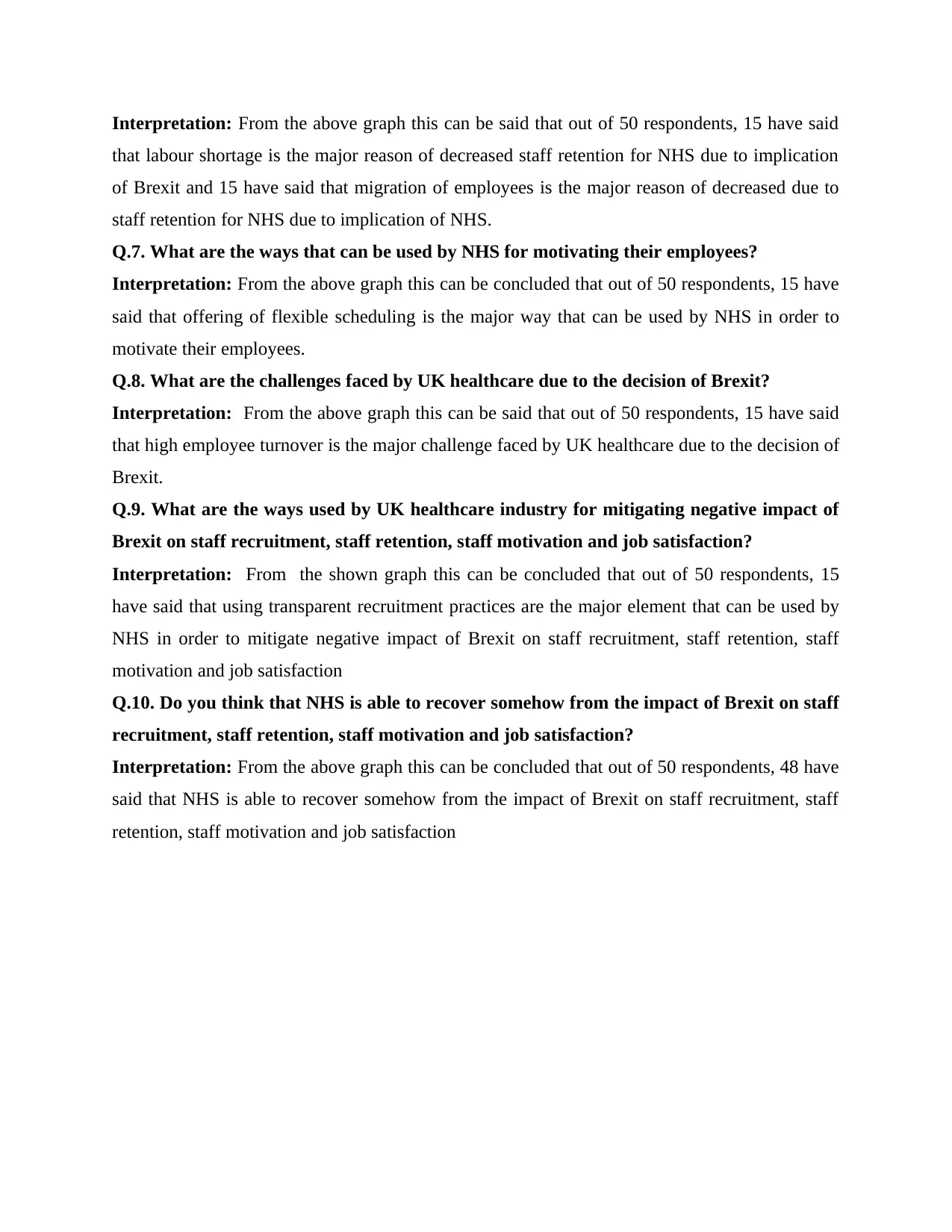
Interpretation: From the above graph this can be said that out of 50 respondents, 15 have said
that labour shortage is the major reason of decreased staff retention for NHS due to implication
of Brexit and 15 have said that migration of employees is the major reason of decreased due to
staff retention for NHS due to implication of NHS.
Q.7. What are the ways that can be used by NHS for motivating their employees?
Interpretation: From the above graph this can be concluded that out of 50 respondents, 15 have
said that offering of flexible scheduling is the major way that can be used by NHS in order to
motivate their employees.
Q.8. What are the challenges faced by UK healthcare due to the decision of Brexit?
Interpretation: From the above graph this can be said that out of 50 respondents, 15 have said
that high employee turnover is the major challenge faced by UK healthcare due to the decision of
Brexit.
Q.9. What are the ways used by UK healthcare industry for mitigating negative impact of
Brexit on staff recruitment, staff retention, staff motivation and job satisfaction?
Interpretation: From the shown graph this can be concluded that out of 50 respondents, 15
have said that using transparent recruitment practices are the major element that can be used by
NHS in order to mitigate negative impact of Brexit on staff recruitment, staff retention, staff
motivation and job satisfaction
Q.10. Do you think that NHS is able to recover somehow from the impact of Brexit on staff
recruitment, staff retention, staff motivation and job satisfaction?
Interpretation: From the above graph this can be concluded that out of 50 respondents, 48 have
said that NHS is able to recover somehow from the impact of Brexit on staff recruitment, staff
retention, staff motivation and job satisfaction
that labour shortage is the major reason of decreased staff retention for NHS due to implication
of Brexit and 15 have said that migration of employees is the major reason of decreased due to
staff retention for NHS due to implication of NHS.
Q.7. What are the ways that can be used by NHS for motivating their employees?
Interpretation: From the above graph this can be concluded that out of 50 respondents, 15 have
said that offering of flexible scheduling is the major way that can be used by NHS in order to
motivate their employees.
Q.8. What are the challenges faced by UK healthcare due to the decision of Brexit?
Interpretation: From the above graph this can be said that out of 50 respondents, 15 have said
that high employee turnover is the major challenge faced by UK healthcare due to the decision of
Brexit.
Q.9. What are the ways used by UK healthcare industry for mitigating negative impact of
Brexit on staff recruitment, staff retention, staff motivation and job satisfaction?
Interpretation: From the shown graph this can be concluded that out of 50 respondents, 15
have said that using transparent recruitment practices are the major element that can be used by
NHS in order to mitigate negative impact of Brexit on staff recruitment, staff retention, staff
motivation and job satisfaction
Q.10. Do you think that NHS is able to recover somehow from the impact of Brexit on staff
recruitment, staff retention, staff motivation and job satisfaction?
Interpretation: From the above graph this can be concluded that out of 50 respondents, 48 have
said that NHS is able to recover somehow from the impact of Brexit on staff recruitment, staff
retention, staff motivation and job satisfaction
Paraphrase This Document
Need a fresh take? Get an instant paraphrase of this document with our AI Paraphraser
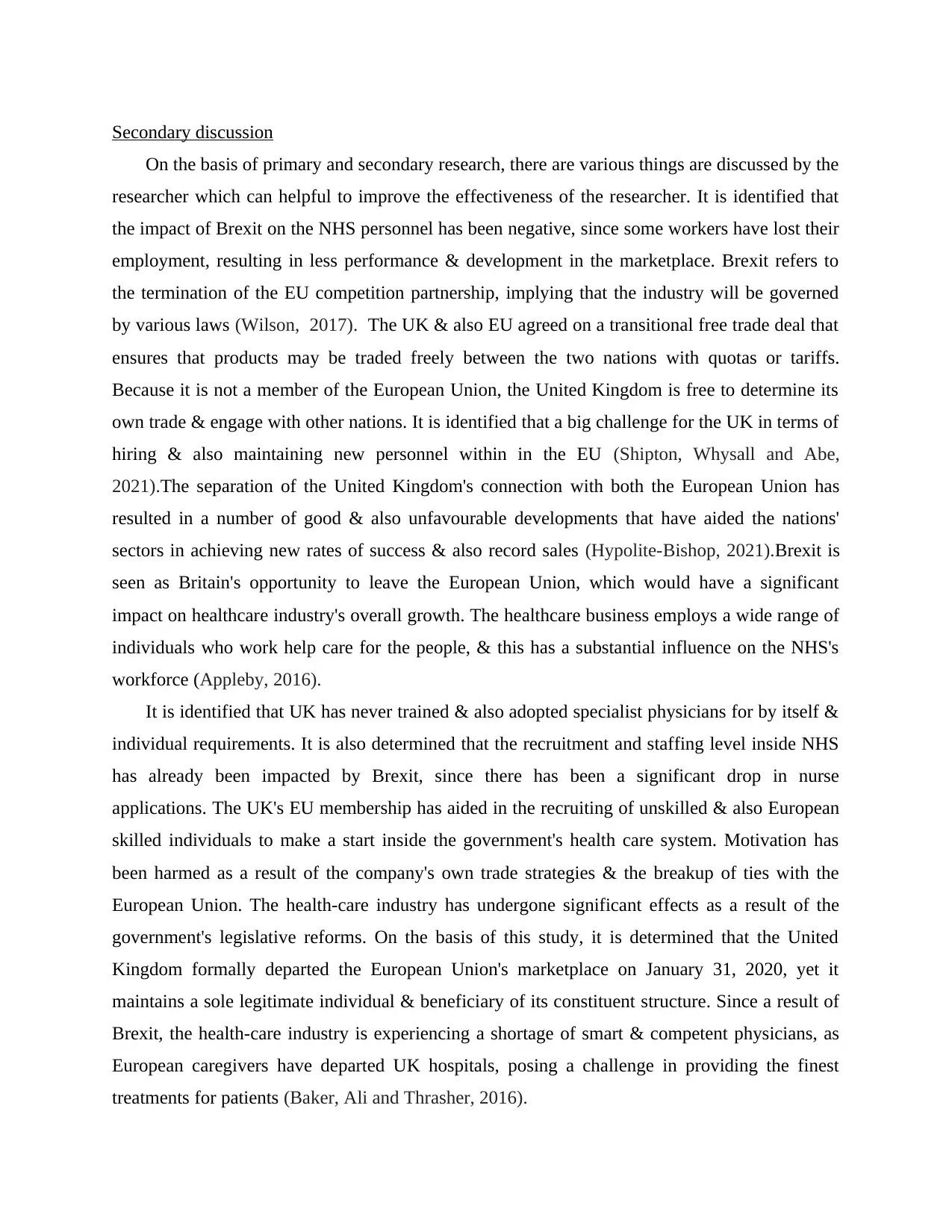
Secondary discussion
On the basis of primary and secondary research, there are various things are discussed by the
researcher which can helpful to improve the effectiveness of the researcher. It is identified that
the impact of Brexit on the NHS personnel has been negative, since some workers have lost their
employment, resulting in less performance & development in the marketplace. Brexit refers to
the termination of the EU competition partnership, implying that the industry will be governed
by various laws (Wilson, 2017). The UK & also EU agreed on a transitional free trade deal that
ensures that products may be traded freely between the two nations with quotas or tariffs.
Because it is not a member of the European Union, the United Kingdom is free to determine its
own trade & engage with other nations. It is identified that a big challenge for the UK in terms of
hiring & also maintaining new personnel within in the EU (Shipton, Whysall and Abe,
2021).The separation of the United Kingdom's connection with both the European Union has
resulted in a number of good & also unfavourable developments that have aided the nations'
sectors in achieving new rates of success & also record sales (Hypolite-Bishop, 2021).Brexit is
seen as Britain's opportunity to leave the European Union, which would have a significant
impact on healthcare industry's overall growth. The healthcare business employs a wide range of
individuals who work help care for the people, & this has a substantial influence on the NHS's
workforce (Appleby, 2016).
It is identified that UK has never trained & also adopted specialist physicians for by itself &
individual requirements. It is also determined that the recruitment and staffing level inside NHS
has already been impacted by Brexit, since there has been a significant drop in nurse
applications. The UK's EU membership has aided in the recruiting of unskilled & also European
skilled individuals to make a start inside the government's health care system. Motivation has
been harmed as a result of the company's own trade strategies & the breakup of ties with the
European Union. The health-care industry has undergone significant effects as a result of the
government's legislative reforms. On the basis of this study, it is determined that the United
Kingdom formally departed the European Union's marketplace on January 31, 2020, yet it
maintains a sole legitimate individual & beneficiary of its constituent structure. Since a result of
Brexit, the health-care industry is experiencing a shortage of smart & competent physicians, as
European caregivers have departed UK hospitals, posing a challenge in providing the finest
treatments for patients (Baker, Ali and Thrasher, 2016).
On the basis of primary and secondary research, there are various things are discussed by the
researcher which can helpful to improve the effectiveness of the researcher. It is identified that
the impact of Brexit on the NHS personnel has been negative, since some workers have lost their
employment, resulting in less performance & development in the marketplace. Brexit refers to
the termination of the EU competition partnership, implying that the industry will be governed
by various laws (Wilson, 2017). The UK & also EU agreed on a transitional free trade deal that
ensures that products may be traded freely between the two nations with quotas or tariffs.
Because it is not a member of the European Union, the United Kingdom is free to determine its
own trade & engage with other nations. It is identified that a big challenge for the UK in terms of
hiring & also maintaining new personnel within in the EU (Shipton, Whysall and Abe,
2021).The separation of the United Kingdom's connection with both the European Union has
resulted in a number of good & also unfavourable developments that have aided the nations'
sectors in achieving new rates of success & also record sales (Hypolite-Bishop, 2021).Brexit is
seen as Britain's opportunity to leave the European Union, which would have a significant
impact on healthcare industry's overall growth. The healthcare business employs a wide range of
individuals who work help care for the people, & this has a substantial influence on the NHS's
workforce (Appleby, 2016).
It is identified that UK has never trained & also adopted specialist physicians for by itself &
individual requirements. It is also determined that the recruitment and staffing level inside NHS
has already been impacted by Brexit, since there has been a significant drop in nurse
applications. The UK's EU membership has aided in the recruiting of unskilled & also European
skilled individuals to make a start inside the government's health care system. Motivation has
been harmed as a result of the company's own trade strategies & the breakup of ties with the
European Union. The health-care industry has undergone significant effects as a result of the
government's legislative reforms. On the basis of this study, it is determined that the United
Kingdom formally departed the European Union's marketplace on January 31, 2020, yet it
maintains a sole legitimate individual & beneficiary of its constituent structure. Since a result of
Brexit, the health-care industry is experiencing a shortage of smart & competent physicians, as
European caregivers have departed UK hospitals, posing a challenge in providing the finest
treatments for patients (Baker, Ali and Thrasher, 2016).
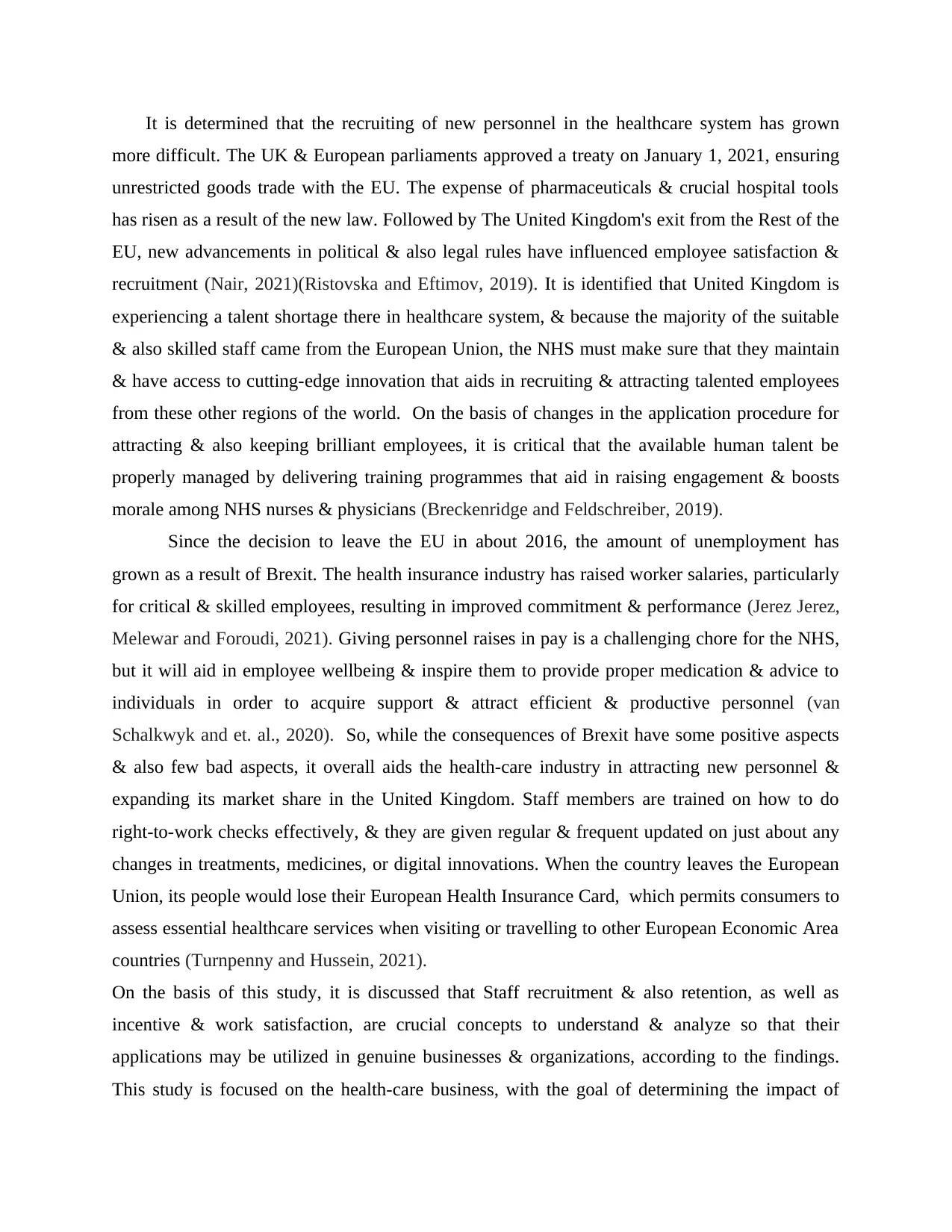
It is determined that the recruiting of new personnel in the healthcare system has grown
more difficult. The UK & European parliaments approved a treaty on January 1, 2021, ensuring
unrestricted goods trade with the EU. The expense of pharmaceuticals & crucial hospital tools
has risen as a result of the new law. Followed by The United Kingdom's exit from the Rest of the
EU, new advancements in political & also legal rules have influenced employee satisfaction &
recruitment (Nair, 2021)(Ristovska and Eftimov, 2019). It is identified that United Kingdom is
experiencing a talent shortage there in healthcare system, & because the majority of the suitable
& also skilled staff came from the European Union, the NHS must make sure that they maintain
& have access to cutting-edge innovation that aids in recruiting & attracting talented employees
from these other regions of the world. On the basis of changes in the application procedure for
attracting & also keeping brilliant employees, it is critical that the available human talent be
properly managed by delivering training programmes that aid in raising engagement & boosts
morale among NHS nurses & physicians (Breckenridge and Feldschreiber, 2019).
Since the decision to leave the EU in about 2016, the amount of unemployment has
grown as a result of Brexit. The health insurance industry has raised worker salaries, particularly
for critical & skilled employees, resulting in improved commitment & performance (Jerez Jerez,
Melewar and Foroudi, 2021). Giving personnel raises in pay is a challenging chore for the NHS,
but it will aid in employee wellbeing & inspire them to provide proper medication & advice to
individuals in order to acquire support & attract efficient & productive personnel (van
Schalkwyk and et. al., 2020). So, while the consequences of Brexit have some positive aspects
& also few bad aspects, it overall aids the health-care industry in attracting new personnel &
expanding its market share in the United Kingdom. Staff members are trained on how to do
right-to-work checks effectively, & they are given regular & frequent updated on just about any
changes in treatments, medicines, or digital innovations. When the country leaves the European
Union, its people would lose their European Health Insurance Card, which permits consumers to
assess essential healthcare services when visiting or travelling to other European Economic Area
countries (Turnpenny and Hussein, 2021).
On the basis of this study, it is discussed that Staff recruitment & also retention, as well as
incentive & work satisfaction, are crucial concepts to understand & analyze so that their
applications may be utilized in genuine businesses & organizations, according to the findings.
This study is focused on the health-care business, with the goal of determining the impact of
more difficult. The UK & European parliaments approved a treaty on January 1, 2021, ensuring
unrestricted goods trade with the EU. The expense of pharmaceuticals & crucial hospital tools
has risen as a result of the new law. Followed by The United Kingdom's exit from the Rest of the
EU, new advancements in political & also legal rules have influenced employee satisfaction &
recruitment (Nair, 2021)(Ristovska and Eftimov, 2019). It is identified that United Kingdom is
experiencing a talent shortage there in healthcare system, & because the majority of the suitable
& also skilled staff came from the European Union, the NHS must make sure that they maintain
& have access to cutting-edge innovation that aids in recruiting & attracting talented employees
from these other regions of the world. On the basis of changes in the application procedure for
attracting & also keeping brilliant employees, it is critical that the available human talent be
properly managed by delivering training programmes that aid in raising engagement & boosts
morale among NHS nurses & physicians (Breckenridge and Feldschreiber, 2019).
Since the decision to leave the EU in about 2016, the amount of unemployment has
grown as a result of Brexit. The health insurance industry has raised worker salaries, particularly
for critical & skilled employees, resulting in improved commitment & performance (Jerez Jerez,
Melewar and Foroudi, 2021). Giving personnel raises in pay is a challenging chore for the NHS,
but it will aid in employee wellbeing & inspire them to provide proper medication & advice to
individuals in order to acquire support & attract efficient & productive personnel (van
Schalkwyk and et. al., 2020). So, while the consequences of Brexit have some positive aspects
& also few bad aspects, it overall aids the health-care industry in attracting new personnel &
expanding its market share in the United Kingdom. Staff members are trained on how to do
right-to-work checks effectively, & they are given regular & frequent updated on just about any
changes in treatments, medicines, or digital innovations. When the country leaves the European
Union, its people would lose their European Health Insurance Card, which permits consumers to
assess essential healthcare services when visiting or travelling to other European Economic Area
countries (Turnpenny and Hussein, 2021).
On the basis of this study, it is discussed that Staff recruitment & also retention, as well as
incentive & work satisfaction, are crucial concepts to understand & analyze so that their
applications may be utilized in genuine businesses & organizations, according to the findings.
This study is focused on the health-care business, with the goal of determining the impact of
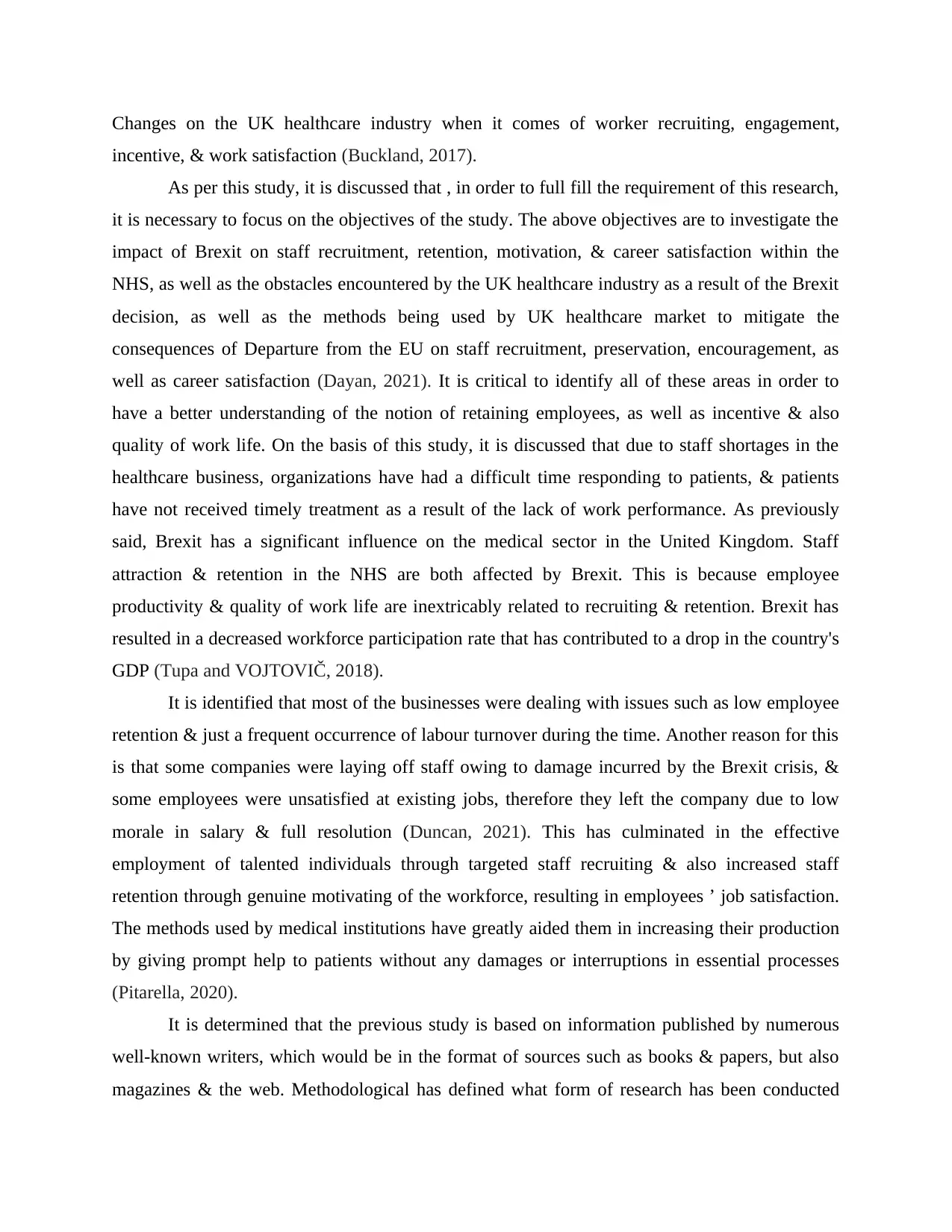
Changes on the UK healthcare industry when it comes of worker recruiting, engagement,
incentive, & work satisfaction (Buckland, 2017).
As per this study, it is discussed that , in order to full fill the requirement of this research,
it is necessary to focus on the objectives of the study. The above objectives are to investigate the
impact of Brexit on staff recruitment, retention, motivation, & career satisfaction within the
NHS, as well as the obstacles encountered by the UK healthcare industry as a result of the Brexit
decision, as well as the methods being used by UK healthcare market to mitigate the
consequences of Departure from the EU on staff recruitment, preservation, encouragement, as
well as career satisfaction (Dayan, 2021). It is critical to identify all of these areas in order to
have a better understanding of the notion of retaining employees, as well as incentive & also
quality of work life. On the basis of this study, it is discussed that due to staff shortages in the
healthcare business, organizations have had a difficult time responding to patients, & patients
have not received timely treatment as a result of the lack of work performance. As previously
said, Brexit has a significant influence on the medical sector in the United Kingdom. Staff
attraction & retention in the NHS are both affected by Brexit. This is because employee
productivity & quality of work life are inextricably related to recruiting & retention. Brexit has
resulted in a decreased workforce participation rate that has contributed to a drop in the country's
GDP (Tupa and VOJTOVIČ, 2018).
It is identified that most of the businesses were dealing with issues such as low employee
retention & just a frequent occurrence of labour turnover during the time. Another reason for this
is that some companies were laying off staff owing to damage incurred by the Brexit crisis, &
some employees were unsatisfied at existing jobs, therefore they left the company due to low
morale in salary & full resolution (Duncan, 2021). This has culminated in the effective
employment of talented individuals through targeted staff recruiting & also increased staff
retention through genuine motivating of the workforce, resulting in employees ’ job satisfaction.
The methods used by medical institutions have greatly aided them in increasing their production
by giving prompt help to patients without any damages or interruptions in essential processes
(Pitarella, 2020).
It is determined that the previous study is based on information published by numerous
well-known writers, which would be in the format of sources such as books & papers, but also
magazines & the web. Methodological has defined what form of research has been conducted
incentive, & work satisfaction (Buckland, 2017).
As per this study, it is discussed that , in order to full fill the requirement of this research,
it is necessary to focus on the objectives of the study. The above objectives are to investigate the
impact of Brexit on staff recruitment, retention, motivation, & career satisfaction within the
NHS, as well as the obstacles encountered by the UK healthcare industry as a result of the Brexit
decision, as well as the methods being used by UK healthcare market to mitigate the
consequences of Departure from the EU on staff recruitment, preservation, encouragement, as
well as career satisfaction (Dayan, 2021). It is critical to identify all of these areas in order to
have a better understanding of the notion of retaining employees, as well as incentive & also
quality of work life. On the basis of this study, it is discussed that due to staff shortages in the
healthcare business, organizations have had a difficult time responding to patients, & patients
have not received timely treatment as a result of the lack of work performance. As previously
said, Brexit has a significant influence on the medical sector in the United Kingdom. Staff
attraction & retention in the NHS are both affected by Brexit. This is because employee
productivity & quality of work life are inextricably related to recruiting & retention. Brexit has
resulted in a decreased workforce participation rate that has contributed to a drop in the country's
GDP (Tupa and VOJTOVIČ, 2018).
It is identified that most of the businesses were dealing with issues such as low employee
retention & just a frequent occurrence of labour turnover during the time. Another reason for this
is that some companies were laying off staff owing to damage incurred by the Brexit crisis, &
some employees were unsatisfied at existing jobs, therefore they left the company due to low
morale in salary & full resolution (Duncan, 2021). This has culminated in the effective
employment of talented individuals through targeted staff recruiting & also increased staff
retention through genuine motivating of the workforce, resulting in employees ’ job satisfaction.
The methods used by medical institutions have greatly aided them in increasing their production
by giving prompt help to patients without any damages or interruptions in essential processes
(Pitarella, 2020).
It is determined that the previous study is based on information published by numerous
well-known writers, which would be in the format of sources such as books & papers, but also
magazines & the web. Methodological has defined what form of research has been conducted
Secure Best Marks with AI Grader
Need help grading? Try our AI Grader for instant feedback on your assignments.
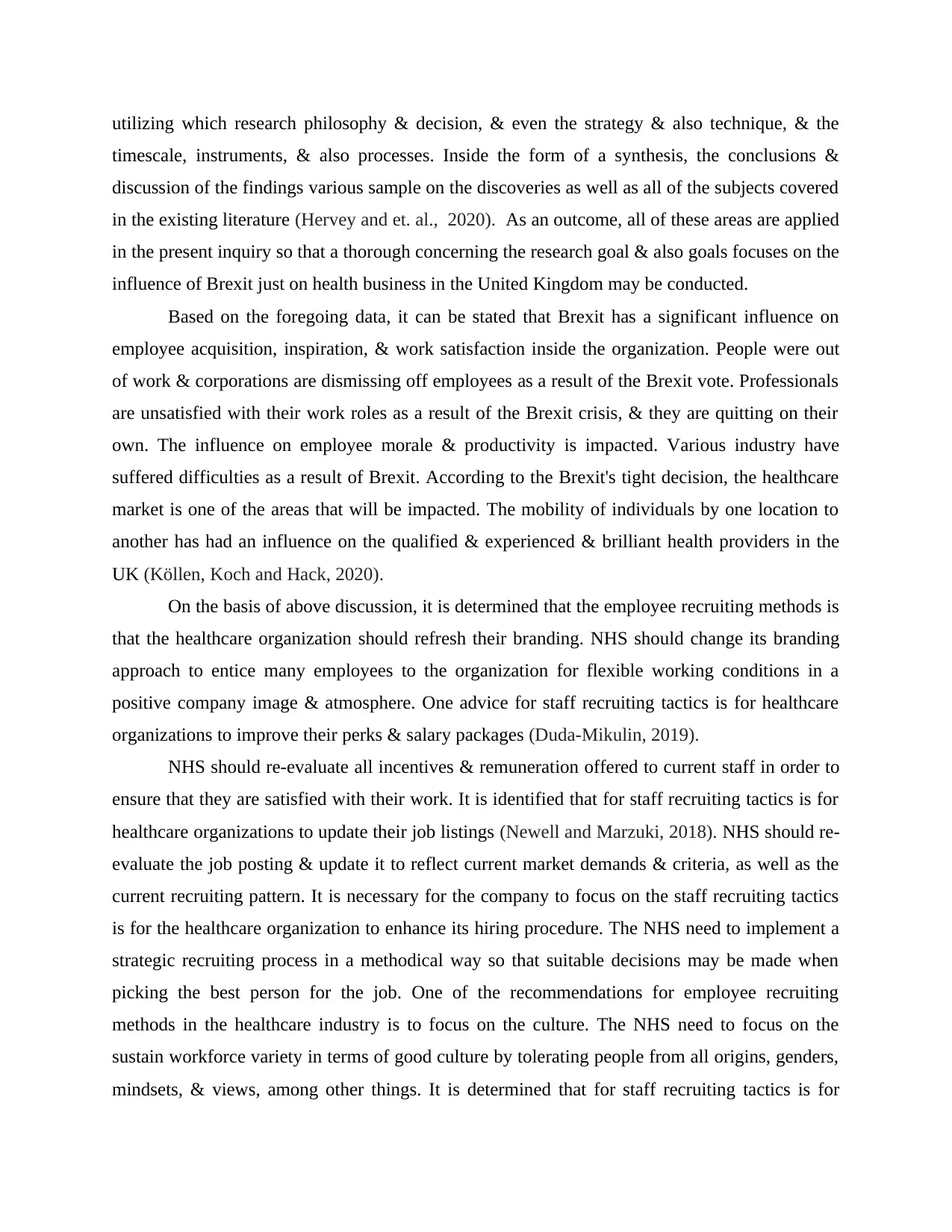
utilizing which research philosophy & decision, & even the strategy & also technique, & the
timescale, instruments, & also processes. Inside the form of a synthesis, the conclusions &
discussion of the findings various sample on the discoveries as well as all of the subjects covered
in the existing literature (Hervey and et. al., 2020). As an outcome, all of these areas are applied
in the present inquiry so that a thorough concerning the research goal & also goals focuses on the
influence of Brexit just on health business in the United Kingdom may be conducted.
Based on the foregoing data, it can be stated that Brexit has a significant influence on
employee acquisition, inspiration, & work satisfaction inside the organization. People were out
of work & corporations are dismissing off employees as a result of the Brexit vote. Professionals
are unsatisfied with their work roles as a result of the Brexit crisis, & they are quitting on their
own. The influence on employee morale & productivity is impacted. Various industry have
suffered difficulties as a result of Brexit. According to the Brexit's tight decision, the healthcare
market is one of the areas that will be impacted. The mobility of individuals by one location to
another has had an influence on the qualified & experienced & brilliant health providers in the
UK (Köllen, Koch and Hack, 2020).
On the basis of above discussion, it is determined that the employee recruiting methods is
that the healthcare organization should refresh their branding. NHS should change its branding
approach to entice many employees to the organization for flexible working conditions in a
positive company image & atmosphere. One advice for staff recruiting tactics is for healthcare
organizations to improve their perks & salary packages (Duda-Mikulin, 2019).
NHS should re-evaluate all incentives & remuneration offered to current staff in order to
ensure that they are satisfied with their work. It is identified that for staff recruiting tactics is for
healthcare organizations to update their job listings (Newell and Marzuki, 2018). NHS should re-
evaluate the job posting & update it to reflect current market demands & criteria, as well as the
current recruiting pattern. It is necessary for the company to focus on the staff recruiting tactics
is for the healthcare organization to enhance its hiring procedure. The NHS need to implement a
strategic recruiting process in a methodical way so that suitable decisions may be made when
picking the best person for the job. One of the recommendations for employee recruiting
methods in the healthcare industry is to focus on the culture. The NHS need to focus on the
sustain workforce variety in terms of good culture by tolerating people from all origins, genders,
mindsets, & views, among other things. It is determined that for staff recruiting tactics is for
timescale, instruments, & also processes. Inside the form of a synthesis, the conclusions &
discussion of the findings various sample on the discoveries as well as all of the subjects covered
in the existing literature (Hervey and et. al., 2020). As an outcome, all of these areas are applied
in the present inquiry so that a thorough concerning the research goal & also goals focuses on the
influence of Brexit just on health business in the United Kingdom may be conducted.
Based on the foregoing data, it can be stated that Brexit has a significant influence on
employee acquisition, inspiration, & work satisfaction inside the organization. People were out
of work & corporations are dismissing off employees as a result of the Brexit vote. Professionals
are unsatisfied with their work roles as a result of the Brexit crisis, & they are quitting on their
own. The influence on employee morale & productivity is impacted. Various industry have
suffered difficulties as a result of Brexit. According to the Brexit's tight decision, the healthcare
market is one of the areas that will be impacted. The mobility of individuals by one location to
another has had an influence on the qualified & experienced & brilliant health providers in the
UK (Köllen, Koch and Hack, 2020).
On the basis of above discussion, it is determined that the employee recruiting methods is
that the healthcare organization should refresh their branding. NHS should change its branding
approach to entice many employees to the organization for flexible working conditions in a
positive company image & atmosphere. One advice for staff recruiting tactics is for healthcare
organizations to improve their perks & salary packages (Duda-Mikulin, 2019).
NHS should re-evaluate all incentives & remuneration offered to current staff in order to
ensure that they are satisfied with their work. It is identified that for staff recruiting tactics is for
healthcare organizations to update their job listings (Newell and Marzuki, 2018). NHS should re-
evaluate the job posting & update it to reflect current market demands & criteria, as well as the
current recruiting pattern. It is necessary for the company to focus on the staff recruiting tactics
is for the healthcare organization to enhance its hiring procedure. The NHS need to implement a
strategic recruiting process in a methodical way so that suitable decisions may be made when
picking the best person for the job. One of the recommendations for employee recruiting
methods in the healthcare industry is to focus on the culture. The NHS need to focus on the
sustain workforce variety in terms of good culture by tolerating people from all origins, genders,
mindsets, & views, among other things. It is determined that for staff recruiting tactics is for
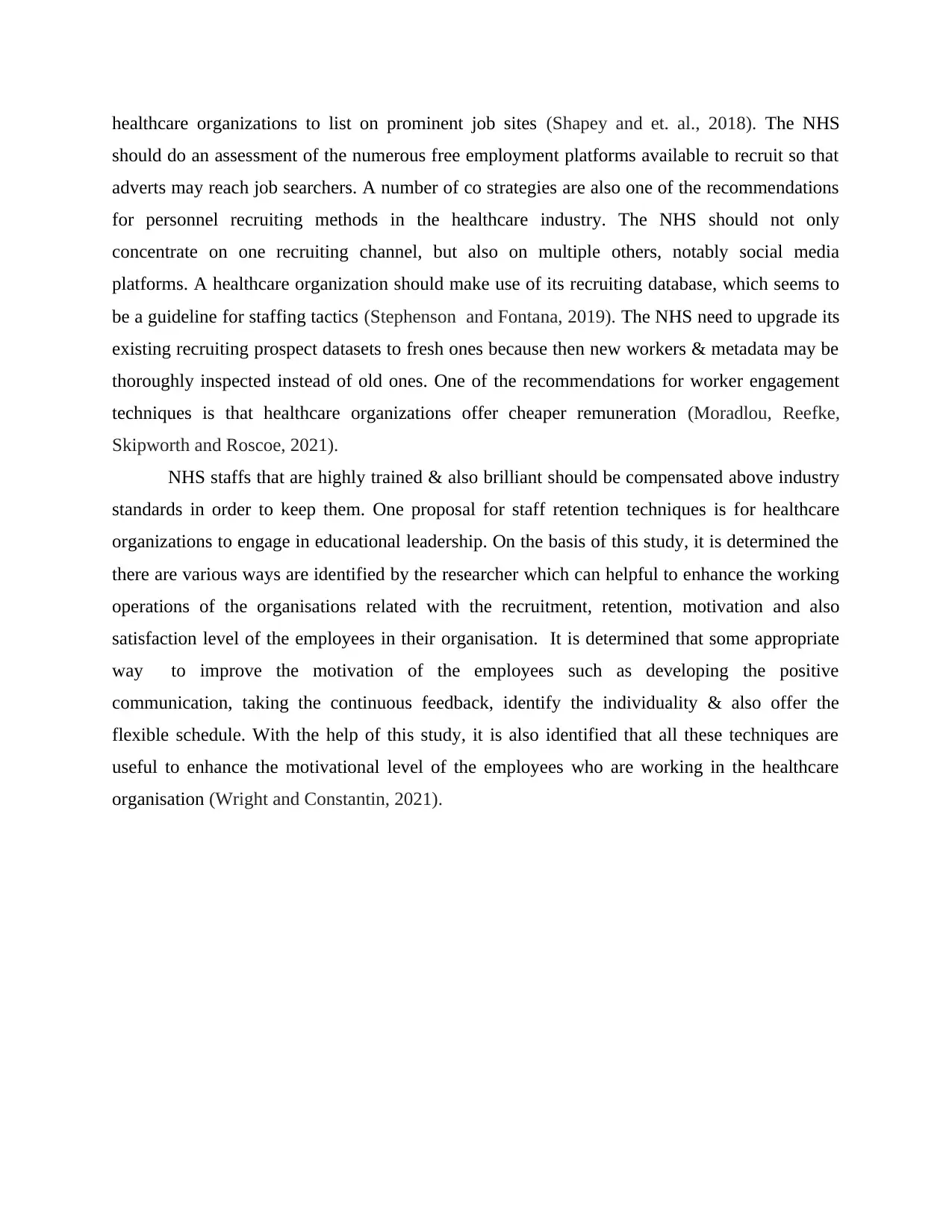
healthcare organizations to list on prominent job sites (Shapey and et. al., 2018). The NHS
should do an assessment of the numerous free employment platforms available to recruit so that
adverts may reach job searchers. A number of co strategies are also one of the recommendations
for personnel recruiting methods in the healthcare industry. The NHS should not only
concentrate on one recruiting channel, but also on multiple others, notably social media
platforms. A healthcare organization should make use of its recruiting database, which seems to
be a guideline for staffing tactics (Stephenson and Fontana, 2019). The NHS need to upgrade its
existing recruiting prospect datasets to fresh ones because then new workers & metadata may be
thoroughly inspected instead of old ones. One of the recommendations for worker engagement
techniques is that healthcare organizations offer cheaper remuneration (Moradlou, Reefke,
Skipworth and Roscoe, 2021).
NHS staffs that are highly trained & also brilliant should be compensated above industry
standards in order to keep them. One proposal for staff retention techniques is for healthcare
organizations to engage in educational leadership. On the basis of this study, it is determined the
there are various ways are identified by the researcher which can helpful to enhance the working
operations of the organisations related with the recruitment, retention, motivation and also
satisfaction level of the employees in their organisation. It is determined that some appropriate
way to improve the motivation of the employees such as developing the positive
communication, taking the continuous feedback, identify the individuality & also offer the
flexible schedule. With the help of this study, it is also identified that all these techniques are
useful to enhance the motivational level of the employees who are working in the healthcare
organisation (Wright and Constantin, 2021).
should do an assessment of the numerous free employment platforms available to recruit so that
adverts may reach job searchers. A number of co strategies are also one of the recommendations
for personnel recruiting methods in the healthcare industry. The NHS should not only
concentrate on one recruiting channel, but also on multiple others, notably social media
platforms. A healthcare organization should make use of its recruiting database, which seems to
be a guideline for staffing tactics (Stephenson and Fontana, 2019). The NHS need to upgrade its
existing recruiting prospect datasets to fresh ones because then new workers & metadata may be
thoroughly inspected instead of old ones. One of the recommendations for worker engagement
techniques is that healthcare organizations offer cheaper remuneration (Moradlou, Reefke,
Skipworth and Roscoe, 2021).
NHS staffs that are highly trained & also brilliant should be compensated above industry
standards in order to keep them. One proposal for staff retention techniques is for healthcare
organizations to engage in educational leadership. On the basis of this study, it is determined the
there are various ways are identified by the researcher which can helpful to enhance the working
operations of the organisations related with the recruitment, retention, motivation and also
satisfaction level of the employees in their organisation. It is determined that some appropriate
way to improve the motivation of the employees such as developing the positive
communication, taking the continuous feedback, identify the individuality & also offer the
flexible schedule. With the help of this study, it is also identified that all these techniques are
useful to enhance the motivational level of the employees who are working in the healthcare
organisation (Wright and Constantin, 2021).
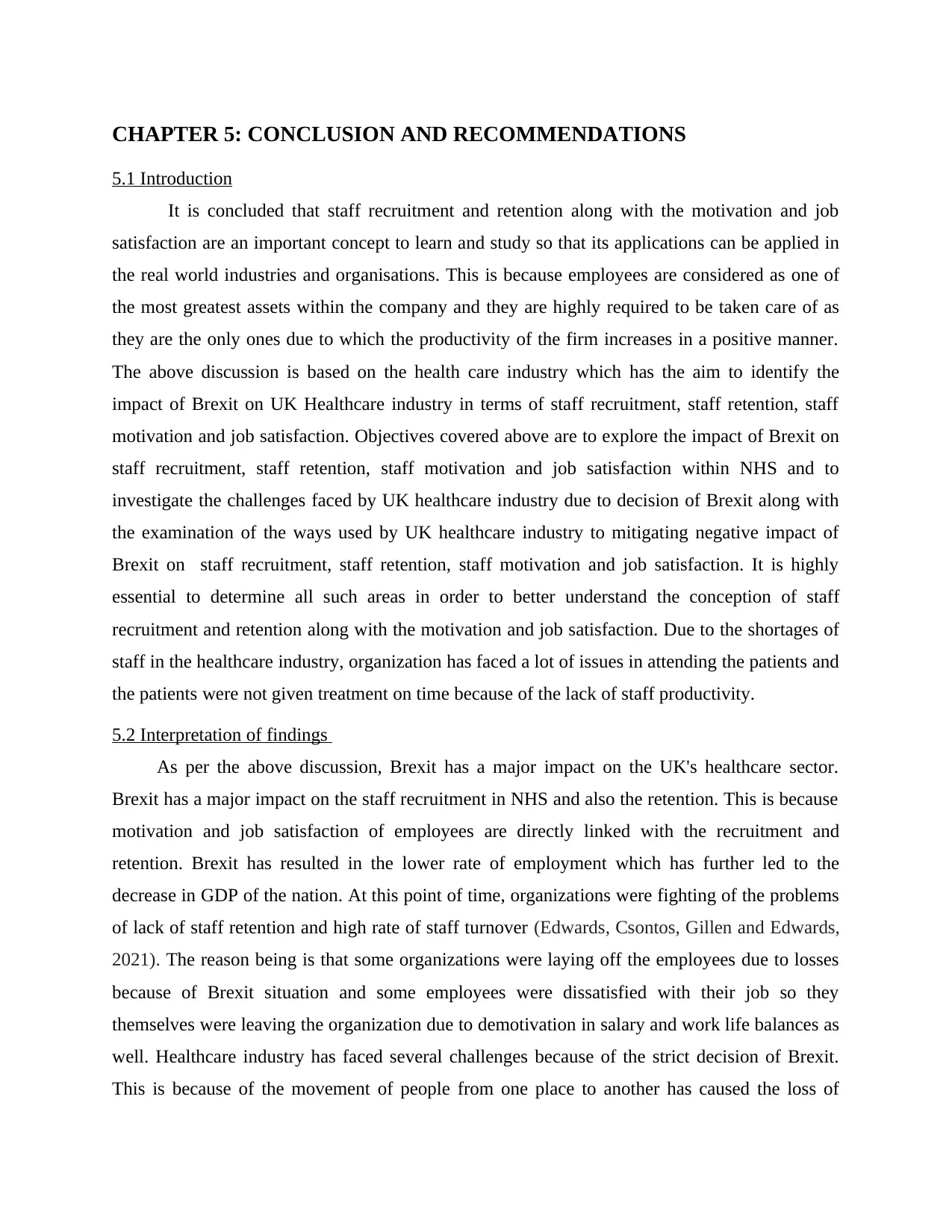
CHAPTER 5: CONCLUSION AND RECOMMENDATIONS
5.1 Introduction
It is concluded that staff recruitment and retention along with the motivation and job
satisfaction are an important concept to learn and study so that its applications can be applied in
the real world industries and organisations. This is because employees are considered as one of
the most greatest assets within the company and they are highly required to be taken care of as
they are the only ones due to which the productivity of the firm increases in a positive manner.
The above discussion is based on the health care industry which has the aim to identify the
impact of Brexit on UK Healthcare industry in terms of staff recruitment, staff retention, staff
motivation and job satisfaction. Objectives covered above are to explore the impact of Brexit on
staff recruitment, staff retention, staff motivation and job satisfaction within NHS and to
investigate the challenges faced by UK healthcare industry due to decision of Brexit along with
the examination of the ways used by UK healthcare industry to mitigating negative impact of
Brexit on staff recruitment, staff retention, staff motivation and job satisfaction. It is highly
essential to determine all such areas in order to better understand the conception of staff
recruitment and retention along with the motivation and job satisfaction. Due to the shortages of
staff in the healthcare industry, organization has faced a lot of issues in attending the patients and
the patients were not given treatment on time because of the lack of staff productivity.
5.2 Interpretation of findings
As per the above discussion, Brexit has a major impact on the UK's healthcare sector.
Brexit has a major impact on the staff recruitment in NHS and also the retention. This is because
motivation and job satisfaction of employees are directly linked with the recruitment and
retention. Brexit has resulted in the lower rate of employment which has further led to the
decrease in GDP of the nation. At this point of time, organizations were fighting of the problems
of lack of staff retention and high rate of staff turnover (Edwards, Csontos, Gillen and Edwards,
2021). The reason being is that some organizations were laying off the employees due to losses
because of Brexit situation and some employees were dissatisfied with their job so they
themselves were leaving the organization due to demotivation in salary and work life balances as
well. Healthcare industry has faced several challenges because of the strict decision of Brexit.
This is because of the movement of people from one place to another has caused the loss of
5.1 Introduction
It is concluded that staff recruitment and retention along with the motivation and job
satisfaction are an important concept to learn and study so that its applications can be applied in
the real world industries and organisations. This is because employees are considered as one of
the most greatest assets within the company and they are highly required to be taken care of as
they are the only ones due to which the productivity of the firm increases in a positive manner.
The above discussion is based on the health care industry which has the aim to identify the
impact of Brexit on UK Healthcare industry in terms of staff recruitment, staff retention, staff
motivation and job satisfaction. Objectives covered above are to explore the impact of Brexit on
staff recruitment, staff retention, staff motivation and job satisfaction within NHS and to
investigate the challenges faced by UK healthcare industry due to decision of Brexit along with
the examination of the ways used by UK healthcare industry to mitigating negative impact of
Brexit on staff recruitment, staff retention, staff motivation and job satisfaction. It is highly
essential to determine all such areas in order to better understand the conception of staff
recruitment and retention along with the motivation and job satisfaction. Due to the shortages of
staff in the healthcare industry, organization has faced a lot of issues in attending the patients and
the patients were not given treatment on time because of the lack of staff productivity.
5.2 Interpretation of findings
As per the above discussion, Brexit has a major impact on the UK's healthcare sector.
Brexit has a major impact on the staff recruitment in NHS and also the retention. This is because
motivation and job satisfaction of employees are directly linked with the recruitment and
retention. Brexit has resulted in the lower rate of employment which has further led to the
decrease in GDP of the nation. At this point of time, organizations were fighting of the problems
of lack of staff retention and high rate of staff turnover (Edwards, Csontos, Gillen and Edwards,
2021). The reason being is that some organizations were laying off the employees due to losses
because of Brexit situation and some employees were dissatisfied with their job so they
themselves were leaving the organization due to demotivation in salary and work life balances as
well. Healthcare industry has faced several challenges because of the strict decision of Brexit.
This is because of the movement of people from one place to another has caused the loss of
Paraphrase This Document
Need a fresh take? Get an instant paraphrase of this document with our AI Paraphraser
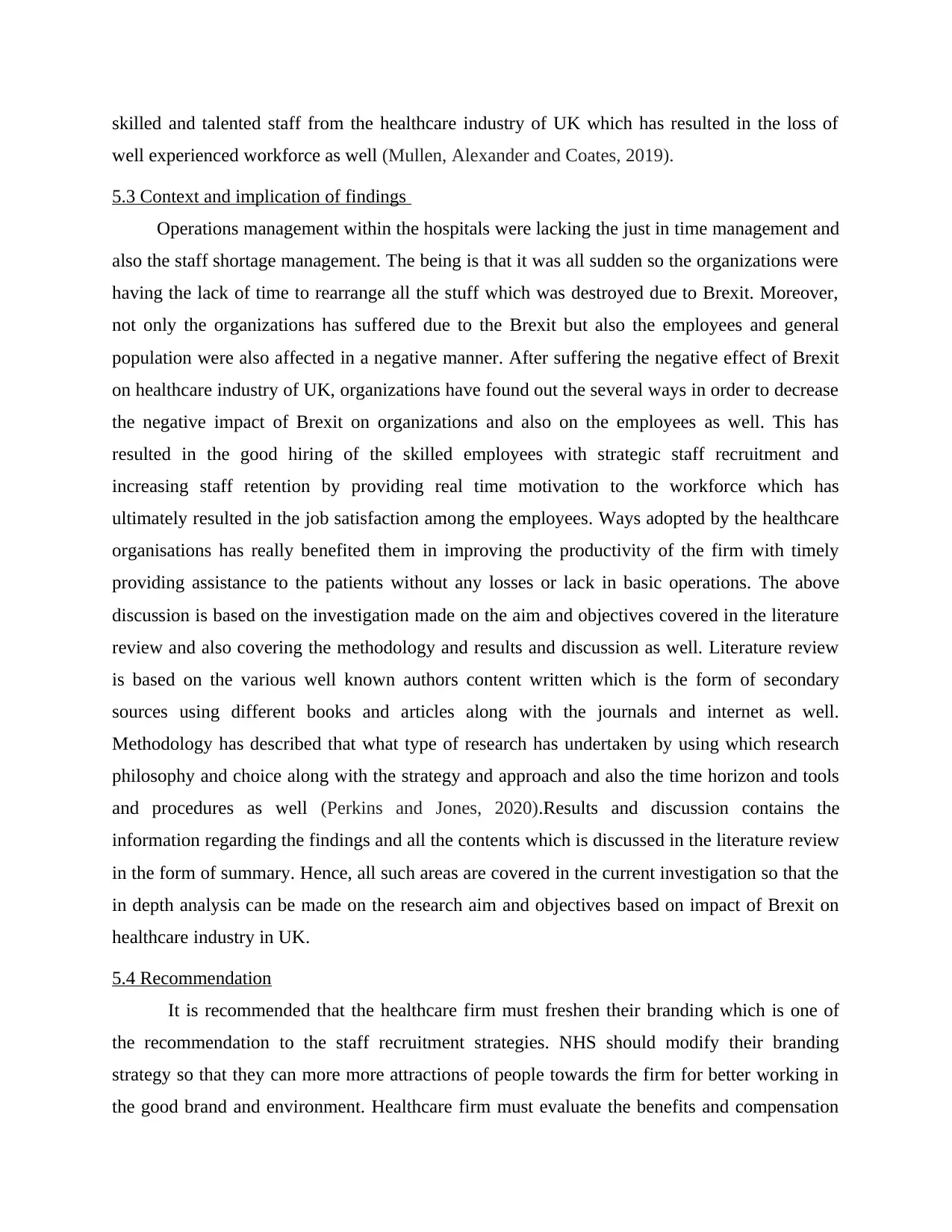
skilled and talented staff from the healthcare industry of UK which has resulted in the loss of
well experienced workforce as well (Mullen, Alexander and Coates, 2019).
5.3 Context and implication of findings
Operations management within the hospitals were lacking the just in time management and
also the staff shortage management. The being is that it was all sudden so the organizations were
having the lack of time to rearrange all the stuff which was destroyed due to Brexit. Moreover,
not only the organizations has suffered due to the Brexit but also the employees and general
population were also affected in a negative manner. After suffering the negative effect of Brexit
on healthcare industry of UK, organizations have found out the several ways in order to decrease
the negative impact of Brexit on organizations and also on the employees as well. This has
resulted in the good hiring of the skilled employees with strategic staff recruitment and
increasing staff retention by providing real time motivation to the workforce which has
ultimately resulted in the job satisfaction among the employees. Ways adopted by the healthcare
organisations has really benefited them in improving the productivity of the firm with timely
providing assistance to the patients without any losses or lack in basic operations. The above
discussion is based on the investigation made on the aim and objectives covered in the literature
review and also covering the methodology and results and discussion as well. Literature review
is based on the various well known authors content written which is the form of secondary
sources using different books and articles along with the journals and internet as well.
Methodology has described that what type of research has undertaken by using which research
philosophy and choice along with the strategy and approach and also the time horizon and tools
and procedures as well (Perkins and Jones, 2020).Results and discussion contains the
information regarding the findings and all the contents which is discussed in the literature review
in the form of summary. Hence, all such areas are covered in the current investigation so that the
in depth analysis can be made on the research aim and objectives based on impact of Brexit on
healthcare industry in UK.
5.4 Recommendation
It is recommended that the healthcare firm must freshen their branding which is one of
the recommendation to the staff recruitment strategies. NHS should modify their branding
strategy so that they can more more attractions of people towards the firm for better working in
the good brand and environment. Healthcare firm must evaluate the benefits and compensation
well experienced workforce as well (Mullen, Alexander and Coates, 2019).
5.3 Context and implication of findings
Operations management within the hospitals were lacking the just in time management and
also the staff shortage management. The being is that it was all sudden so the organizations were
having the lack of time to rearrange all the stuff which was destroyed due to Brexit. Moreover,
not only the organizations has suffered due to the Brexit but also the employees and general
population were also affected in a negative manner. After suffering the negative effect of Brexit
on healthcare industry of UK, organizations have found out the several ways in order to decrease
the negative impact of Brexit on organizations and also on the employees as well. This has
resulted in the good hiring of the skilled employees with strategic staff recruitment and
increasing staff retention by providing real time motivation to the workforce which has
ultimately resulted in the job satisfaction among the employees. Ways adopted by the healthcare
organisations has really benefited them in improving the productivity of the firm with timely
providing assistance to the patients without any losses or lack in basic operations. The above
discussion is based on the investigation made on the aim and objectives covered in the literature
review and also covering the methodology and results and discussion as well. Literature review
is based on the various well known authors content written which is the form of secondary
sources using different books and articles along with the journals and internet as well.
Methodology has described that what type of research has undertaken by using which research
philosophy and choice along with the strategy and approach and also the time horizon and tools
and procedures as well (Perkins and Jones, 2020).Results and discussion contains the
information regarding the findings and all the contents which is discussed in the literature review
in the form of summary. Hence, all such areas are covered in the current investigation so that the
in depth analysis can be made on the research aim and objectives based on impact of Brexit on
healthcare industry in UK.
5.4 Recommendation
It is recommended that the healthcare firm must freshen their branding which is one of
the recommendation to the staff recruitment strategies. NHS should modify their branding
strategy so that they can more more attractions of people towards the firm for better working in
the good brand and environment. Healthcare firm must evaluate the benefits and compensation
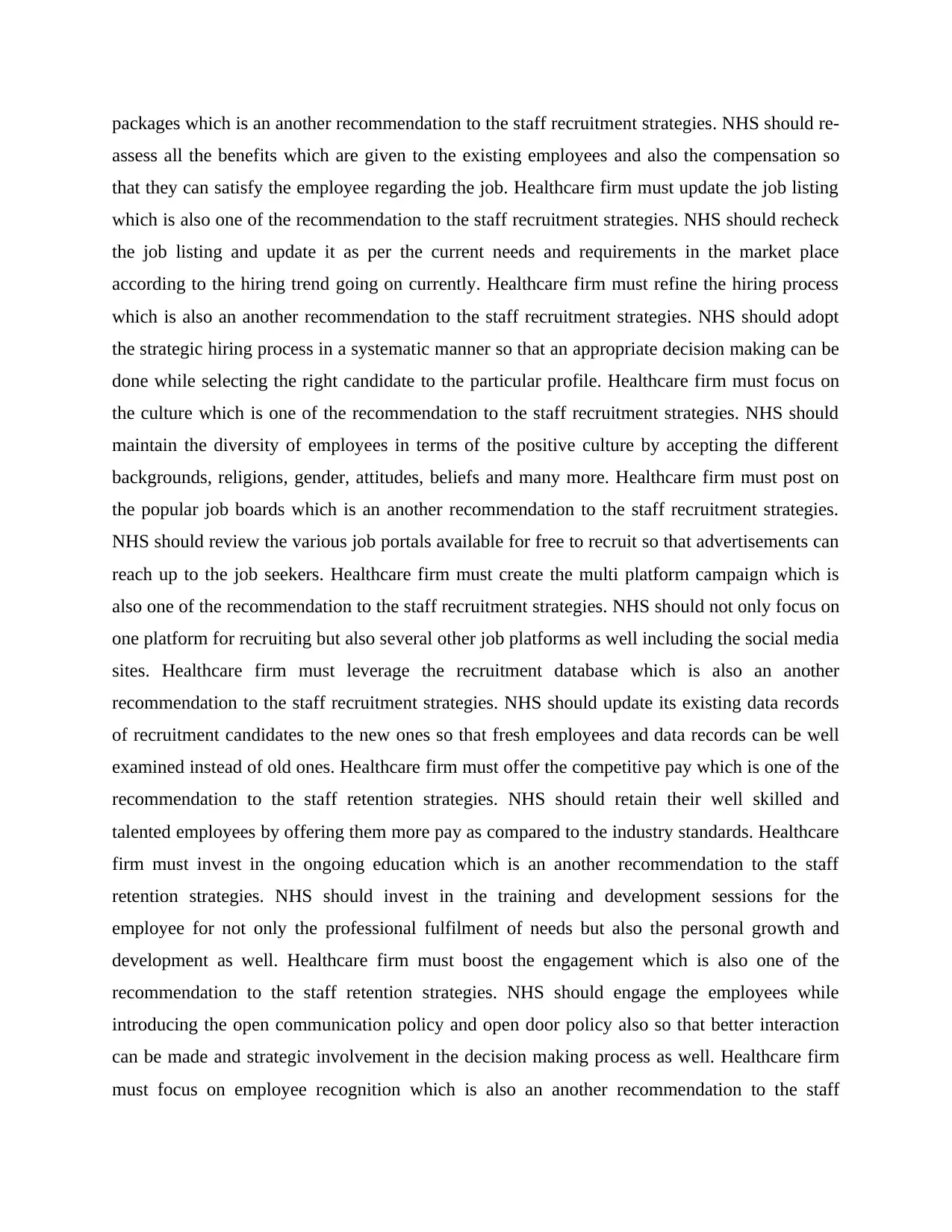
packages which is an another recommendation to the staff recruitment strategies. NHS should re-
assess all the benefits which are given to the existing employees and also the compensation so
that they can satisfy the employee regarding the job. Healthcare firm must update the job listing
which is also one of the recommendation to the staff recruitment strategies. NHS should recheck
the job listing and update it as per the current needs and requirements in the market place
according to the hiring trend going on currently. Healthcare firm must refine the hiring process
which is also an another recommendation to the staff recruitment strategies. NHS should adopt
the strategic hiring process in a systematic manner so that an appropriate decision making can be
done while selecting the right candidate to the particular profile. Healthcare firm must focus on
the culture which is one of the recommendation to the staff recruitment strategies. NHS should
maintain the diversity of employees in terms of the positive culture by accepting the different
backgrounds, religions, gender, attitudes, beliefs and many more. Healthcare firm must post on
the popular job boards which is an another recommendation to the staff recruitment strategies.
NHS should review the various job portals available for free to recruit so that advertisements can
reach up to the job seekers. Healthcare firm must create the multi platform campaign which is
also one of the recommendation to the staff recruitment strategies. NHS should not only focus on
one platform for recruiting but also several other job platforms as well including the social media
sites. Healthcare firm must leverage the recruitment database which is also an another
recommendation to the staff recruitment strategies. NHS should update its existing data records
of recruitment candidates to the new ones so that fresh employees and data records can be well
examined instead of old ones. Healthcare firm must offer the competitive pay which is one of the
recommendation to the staff retention strategies. NHS should retain their well skilled and
talented employees by offering them more pay as compared to the industry standards. Healthcare
firm must invest in the ongoing education which is an another recommendation to the staff
retention strategies. NHS should invest in the training and development sessions for the
employee for not only the professional fulfilment of needs but also the personal growth and
development as well. Healthcare firm must boost the engagement which is also one of the
recommendation to the staff retention strategies. NHS should engage the employees while
introducing the open communication policy and open door policy also so that better interaction
can be made and strategic involvement in the decision making process as well. Healthcare firm
must focus on employee recognition which is also an another recommendation to the staff
assess all the benefits which are given to the existing employees and also the compensation so
that they can satisfy the employee regarding the job. Healthcare firm must update the job listing
which is also one of the recommendation to the staff recruitment strategies. NHS should recheck
the job listing and update it as per the current needs and requirements in the market place
according to the hiring trend going on currently. Healthcare firm must refine the hiring process
which is also an another recommendation to the staff recruitment strategies. NHS should adopt
the strategic hiring process in a systematic manner so that an appropriate decision making can be
done while selecting the right candidate to the particular profile. Healthcare firm must focus on
the culture which is one of the recommendation to the staff recruitment strategies. NHS should
maintain the diversity of employees in terms of the positive culture by accepting the different
backgrounds, religions, gender, attitudes, beliefs and many more. Healthcare firm must post on
the popular job boards which is an another recommendation to the staff recruitment strategies.
NHS should review the various job portals available for free to recruit so that advertisements can
reach up to the job seekers. Healthcare firm must create the multi platform campaign which is
also one of the recommendation to the staff recruitment strategies. NHS should not only focus on
one platform for recruiting but also several other job platforms as well including the social media
sites. Healthcare firm must leverage the recruitment database which is also an another
recommendation to the staff recruitment strategies. NHS should update its existing data records
of recruitment candidates to the new ones so that fresh employees and data records can be well
examined instead of old ones. Healthcare firm must offer the competitive pay which is one of the
recommendation to the staff retention strategies. NHS should retain their well skilled and
talented employees by offering them more pay as compared to the industry standards. Healthcare
firm must invest in the ongoing education which is an another recommendation to the staff
retention strategies. NHS should invest in the training and development sessions for the
employee for not only the professional fulfilment of needs but also the personal growth and
development as well. Healthcare firm must boost the engagement which is also one of the
recommendation to the staff retention strategies. NHS should engage the employees while
introducing the open communication policy and open door policy also so that better interaction
can be made and strategic involvement in the decision making process as well. Healthcare firm
must focus on employee recognition which is also an another recommendation to the staff
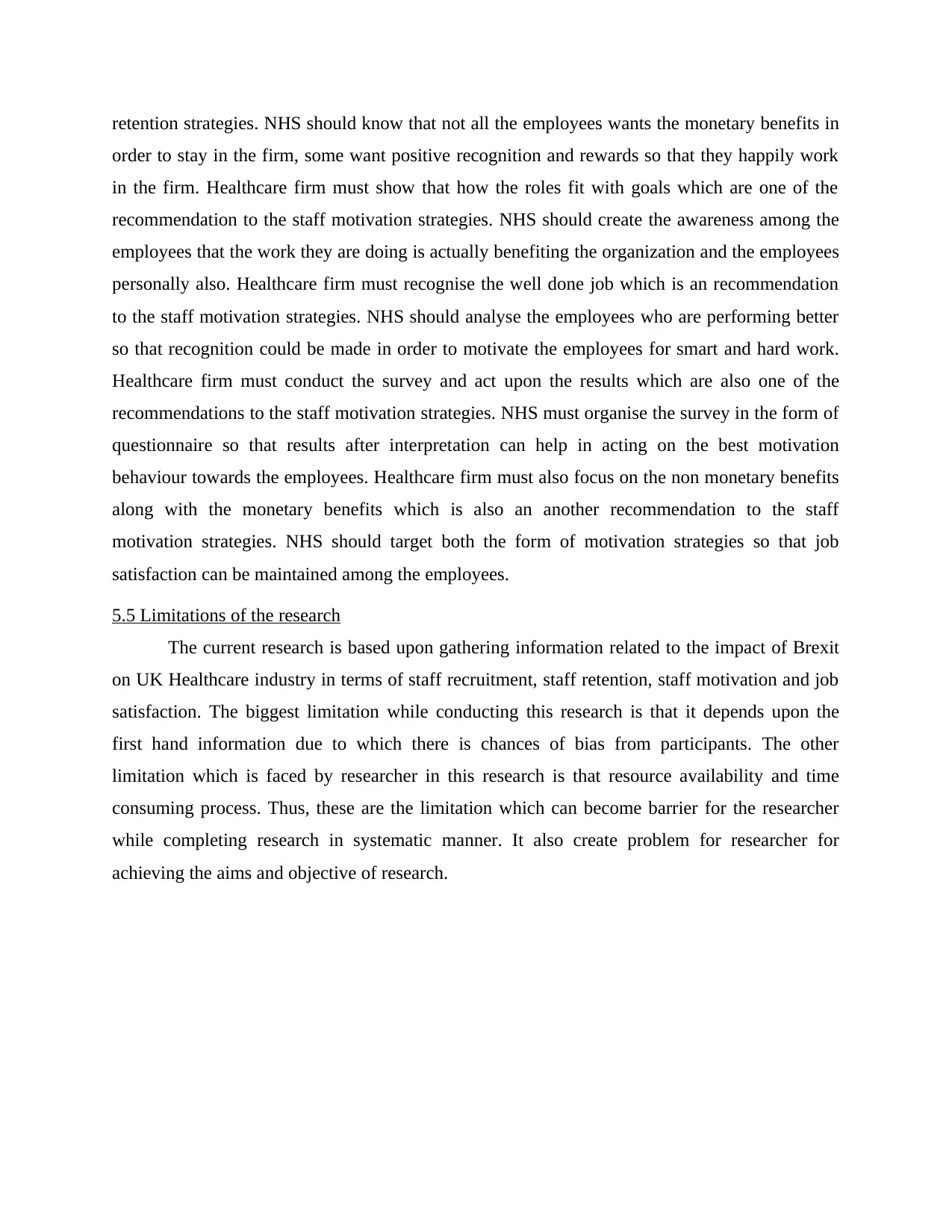
retention strategies. NHS should know that not all the employees wants the monetary benefits in
order to stay in the firm, some want positive recognition and rewards so that they happily work
in the firm. Healthcare firm must show that how the roles fit with goals which are one of the
recommendation to the staff motivation strategies. NHS should create the awareness among the
employees that the work they are doing is actually benefiting the organization and the employees
personally also. Healthcare firm must recognise the well done job which is an recommendation
to the staff motivation strategies. NHS should analyse the employees who are performing better
so that recognition could be made in order to motivate the employees for smart and hard work.
Healthcare firm must conduct the survey and act upon the results which are also one of the
recommendations to the staff motivation strategies. NHS must organise the survey in the form of
questionnaire so that results after interpretation can help in acting on the best motivation
behaviour towards the employees. Healthcare firm must also focus on the non monetary benefits
along with the monetary benefits which is also an another recommendation to the staff
motivation strategies. NHS should target both the form of motivation strategies so that job
satisfaction can be maintained among the employees.
5.5 Limitations of the research
The current research is based upon gathering information related to the impact of Brexit
on UK Healthcare industry in terms of staff recruitment, staff retention, staff motivation and job
satisfaction. The biggest limitation while conducting this research is that it depends upon the
first hand information due to which there is chances of bias from participants. The other
limitation which is faced by researcher in this research is that resource availability and time
consuming process. Thus, these are the limitation which can become barrier for the researcher
while completing research in systematic manner. It also create problem for researcher for
achieving the aims and objective of research.
order to stay in the firm, some want positive recognition and rewards so that they happily work
in the firm. Healthcare firm must show that how the roles fit with goals which are one of the
recommendation to the staff motivation strategies. NHS should create the awareness among the
employees that the work they are doing is actually benefiting the organization and the employees
personally also. Healthcare firm must recognise the well done job which is an recommendation
to the staff motivation strategies. NHS should analyse the employees who are performing better
so that recognition could be made in order to motivate the employees for smart and hard work.
Healthcare firm must conduct the survey and act upon the results which are also one of the
recommendations to the staff motivation strategies. NHS must organise the survey in the form of
questionnaire so that results after interpretation can help in acting on the best motivation
behaviour towards the employees. Healthcare firm must also focus on the non monetary benefits
along with the monetary benefits which is also an another recommendation to the staff
motivation strategies. NHS should target both the form of motivation strategies so that job
satisfaction can be maintained among the employees.
5.5 Limitations of the research
The current research is based upon gathering information related to the impact of Brexit
on UK Healthcare industry in terms of staff recruitment, staff retention, staff motivation and job
satisfaction. The biggest limitation while conducting this research is that it depends upon the
first hand information due to which there is chances of bias from participants. The other
limitation which is faced by researcher in this research is that resource availability and time
consuming process. Thus, these are the limitation which can become barrier for the researcher
while completing research in systematic manner. It also create problem for researcher for
achieving the aims and objective of research.
Secure Best Marks with AI Grader
Need help grading? Try our AI Grader for instant feedback on your assignments.
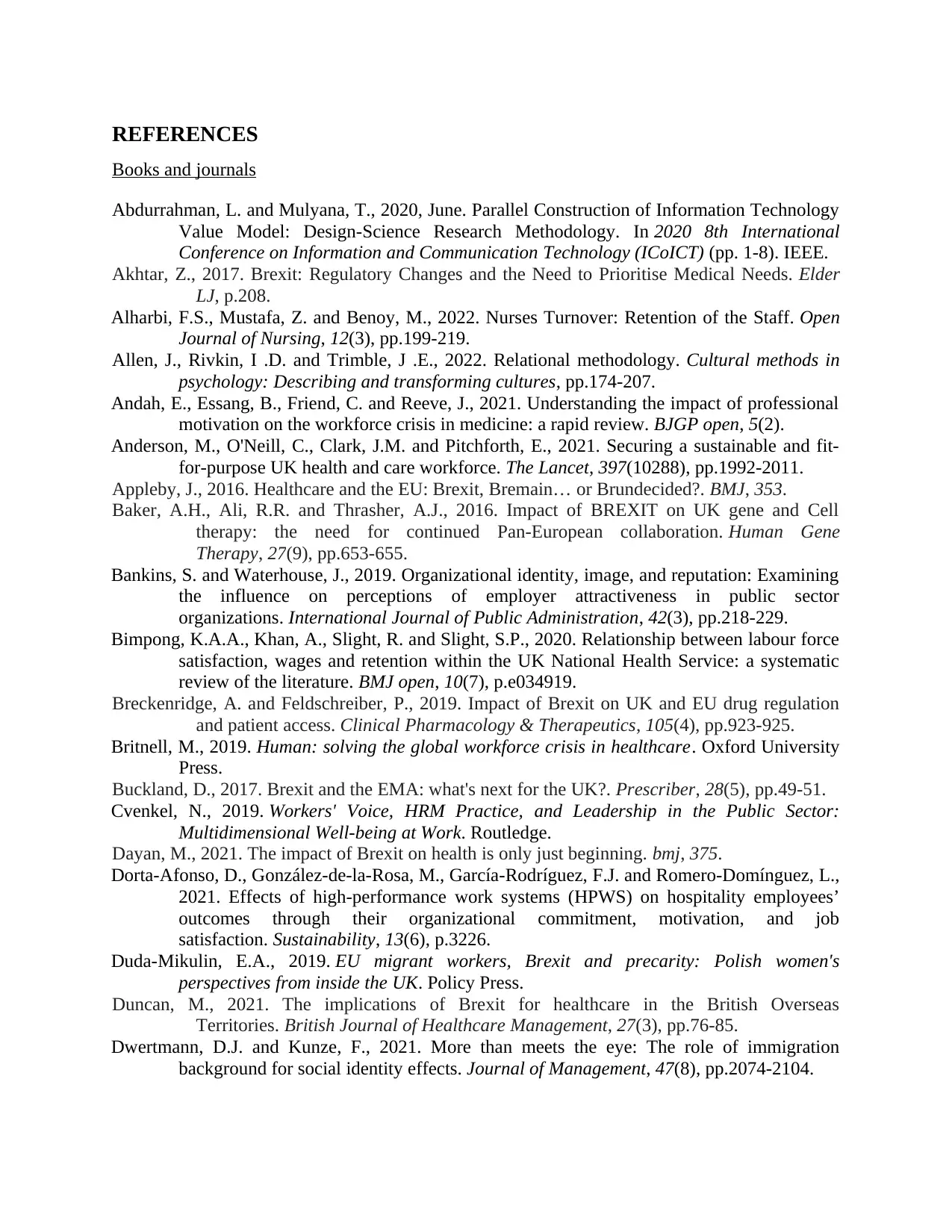
REFERENCES
Books and journals
Abdurrahman, L. and Mulyana, T., 2020, June. Parallel Construction of Information Technology
Value Model: Design-Science Research Methodology. In 2020 8th International
Conference on Information and Communication Technology (ICoICT) (pp. 1-8). IEEE.
Akhtar, Z., 2017. Brexit: Regulatory Changes and the Need to Prioritise Medical Needs. Elder
LJ, p.208.
Alharbi, F.S., Mustafa, Z. and Benoy, M., 2022. Nurses Turnover: Retention of the Staff. Open
Journal of Nursing, 12(3), pp.199-219.
Allen, J., Rivkin, I .D. and Trimble, J .E., 2022. Relational methodology. Cultural methods in
psychology: Describing and transforming cultures, pp.174-207.
Andah, E., Essang, B., Friend, C. and Reeve, J., 2021. Understanding the impact of professional
motivation on the workforce crisis in medicine: a rapid review. BJGP open, 5(2).
Anderson, M., O'Neill, C., Clark, J.M. and Pitchforth, E., 2021. Securing a sustainable and fit-
for-purpose UK health and care workforce. The Lancet, 397(10288), pp.1992-2011.
Appleby, J., 2016. Healthcare and the EU: Brexit, Bremain… or Brundecided?. BMJ, 353.
Baker, A.H., Ali, R.R. and Thrasher, A.J., 2016. Impact of BREXIT on UK gene and Cell
therapy: the need for continued Pan-European collaboration. Human Gene
Therapy, 27(9), pp.653-655.
Bankins, S. and Waterhouse, J., 2019. Organizational identity, image, and reputation: Examining
the influence on perceptions of employer attractiveness in public sector
organizations. International Journal of Public Administration, 42(3), pp.218-229.
Bimpong, K.A.A., Khan, A., Slight, R. and Slight, S.P., 2020. Relationship between labour force
satisfaction, wages and retention within the UK National Health Service: a systematic
review of the literature. BMJ open, 10(7), p.e034919.
Breckenridge, A. and Feldschreiber, P., 2019. Impact of Brexit on UK and EU drug regulation
and patient access. Clinical Pharmacology & Therapeutics, 105(4), pp.923-925.
Britnell, M., 2019. Human: solving the global workforce crisis in healthcare. Oxford University
Press.
Buckland, D., 2017. Brexit and the EMA: what's next for the UK?. Prescriber, 28(5), pp.49-51.
Cvenkel, N., 2019. Workers' Voice, HRM Practice, and Leadership in the Public Sector:
Multidimensional Well-being at Work. Routledge.
Dayan, M., 2021. The impact of Brexit on health is only just beginning. bmj, 375.
Dorta-Afonso, D., González-de-la-Rosa, M., García-Rodríguez, F.J. and Romero-Domínguez, L.,
2021. Effects of high-performance work systems (HPWS) on hospitality employees’
outcomes through their organizational commitment, motivation, and job
satisfaction. Sustainability, 13(6), p.3226.
Duda-Mikulin, E.A., 2019. EU migrant workers, Brexit and precarity: Polish women's
perspectives from inside the UK. Policy Press.
Duncan, M., 2021. The implications of Brexit for healthcare in the British Overseas
Territories. British Journal of Healthcare Management, 27(3), pp.76-85.
Dwertmann, D.J. and Kunze, F., 2021. More than meets the eye: The role of immigration
background for social identity effects. Journal of Management, 47(8), pp.2074-2104.
Books and journals
Abdurrahman, L. and Mulyana, T., 2020, June. Parallel Construction of Information Technology
Value Model: Design-Science Research Methodology. In 2020 8th International
Conference on Information and Communication Technology (ICoICT) (pp. 1-8). IEEE.
Akhtar, Z., 2017. Brexit: Regulatory Changes and the Need to Prioritise Medical Needs. Elder
LJ, p.208.
Alharbi, F.S., Mustafa, Z. and Benoy, M., 2022. Nurses Turnover: Retention of the Staff. Open
Journal of Nursing, 12(3), pp.199-219.
Allen, J., Rivkin, I .D. and Trimble, J .E., 2022. Relational methodology. Cultural methods in
psychology: Describing and transforming cultures, pp.174-207.
Andah, E., Essang, B., Friend, C. and Reeve, J., 2021. Understanding the impact of professional
motivation on the workforce crisis in medicine: a rapid review. BJGP open, 5(2).
Anderson, M., O'Neill, C., Clark, J.M. and Pitchforth, E., 2021. Securing a sustainable and fit-
for-purpose UK health and care workforce. The Lancet, 397(10288), pp.1992-2011.
Appleby, J., 2016. Healthcare and the EU: Brexit, Bremain… or Brundecided?. BMJ, 353.
Baker, A.H., Ali, R.R. and Thrasher, A.J., 2016. Impact of BREXIT on UK gene and Cell
therapy: the need for continued Pan-European collaboration. Human Gene
Therapy, 27(9), pp.653-655.
Bankins, S. and Waterhouse, J., 2019. Organizational identity, image, and reputation: Examining
the influence on perceptions of employer attractiveness in public sector
organizations. International Journal of Public Administration, 42(3), pp.218-229.
Bimpong, K.A.A., Khan, A., Slight, R. and Slight, S.P., 2020. Relationship between labour force
satisfaction, wages and retention within the UK National Health Service: a systematic
review of the literature. BMJ open, 10(7), p.e034919.
Breckenridge, A. and Feldschreiber, P., 2019. Impact of Brexit on UK and EU drug regulation
and patient access. Clinical Pharmacology & Therapeutics, 105(4), pp.923-925.
Britnell, M., 2019. Human: solving the global workforce crisis in healthcare. Oxford University
Press.
Buckland, D., 2017. Brexit and the EMA: what's next for the UK?. Prescriber, 28(5), pp.49-51.
Cvenkel, N., 2019. Workers' Voice, HRM Practice, and Leadership in the Public Sector:
Multidimensional Well-being at Work. Routledge.
Dayan, M., 2021. The impact of Brexit on health is only just beginning. bmj, 375.
Dorta-Afonso, D., González-de-la-Rosa, M., García-Rodríguez, F.J. and Romero-Domínguez, L.,
2021. Effects of high-performance work systems (HPWS) on hospitality employees’
outcomes through their organizational commitment, motivation, and job
satisfaction. Sustainability, 13(6), p.3226.
Duda-Mikulin, E.A., 2019. EU migrant workers, Brexit and precarity: Polish women's
perspectives from inside the UK. Policy Press.
Duncan, M., 2021. The implications of Brexit for healthcare in the British Overseas
Territories. British Journal of Healthcare Management, 27(3), pp.76-85.
Dwertmann, D.J. and Kunze, F., 2021. More than meets the eye: The role of immigration
background for social identity effects. Journal of Management, 47(8), pp.2074-2104.
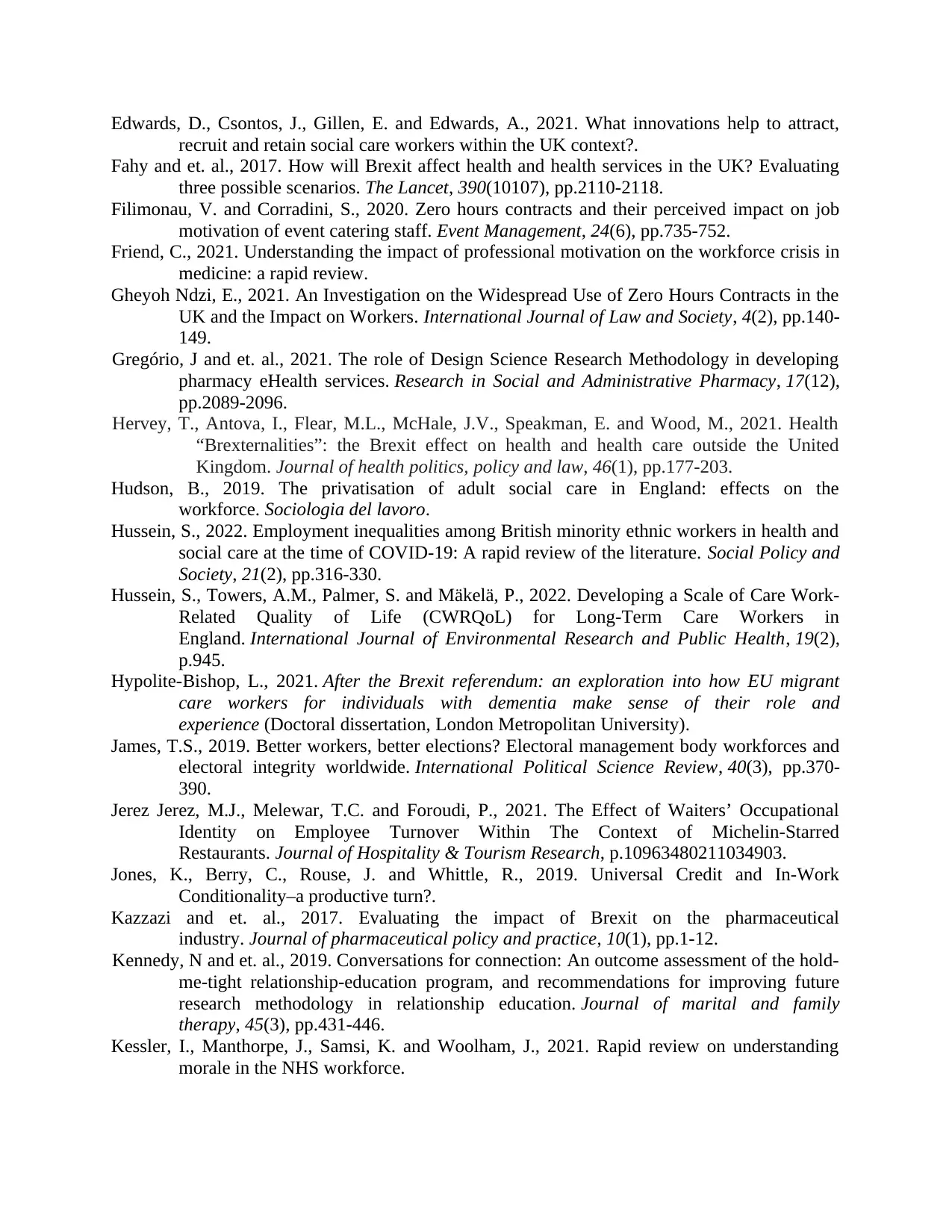
Edwards, D., Csontos, J., Gillen, E. and Edwards, A., 2021. What innovations help to attract,
recruit and retain social care workers within the UK context?.
Fahy and et. al., 2017. How will Brexit affect health and health services in the UK? Evaluating
three possible scenarios. The Lancet, 390(10107), pp.2110-2118.
Filimonau, V. and Corradini, S., 2020. Zero hours contracts and their perceived impact on job
motivation of event catering staff. Event Management, 24(6), pp.735-752.
Friend, C., 2021. Understanding the impact of professional motivation on the workforce crisis in
medicine: a rapid review.
Gheyoh Ndzi, E., 2021. An Investigation on the Widespread Use of Zero Hours Contracts in the
UK and the Impact on Workers. International Journal of Law and Society, 4(2), pp.140-
149.
Gregório, J and et. al., 2021. The role of Design Science Research Methodology in developing
pharmacy eHealth services. Research in Social and Administrative Pharmacy, 17(12),
pp.2089-2096.
Hervey, T., Antova, I., Flear, M.L., McHale, J.V., Speakman, E. and Wood, M., 2021. Health
“Brexternalities”: the Brexit effect on health and health care outside the United
Kingdom. Journal of health politics, policy and law, 46(1), pp.177-203.
Hudson, B., 2019. The privatisation of adult social care in England: effects on the
workforce. Sociologia del lavoro.
Hussein, S., 2022. Employment inequalities among British minority ethnic workers in health and
social care at the time of COVID-19: A rapid review of the literature. Social Policy and
Society, 21(2), pp.316-330.
Hussein, S., Towers, A.M., Palmer, S. and Mäkelä, P., 2022. Developing a Scale of Care Work-
Related Quality of Life (CWRQoL) for Long-Term Care Workers in
England. International Journal of Environmental Research and Public Health, 19(2),
p.945.
Hypolite-Bishop, L., 2021. After the Brexit referendum: an exploration into how EU migrant
care workers for individuals with dementia make sense of their role and
experience (Doctoral dissertation, London Metropolitan University).
James, T.S., 2019. Better workers, better elections? Electoral management body workforces and
electoral integrity worldwide. International Political Science Review, 40(3), pp.370-
390.
Jerez Jerez, M.J., Melewar, T.C. and Foroudi, P., 2021. The Effect of Waiters’ Occupational
Identity on Employee Turnover Within The Context of Michelin-Starred
Restaurants. Journal of Hospitality & Tourism Research, p.10963480211034903.
Jones, K., Berry, C., Rouse, J. and Whittle, R., 2019. Universal Credit and In-Work
Conditionality–a productive turn?.
Kazzazi and et. al., 2017. Evaluating the impact of Brexit on the pharmaceutical
industry. Journal of pharmaceutical policy and practice, 10(1), pp.1-12.
Kennedy, N and et. al., 2019. Conversations for connection: An outcome assessment of the hold‐
me‐tight relationship‐education program, and recommendations for improving future
research methodology in relationship education. Journal of marital and family
therapy, 45(3), pp.431-446.
Kessler, I., Manthorpe, J., Samsi, K. and Woolham, J., 2021. Rapid review on understanding
morale in the NHS workforce.
recruit and retain social care workers within the UK context?.
Fahy and et. al., 2017. How will Brexit affect health and health services in the UK? Evaluating
three possible scenarios. The Lancet, 390(10107), pp.2110-2118.
Filimonau, V. and Corradini, S., 2020. Zero hours contracts and their perceived impact on job
motivation of event catering staff. Event Management, 24(6), pp.735-752.
Friend, C., 2021. Understanding the impact of professional motivation on the workforce crisis in
medicine: a rapid review.
Gheyoh Ndzi, E., 2021. An Investigation on the Widespread Use of Zero Hours Contracts in the
UK and the Impact on Workers. International Journal of Law and Society, 4(2), pp.140-
149.
Gregório, J and et. al., 2021. The role of Design Science Research Methodology in developing
pharmacy eHealth services. Research in Social and Administrative Pharmacy, 17(12),
pp.2089-2096.
Hervey, T., Antova, I., Flear, M.L., McHale, J.V., Speakman, E. and Wood, M., 2021. Health
“Brexternalities”: the Brexit effect on health and health care outside the United
Kingdom. Journal of health politics, policy and law, 46(1), pp.177-203.
Hudson, B., 2019. The privatisation of adult social care in England: effects on the
workforce. Sociologia del lavoro.
Hussein, S., 2022. Employment inequalities among British minority ethnic workers in health and
social care at the time of COVID-19: A rapid review of the literature. Social Policy and
Society, 21(2), pp.316-330.
Hussein, S., Towers, A.M., Palmer, S. and Mäkelä, P., 2022. Developing a Scale of Care Work-
Related Quality of Life (CWRQoL) for Long-Term Care Workers in
England. International Journal of Environmental Research and Public Health, 19(2),
p.945.
Hypolite-Bishop, L., 2021. After the Brexit referendum: an exploration into how EU migrant
care workers for individuals with dementia make sense of their role and
experience (Doctoral dissertation, London Metropolitan University).
James, T.S., 2019. Better workers, better elections? Electoral management body workforces and
electoral integrity worldwide. International Political Science Review, 40(3), pp.370-
390.
Jerez Jerez, M.J., Melewar, T.C. and Foroudi, P., 2021. The Effect of Waiters’ Occupational
Identity on Employee Turnover Within The Context of Michelin-Starred
Restaurants. Journal of Hospitality & Tourism Research, p.10963480211034903.
Jones, K., Berry, C., Rouse, J. and Whittle, R., 2019. Universal Credit and In-Work
Conditionality–a productive turn?.
Kazzazi and et. al., 2017. Evaluating the impact of Brexit on the pharmaceutical
industry. Journal of pharmaceutical policy and practice, 10(1), pp.1-12.
Kennedy, N and et. al., 2019. Conversations for connection: An outcome assessment of the hold‐
me‐tight relationship‐education program, and recommendations for improving future
research methodology in relationship education. Journal of marital and family
therapy, 45(3), pp.431-446.
Kessler, I., Manthorpe, J., Samsi, K. and Woolham, J., 2021. Rapid review on understanding
morale in the NHS workforce.
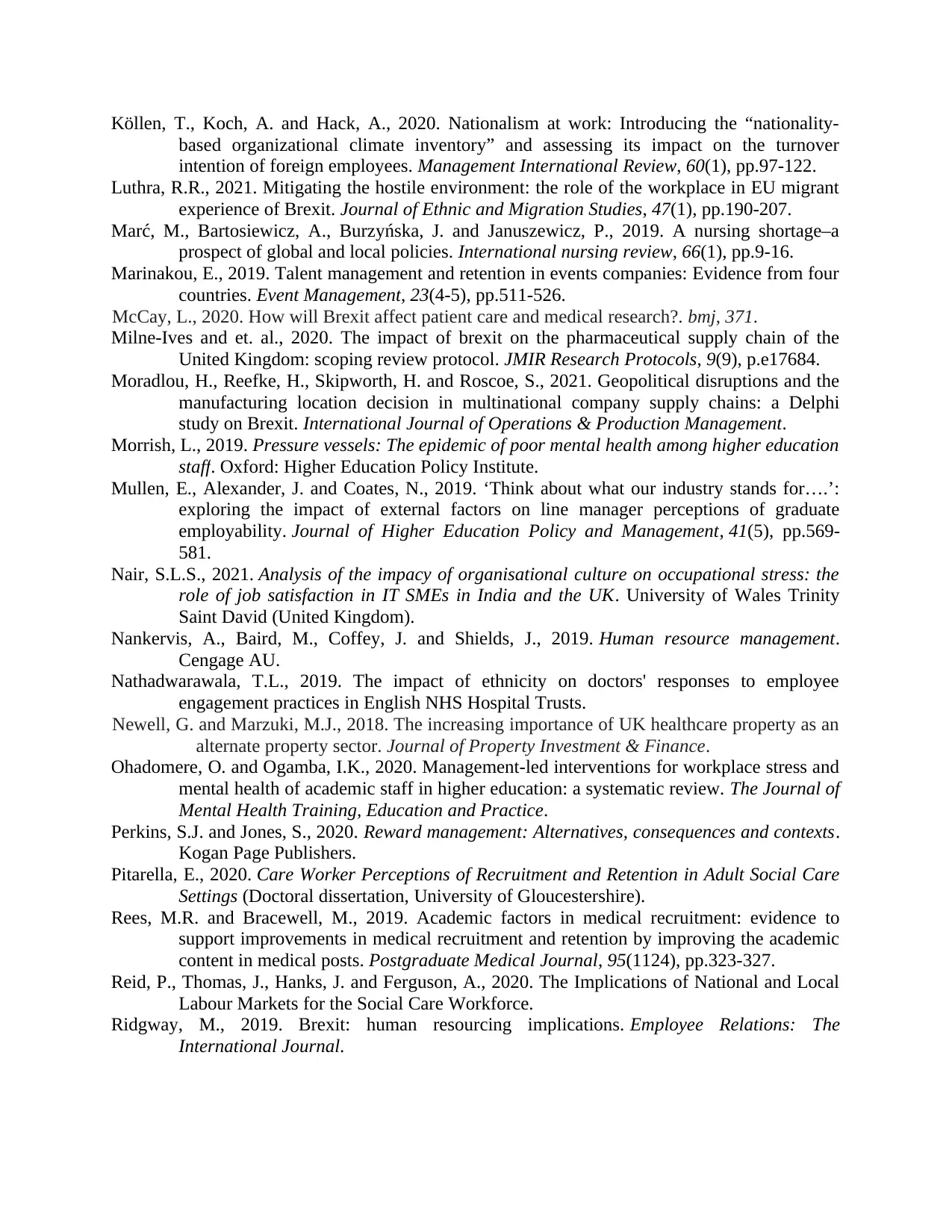
Köllen, T., Koch, A. and Hack, A., 2020. Nationalism at work: Introducing the “nationality-
based organizational climate inventory” and assessing its impact on the turnover
intention of foreign employees. Management International Review, 60(1), pp.97-122.
Luthra, R.R., 2021. Mitigating the hostile environment: the role of the workplace in EU migrant
experience of Brexit. Journal of Ethnic and Migration Studies, 47(1), pp.190-207.
Marć, M., Bartosiewicz, A., Burzyńska, J. and Januszewicz, P., 2019. A nursing shortage–a
prospect of global and local policies. International nursing review, 66(1), pp.9-16.
Marinakou, E., 2019. Talent management and retention in events companies: Evidence from four
countries. Event Management, 23(4-5), pp.511-526.
McCay, L., 2020. How will Brexit affect patient care and medical research?. bmj, 371.
Milne-Ives and et. al., 2020. The impact of brexit on the pharmaceutical supply chain of the
United Kingdom: scoping review protocol. JMIR Research Protocols, 9(9), p.e17684.
Moradlou, H., Reefke, H., Skipworth, H. and Roscoe, S., 2021. Geopolitical disruptions and the
manufacturing location decision in multinational company supply chains: a Delphi
study on Brexit. International Journal of Operations & Production Management.
Morrish, L., 2019. Pressure vessels: The epidemic of poor mental health among higher education
staff. Oxford: Higher Education Policy Institute.
Mullen, E., Alexander, J. and Coates, N., 2019. ‘Think about what our industry stands for….’:
exploring the impact of external factors on line manager perceptions of graduate
employability. Journal of Higher Education Policy and Management, 41(5), pp.569-
581.
Nair, S.L.S., 2021. Analysis of the impacy of organisational culture on occupational stress: the
role of job satisfaction in IT SMEs in India and the UK. University of Wales Trinity
Saint David (United Kingdom).
Nankervis, A., Baird, M., Coffey, J. and Shields, J., 2019. Human resource management.
Cengage AU.
Nathadwarawala, T.L., 2019. The impact of ethnicity on doctors' responses to employee
engagement practices in English NHS Hospital Trusts.
Newell, G. and Marzuki, M.J., 2018. The increasing importance of UK healthcare property as an
alternate property sector. Journal of Property Investment & Finance.
Ohadomere, O. and Ogamba, I.K., 2020. Management-led interventions for workplace stress and
mental health of academic staff in higher education: a systematic review. The Journal of
Mental Health Training, Education and Practice.
Perkins, S.J. and Jones, S., 2020. Reward management: Alternatives, consequences and contexts.
Kogan Page Publishers.
Pitarella, E., 2020. Care Worker Perceptions of Recruitment and Retention in Adult Social Care
Settings (Doctoral dissertation, University of Gloucestershire).
Rees, M.R. and Bracewell, M., 2019. Academic factors in medical recruitment: evidence to
support improvements in medical recruitment and retention by improving the academic
content in medical posts. Postgraduate Medical Journal, 95(1124), pp.323-327.
Reid, P., Thomas, J., Hanks, J. and Ferguson, A., 2020. The Implications of National and Local
Labour Markets for the Social Care Workforce.
Ridgway, M., 2019. Brexit: human resourcing implications. Employee Relations: The
International Journal.
based organizational climate inventory” and assessing its impact on the turnover
intention of foreign employees. Management International Review, 60(1), pp.97-122.
Luthra, R.R., 2021. Mitigating the hostile environment: the role of the workplace in EU migrant
experience of Brexit. Journal of Ethnic and Migration Studies, 47(1), pp.190-207.
Marć, M., Bartosiewicz, A., Burzyńska, J. and Januszewicz, P., 2019. A nursing shortage–a
prospect of global and local policies. International nursing review, 66(1), pp.9-16.
Marinakou, E., 2019. Talent management and retention in events companies: Evidence from four
countries. Event Management, 23(4-5), pp.511-526.
McCay, L., 2020. How will Brexit affect patient care and medical research?. bmj, 371.
Milne-Ives and et. al., 2020. The impact of brexit on the pharmaceutical supply chain of the
United Kingdom: scoping review protocol. JMIR Research Protocols, 9(9), p.e17684.
Moradlou, H., Reefke, H., Skipworth, H. and Roscoe, S., 2021. Geopolitical disruptions and the
manufacturing location decision in multinational company supply chains: a Delphi
study on Brexit. International Journal of Operations & Production Management.
Morrish, L., 2019. Pressure vessels: The epidemic of poor mental health among higher education
staff. Oxford: Higher Education Policy Institute.
Mullen, E., Alexander, J. and Coates, N., 2019. ‘Think about what our industry stands for….’:
exploring the impact of external factors on line manager perceptions of graduate
employability. Journal of Higher Education Policy and Management, 41(5), pp.569-
581.
Nair, S.L.S., 2021. Analysis of the impacy of organisational culture on occupational stress: the
role of job satisfaction in IT SMEs in India and the UK. University of Wales Trinity
Saint David (United Kingdom).
Nankervis, A., Baird, M., Coffey, J. and Shields, J., 2019. Human resource management.
Cengage AU.
Nathadwarawala, T.L., 2019. The impact of ethnicity on doctors' responses to employee
engagement practices in English NHS Hospital Trusts.
Newell, G. and Marzuki, M.J., 2018. The increasing importance of UK healthcare property as an
alternate property sector. Journal of Property Investment & Finance.
Ohadomere, O. and Ogamba, I.K., 2020. Management-led interventions for workplace stress and
mental health of academic staff in higher education: a systematic review. The Journal of
Mental Health Training, Education and Practice.
Perkins, S.J. and Jones, S., 2020. Reward management: Alternatives, consequences and contexts.
Kogan Page Publishers.
Pitarella, E., 2020. Care Worker Perceptions of Recruitment and Retention in Adult Social Care
Settings (Doctoral dissertation, University of Gloucestershire).
Rees, M.R. and Bracewell, M., 2019. Academic factors in medical recruitment: evidence to
support improvements in medical recruitment and retention by improving the academic
content in medical posts. Postgraduate Medical Journal, 95(1124), pp.323-327.
Reid, P., Thomas, J., Hanks, J. and Ferguson, A., 2020. The Implications of National and Local
Labour Markets for the Social Care Workforce.
Ridgway, M., 2019. Brexit: human resourcing implications. Employee Relations: The
International Journal.
Paraphrase This Document
Need a fresh take? Get an instant paraphrase of this document with our AI Paraphraser
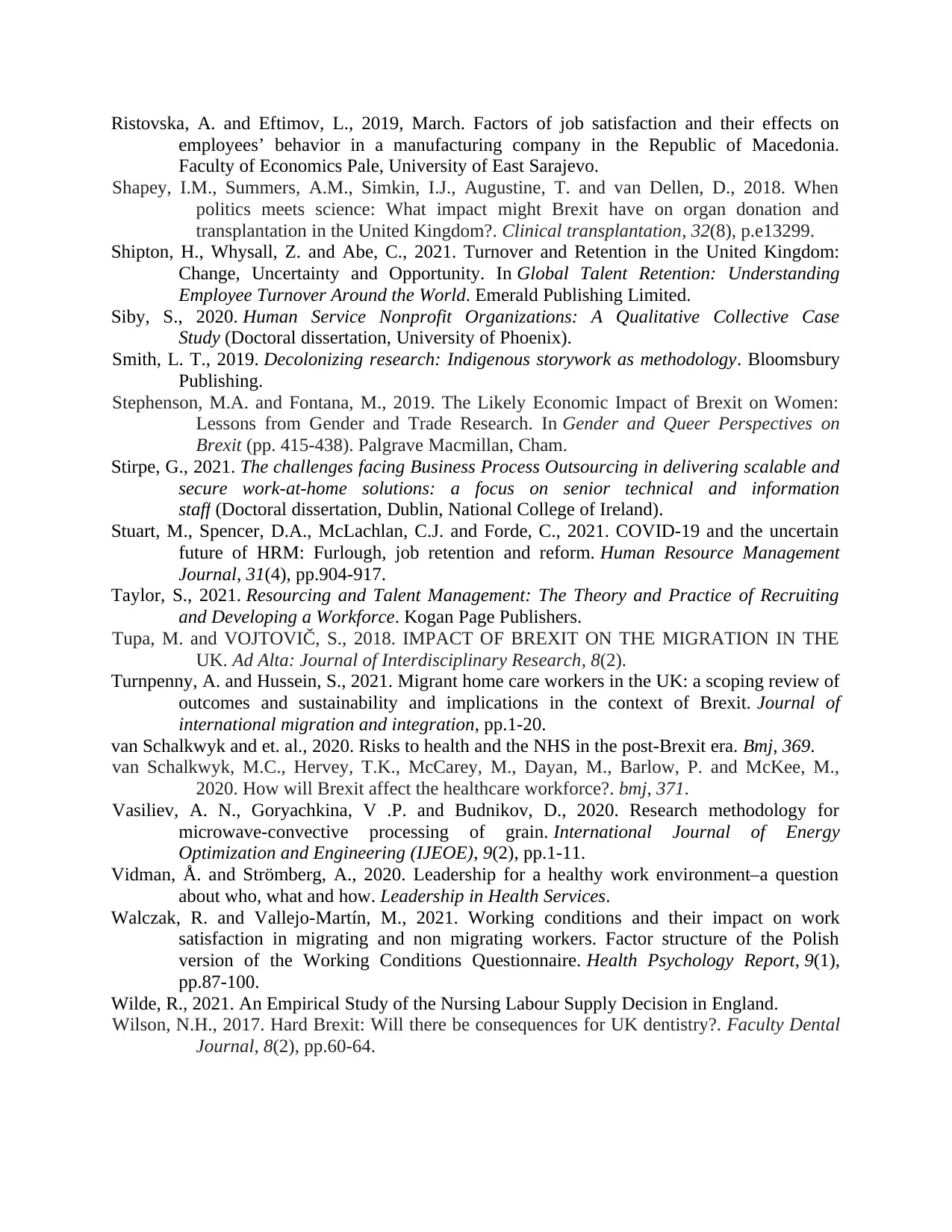
Ristovska, A. and Eftimov, L., 2019, March. Factors of job satisfaction and their effects on
employees’ behavior in a manufacturing company in the Republic of Macedonia.
Faculty of Economics Pale, University of East Sarajevo.
Shapey, I.M., Summers, A.M., Simkin, I.J., Augustine, T. and van Dellen, D., 2018. When
politics meets science: What impact might Brexit have on organ donation and
transplantation in the United Kingdom?. Clinical transplantation, 32(8), p.e13299.
Shipton, H., Whysall, Z. and Abe, C., 2021. Turnover and Retention in the United Kingdom:
Change, Uncertainty and Opportunity. In Global Talent Retention: Understanding
Employee Turnover Around the World. Emerald Publishing Limited.
Siby, S., 2020. Human Service Nonprofit Organizations: A Qualitative Collective Case
Study (Doctoral dissertation, University of Phoenix).
Smith, L. T., 2019. Decolonizing research: Indigenous storywork as methodology. Bloomsbury
Publishing.
Stephenson, M.A. and Fontana, M., 2019. The Likely Economic Impact of Brexit on Women:
Lessons from Gender and Trade Research. In Gender and Queer Perspectives on
Brexit (pp. 415-438). Palgrave Macmillan, Cham.
Stirpe, G., 2021. The challenges facing Business Process Outsourcing in delivering scalable and
secure work-at-home solutions: a focus on senior technical and information
staff (Doctoral dissertation, Dublin, National College of Ireland).
Stuart, M., Spencer, D.A., McLachlan, C.J. and Forde, C., 2021. COVID‐19 and the uncertain
future of HRM: Furlough, job retention and reform. Human Resource Management
Journal, 31(4), pp.904-917.
Taylor, S., 2021. Resourcing and Talent Management: The Theory and Practice of Recruiting
and Developing a Workforce. Kogan Page Publishers.
Tupa, M. and VOJTOVIČ, S., 2018. IMPACT OF BREXIT ON THE MIGRATION IN THE
UK. Ad Alta: Journal of Interdisciplinary Research, 8(2).
Turnpenny, A. and Hussein, S., 2021. Migrant home care workers in the UK: a scoping review of
outcomes and sustainability and implications in the context of Brexit. Journal of
international migration and integration, pp.1-20.
van Schalkwyk and et. al., 2020. Risks to health and the NHS in the post-Brexit era. Bmj, 369.
van Schalkwyk, M.C., Hervey, T.K., McCarey, M., Dayan, M., Barlow, P. and McKee, M.,
2020. How will Brexit affect the healthcare workforce?. bmj, 371.
Vasiliev, A. N., Goryachkina, V .P. and Budnikov, D., 2020. Research methodology for
microwave-convective processing of grain. International Journal of Energy
Optimization and Engineering (IJEOE), 9(2), pp.1-11.
Vidman, Å. and Strömberg, A., 2020. Leadership for a healthy work environment–a question
about who, what and how. Leadership in Health Services.
Walczak, R. and Vallejo-Martín, M., 2021. Working conditions and their impact on work
satisfaction in migrating and non migrating workers. Factor structure of the Polish
version of the Working Conditions Questionnaire. Health Psychology Report, 9(1),
pp.87-100.
Wilde, R., 2021. An Empirical Study of the Nursing Labour Supply Decision in England.
Wilson, N.H., 2017. Hard Brexit: Will there be consequences for UK dentistry?. Faculty Dental
Journal, 8(2), pp.60-64.
employees’ behavior in a manufacturing company in the Republic of Macedonia.
Faculty of Economics Pale, University of East Sarajevo.
Shapey, I.M., Summers, A.M., Simkin, I.J., Augustine, T. and van Dellen, D., 2018. When
politics meets science: What impact might Brexit have on organ donation and
transplantation in the United Kingdom?. Clinical transplantation, 32(8), p.e13299.
Shipton, H., Whysall, Z. and Abe, C., 2021. Turnover and Retention in the United Kingdom:
Change, Uncertainty and Opportunity. In Global Talent Retention: Understanding
Employee Turnover Around the World. Emerald Publishing Limited.
Siby, S., 2020. Human Service Nonprofit Organizations: A Qualitative Collective Case
Study (Doctoral dissertation, University of Phoenix).
Smith, L. T., 2019. Decolonizing research: Indigenous storywork as methodology. Bloomsbury
Publishing.
Stephenson, M.A. and Fontana, M., 2019. The Likely Economic Impact of Brexit on Women:
Lessons from Gender and Trade Research. In Gender and Queer Perspectives on
Brexit (pp. 415-438). Palgrave Macmillan, Cham.
Stirpe, G., 2021. The challenges facing Business Process Outsourcing in delivering scalable and
secure work-at-home solutions: a focus on senior technical and information
staff (Doctoral dissertation, Dublin, National College of Ireland).
Stuart, M., Spencer, D.A., McLachlan, C.J. and Forde, C., 2021. COVID‐19 and the uncertain
future of HRM: Furlough, job retention and reform. Human Resource Management
Journal, 31(4), pp.904-917.
Taylor, S., 2021. Resourcing and Talent Management: The Theory and Practice of Recruiting
and Developing a Workforce. Kogan Page Publishers.
Tupa, M. and VOJTOVIČ, S., 2018. IMPACT OF BREXIT ON THE MIGRATION IN THE
UK. Ad Alta: Journal of Interdisciplinary Research, 8(2).
Turnpenny, A. and Hussein, S., 2021. Migrant home care workers in the UK: a scoping review of
outcomes and sustainability and implications in the context of Brexit. Journal of
international migration and integration, pp.1-20.
van Schalkwyk and et. al., 2020. Risks to health and the NHS in the post-Brexit era. Bmj, 369.
van Schalkwyk, M.C., Hervey, T.K., McCarey, M., Dayan, M., Barlow, P. and McKee, M.,
2020. How will Brexit affect the healthcare workforce?. bmj, 371.
Vasiliev, A. N., Goryachkina, V .P. and Budnikov, D., 2020. Research methodology for
microwave-convective processing of grain. International Journal of Energy
Optimization and Engineering (IJEOE), 9(2), pp.1-11.
Vidman, Å. and Strömberg, A., 2020. Leadership for a healthy work environment–a question
about who, what and how. Leadership in Health Services.
Walczak, R. and Vallejo-Martín, M., 2021. Working conditions and their impact on work
satisfaction in migrating and non migrating workers. Factor structure of the Polish
version of the Working Conditions Questionnaire. Health Psychology Report, 9(1),
pp.87-100.
Wilde, R., 2021. An Empirical Study of the Nursing Labour Supply Decision in England.
Wilson, N.H., 2017. Hard Brexit: Will there be consequences for UK dentistry?. Faculty Dental
Journal, 8(2), pp.60-64.

Wright, C.F. and Constantin, A., 2021. Why recruit temporary sponsored skilled migrants? A
human capital theory analysis of employer motivations in Australia. Australian Journal
of Management, 46(1), pp.151-173.
Zhang, Y., Wei, F. and Grey, I., 2021. SIEs motivational CQ on job satisfaction: A two-study
examination of power distance and role clarity. International Journal of Intercultural
Relations, 80, pp.158-169.
human capital theory analysis of employer motivations in Australia. Australian Journal
of Management, 46(1), pp.151-173.
Zhang, Y., Wei, F. and Grey, I., 2021. SIEs motivational CQ on job satisfaction: A two-study
examination of power distance and role clarity. International Journal of Intercultural
Relations, 80, pp.158-169.
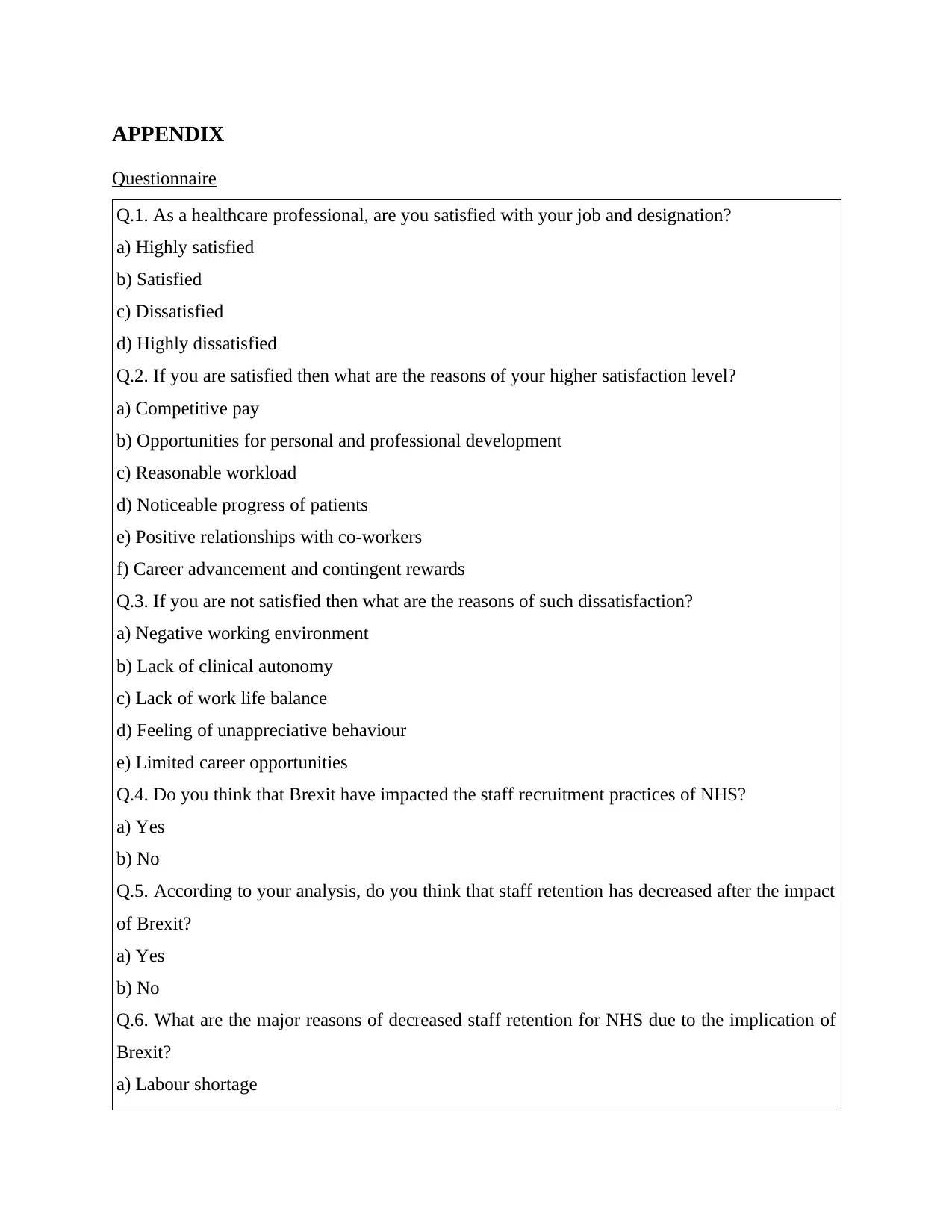
APPENDIX
Questionnaire
Q.1. As a healthcare professional, are you satisfied with your job and designation?
a) Highly satisfied
b) Satisfied
c) Dissatisfied
d) Highly dissatisfied
Q.2. If you are satisfied then what are the reasons of your higher satisfaction level?
a) Competitive pay
b) Opportunities for personal and professional development
c) Reasonable workload
d) Noticeable progress of patients
e) Positive relationships with co-workers
f) Career advancement and contingent rewards
Q.3. If you are not satisfied then what are the reasons of such dissatisfaction?
a) Negative working environment
b) Lack of clinical autonomy
c) Lack of work life balance
d) Feeling of unappreciative behaviour
e) Limited career opportunities
Q.4. Do you think that Brexit have impacted the staff recruitment practices of NHS?
a) Yes
b) No
Q.5. According to your analysis, do you think that staff retention has decreased after the impact
of Brexit?
a) Yes
b) No
Q.6. What are the major reasons of decreased staff retention for NHS due to the implication of
Brexit?
a) Labour shortage
Questionnaire
Q.1. As a healthcare professional, are you satisfied with your job and designation?
a) Highly satisfied
b) Satisfied
c) Dissatisfied
d) Highly dissatisfied
Q.2. If you are satisfied then what are the reasons of your higher satisfaction level?
a) Competitive pay
b) Opportunities for personal and professional development
c) Reasonable workload
d) Noticeable progress of patients
e) Positive relationships with co-workers
f) Career advancement and contingent rewards
Q.3. If you are not satisfied then what are the reasons of such dissatisfaction?
a) Negative working environment
b) Lack of clinical autonomy
c) Lack of work life balance
d) Feeling of unappreciative behaviour
e) Limited career opportunities
Q.4. Do you think that Brexit have impacted the staff recruitment practices of NHS?
a) Yes
b) No
Q.5. According to your analysis, do you think that staff retention has decreased after the impact
of Brexit?
a) Yes
b) No
Q.6. What are the major reasons of decreased staff retention for NHS due to the implication of
Brexit?
a) Labour shortage
Secure Best Marks with AI Grader
Need help grading? Try our AI Grader for instant feedback on your assignments.
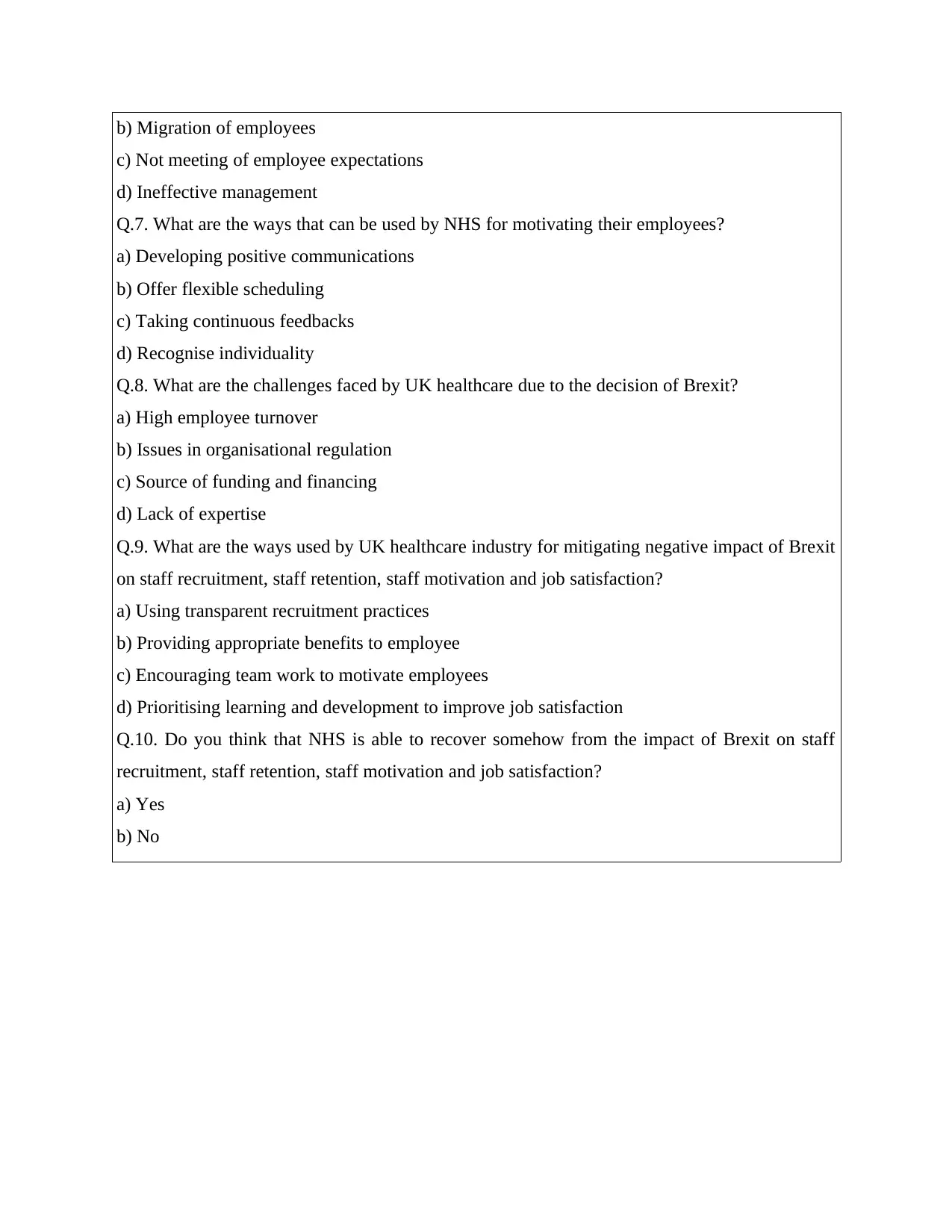
b) Migration of employees
c) Not meeting of employee expectations
d) Ineffective management
Q.7. What are the ways that can be used by NHS for motivating their employees?
a) Developing positive communications
b) Offer flexible scheduling
c) Taking continuous feedbacks
d) Recognise individuality
Q.8. What are the challenges faced by UK healthcare due to the decision of Brexit?
a) High employee turnover
b) Issues in organisational regulation
c) Source of funding and financing
d) Lack of expertise
Q.9. What are the ways used by UK healthcare industry for mitigating negative impact of Brexit
on staff recruitment, staff retention, staff motivation and job satisfaction?
a) Using transparent recruitment practices
b) Providing appropriate benefits to employee
c) Encouraging team work to motivate employees
d) Prioritising learning and development to improve job satisfaction
Q.10. Do you think that NHS is able to recover somehow from the impact of Brexit on staff
recruitment, staff retention, staff motivation and job satisfaction?
a) Yes
b) No
c) Not meeting of employee expectations
d) Ineffective management
Q.7. What are the ways that can be used by NHS for motivating their employees?
a) Developing positive communications
b) Offer flexible scheduling
c) Taking continuous feedbacks
d) Recognise individuality
Q.8. What are the challenges faced by UK healthcare due to the decision of Brexit?
a) High employee turnover
b) Issues in organisational regulation
c) Source of funding and financing
d) Lack of expertise
Q.9. What are the ways used by UK healthcare industry for mitigating negative impact of Brexit
on staff recruitment, staff retention, staff motivation and job satisfaction?
a) Using transparent recruitment practices
b) Providing appropriate benefits to employee
c) Encouraging team work to motivate employees
d) Prioritising learning and development to improve job satisfaction
Q.10. Do you think that NHS is able to recover somehow from the impact of Brexit on staff
recruitment, staff retention, staff motivation and job satisfaction?
a) Yes
b) No
1 out of 53
Related Documents
Your All-in-One AI-Powered Toolkit for Academic Success.
+13062052269
info@desklib.com
Available 24*7 on WhatsApp / Email
![[object Object]](/_next/static/media/star-bottom.7253800d.svg)
Unlock your academic potential
© 2024 | Zucol Services PVT LTD | All rights reserved.





